














Georgina Schoff KC
This year, the Bar Council has had an extremely busy agenda. In addition to its usual membership, educational, policy and law reform work, and the myriad of events we have hosted or participated in, we have undertaken and completed a number of key projects that we hope will strengthen and grow the Bar in years to come. There have been many highlights and some significant achievements.
In response to growing concerns that the Bar exam was operating as an unnecessary barrier to entry and preventing many worthy candidates from joining the Bar, the previous Bar Council established the 5-Year Exam Review Panel, chaired by the Honourable Peter Riordan KC. This year, the 5-Year Exam Review Panel provided Bar Council with very clear advice, including 17 recommendations and four suggestions for substantial revisions to the Bar exam and Readers’ Course. Bar Council heeded that advice and, with the assistance of the Readers’ Course Committee (RCC) and newly established Exam Committee, we have acted on each of the recommendations.
Henceforth, the Bar exam will be held twice a year and comprise three papers designed to ensure candidates have a foundational understanding of ethics, evidence and procedure. This new exam format will be implemented at the October 2024 Bar exam held at Moonee Valley Racecourse. Candidates will be required to pass all three papers to gain admission to the Readers’ Course with the option of choosing
to sit either a civil or criminal procedure paper on the same or different occasions. The number of places in the Readers’ Course has been increased to a maximum of 60 and the course will be of a shorter duration of six weeks (instead of eight) to enable us to run a third course, if necessary, in any year. These changes have required an extensive reworking of the Readers’ Course, together with significant changes to the Application and Reading Rules. Two new Chief-Examiners have been engaged and the Exam Committee has had to start from scratch to design and approve the new exam papers. Needless to say, this has involved many hours of work from volunteers.
On behalf of the Bar Council, I extend my gratitude to all those who have worked so hard and provided such wise counsel to Bar Council, particularly the Honourable Peter Riordan KC, Anthony Strahan KC and Ben Ihle KC (respectively the Chair and Deputy Chair of the RCC) and Chris Archibald KC and the Honourable Justice Kristen Walker (respectively the Chair and Judicial member of the Exam Committee).
The Bar trained and welcomed 42 new readers in September 2023 and 48 new readers in March 2024. They are an impressive cohort who will add to the Bar’s increasingly diverse cultural make-up, with readers born around the world, including China, France, Malaysia, Sri Lanka, Papua New Guinea and the United Kingdom. The Readers’ Course is a huge undertaking that relies heavily on members who give their time and experience and to whom we all owe an immense debt of gratitude.

On 4 June 2024, the Bar Council approved a new Strategic Plan 2024-2028 to guide our decisionmaking over the next four years. This is a key part of the Bar’s governance framework. Again, the work of Bar Council was made easy by the carefully considered Report of the Strategic Plan Working Group, chaired by Philip Crutchfield KC. The working group consulted widely with members, committees and associations, clerks, the judiciary, the Regulator, solicitors, including the VGSO, and other interested stakeholders to better understand what our immediate and long-term objectives should be.
The new Strategic Plan identifies collegiality as key to our future as a strong and independent Bar. Of course, this will not strike anyone as novel, but sometimes I think we need to be reminded of it. The Bar is of course made up of people with diverse backgrounds, opinions and experiences, and another one of the Strategic Plan’s objectives is that the diversity of the Bar will reflect the community it serves. While we
celebrate our differences, it is our shared professional standards, common values of decency, respect and dedication to professional excellence that will always bind us as a college.
I am pleased to report that this year we have continued and strengthened our focus on the health and wellbeing of our members. Practice at the Bar is demanding and often highly stressful. Almost a third of Victoria’s practising counsel (650 barristers) completed the State of the Bar Survey in October 2023 and while the results suggested that overall, our members are coping well and find their work rewarding, it did highlight the need for further work.
Driven in large part by our Health and Wellbeing Committee, we have introduced several pioneering initiatives including the short film Bar None, which starkly brings to life the challenges faced by some in the profession, and a dedicated online portal offering professional and personal support to barristers and
their families. These initiatives have focused on the nexus between health and wellbeing and the demanding nature of our jobs and how we all must navigate the intricate balance between our professional obligations and personal lives. The 2024 Winter issue of the Victorian Bar News adopted as its theme wellbeing and the importance of striking the right balance and was extremely well received by members (and the wider profession, many of whom have remarked upon it).
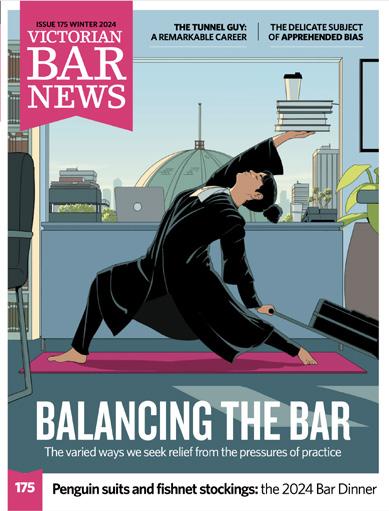
I extend my congratulations to the Victorian Bar News Committee, Editors, Bar Office team, including Sharni Doherty and Yola Beaini, Guy Shield and Peter Barrett for yet another impressive issue.
The State of the Bar Survey revealed other positive trends, such as a welcome reduction in the gender pay gap, a notable increase in the representation of women at the Bar and a marked decline in incidents of discrimination and harassment, and bullying. Perhaps this is due to the Bar’s robust policies or the work we have done to encourage all our members to proactively ensure the Bar is a community in which we can all thrive. Whatever the reason, we should all be very pleased with the result.
Looking to the future, the Bar is determined to increase support to alleviate the stress of our members, including offering free 24-hour counselling services. We also plan to appoint a full-time organisational psychologist, funded by the Victorian Legal Services Board, and will further develop the online portal with information that supports barristers to navigate work and life challenges.
As at 30 June 2024, after several years of planning and development, the digital transformation of the Victorian Bar website and administration systems is close to completion. This complete overhaul of the Bar’s digital systems – the largest technological infrastructure update in the Bar’s history – is designed to improve efficiencies and enhance the overall member experience by integrating several websites, such as the CPD In Session, Mediation Centre, Pro Bono and VCAS websites, onto a single platform. The new booking system for the Mediation Centre, which was launched in March 2024, shows availability of mediation facilities in real time and
allows clients to manage their bookings online. Members have already reported increased useability and a streamlined process.
Other new features of the website will include a user-friendly member dashboard called MyBar, an ethics hub, practice support information, Bar Association sections and a History of the Bar timeline.
Like all projects of this magnitude, there are many people working to make it happen. First and foremost, I would like to acknowledge the exceptional contribution of Michael Shand AM KC as Chair of the IT Project Steering Group. Michael has been instrumental throughout the project, from overseeing the project specifications and scoping documentation to writing much of its content. He is also the driving force behind the new ethics hub and practice support pages and has played a pivotal role in reviewing the areas of practice, which have been updated to align with the Australian Bar Association’s two-tiered structure.
I would also like to acknowledge IT Project Manager Paul Francis and the Bar Office team, who have contributed countless hours to deliver the project.
This will be a complete transformation of the Bar’s website and administration systems, and the migration of data from multiple platforms into a single system is a substantial undertaking, but one that is necessary to ensure we can continue to support our members now and into the future.
The Victorian Bar has been active in legal policy and law reform at both a state and national level, with 43 submissions provided during 2023-2024.
These included submissions in respect of the Bail Amendment Bill 2023, the Crimes Amendment (Strengthening Criminal Justice Response to Sexual Violence) Bill 2024 and the development of a new Aged Care Act, all of which proposed amendments to the law in response to issues of significant public interest.
The Bar continues to have a broad policy focus and is engaging with policymakers and other relevant stakeholders in respect of many issues including:
» Youth justice (and ongoing discussions about the appropriate age of criminal responsibility)
» Proposed misinformation and disinformation laws and their potential impacts on free speech
» Legislative responses to the Royal Commission into the Management of Police Informants, including the potential introduction of a mandatory reporting
requirement for Victorian lawyers to report the suspected misconduct of other lawyers
» The Commonwealth’s expansion of the Anti-Money Laundering and Counter Terrorism Financing (AML/CTF) regime to more broadly encompass the activities of legal professionals.
Events again played a major role in the life of the Victorian Bar throughout 2023-2024 with another full calendar.
Our Annual Bar Dinner in May 2024, hosted at the National Gallery of Victoria, on a Saturday evening for the first time since 2011 and with 508 guests, was an outstanding success. The Honourable Justice Robert Beech-Jones delivered a truly captivating keynote speech. Our honoured guests for the evening included Commonwealth Attorney-General, the Honourable Mark Dreyfus KC MP; Attorney-General for the State of Victoria, the Honourable Jaclyn Symes MP; and the Honourable Michael O’Brien MP, Shadow AttorneyGeneral. Several members of 45 years’ standing were also celebrated, as well as our March readers’ cohort.
This year the Peter O’Callaghan QC Gallery unveiled a number of remarkable portraits, including of the late Nimal Wikramanayake KC, Peter Jopling AM KC, the Honourable John Middleton AM KC, Barbara Hocking OAM and the Honourable Linda Dessau AC CVO.
The Gallery also commissioned Changing Faces of the Bar (Part 2), a video installation by photographer Garth Oriander. The Honourable Chief Justice Deborah Mortimer of the Federal Court of Australia will launch the exhibition on October 29.
Changing Faces of the Bar began in 2018 as an Art and Collections Committee project to photograph members as they went about their day-to-day lives as barristers. In 2024, the Gallery commissioned Garth Oriander to convert the 2018 exhibition into a dynamic video reel and to update it with photo-portraits of today’s members. The video installation is now on permanent display in the Gallery.
In February 2024, the Indigenous Justice Committee delivered its Annual Clerkship Program. This exceptional program, which joins indigenous law clerks with barristers and provides work experience in the Federal, Supreme and County Courts, is in its 17th year and has hosted about 60 clerks, making it one of the Bar’s most successful programs – and the only program of its kind in Australia. We all hope that some of those clerks will one day sign our Bar Roll.
We acknowledged the appointments of several Victorian Bar members between 1 July 2023 and 30 June 2024.
Raelene Sharp KC was appointed as the Commonwealth Director of Public Prosecutions, her Honour Felicity Hampel AM SC was appointed Chair of Victoria’s Post Sentence Authority and Alistair Pound SC was appointed as SolicitorGeneral of Victoria. The Honourable Justice Mordecai Bromberg was appointed as President of the Australian Law Reform Commission.
The Honourable Justice Christopher Horan, the Honourable Justice Penelope Neskovcin and the Honourable Justice Craig Dowling were all appointed to the Federal Court of Australia.
Her Honour Judge Simone Bingham was appointed to the Federal Circuit and Family Court of Australia.
Members appointed to the Supreme Court of Victoria include the Honourable Justice Ian Waller, the Honourable Justice Andrew Watson, the Honourable Justice Paul Cosgrave and the Honourable Justice Claire Harris. The Honourable Justice Christopher Boyce was appointed to the Supreme Court of Appeal. The Honourable Associate Justice Catherine Gobbo was appointed as an Associate Judge of the Supreme Court.
Her Honour Judge Suzanne Kirton, her Honour Judge Liberty Sanger, his Honour Judge Andrew Palmer and his Honour Judge Michael Wise were all appointed to the County Court of Victoria.
Members appointed to the Magistrates’ Court included her Honour Magistrate Allison Vaughan, his Honour Magistrate Michael Gurvich, his Honour Magistrate Andrew Waters, his Honour Magistrate Timothy Schocker and her Honour Magistrate Louise Wildberger.
In October 2023, the Honourable Chief Justice Anne Ferguson announced the appointment of 25 new Senior Counsel in and for the State of Victoria. On behalf of the Bar Council, I would like to express our sincere appreciation to the Chief Justice for her considered evaluation of the Senior Counsel candidates.
The Bar Council determined there would again be no change to subscription fees for the 2024-2025 financial year from those levied for 2023-2024. The Bar continues to support barristers experiencing financial difficulty through the Barristers’ Benevolent Fund. Furthermore, the Bar Council resolved to engage William Buck, a leading accountant and advisory firm, to provide counselling and advisory services to members facing significant financial hardship.
In June 2024, Barristers’ Chambers Limited (BCL) completed the purchase of 200 Queen Street, Melbourne, a critically important investment for the future of the Bar and the BCL model. BCL was a long-standing tenant of the building with its leases all set to expire in 2027. Furthermore, the financial modelling revealed it was cheaper to buy

the building entirely than to continue to lease. There will be future discussions about the building’s use, and I look forward to seeing how this significant investment will support us to achieve our strategic objectives which the BCL model largely underpins.
We held town hall meetings in 2024 on issues important to our members: Changes to the Bar exam and Readers’ Course on February 12 and the new Strategic Plan on May 8. These are important gatherings as they give members and other stakeholders an opportunity to hear information firsthand, ask questions and provide feedback to inform future decisions. We are grateful for everyone’s participation and input.
While the work of the Bar Council has felt a little relentless at times, I have no doubt the decisions we have made – and the work we have continued from the previous Bar Council –will ensure our members thrive.
None of this would be possible without the guidance of dedicated working groups who have consulted extensively and provided considered and practical advice to the Bar Council. One of the best things about being President is the opportunity to see how this wonderful institution works on behalf of its members and within the wider legal sector. There are so many moving parts, overseen by a conscientious
Bar Council and driven by an efficient Bar Office under the stewardship of Executive Director Amanda Utt.
There is also the tireless voluntary work of our members who contribute to so many committees, associations, education programs and other Bar activities. I have nothing but admiration and respect for you all.
I would like to acknowledge the support I have received from the Executive of the Bar Council throughout the year: Vice-Presidents Elizabeth Bennett SC and Colin Mandy SC, Honorary Treasurer Sarah Keating and Assistant Honorary Treasurer Raini Zambelli. They have been of enormous support to me, and I have appreciated their wisdom, honesty and humour.
My heartfelt thanks also to the Victorian Bar Office team, who work tirelessly behind the scenes to keep the wheels turning for our 2,200-plus members, with minimum fuss. Everything you see or read, every idea that comes to fruition, every event is due in large part to them. They are exceptional. I would particularly like to thank Executive Director Amanda Utt, Corporate Services Manager Miranda Tulloch, Senior In-House Counsel Kai Li Zhu and Senior Executive Assistant Sharni Doherty, who helped keep me on top of my many duties.
Thank you, it has been an honour.
Georgina Schoff KC President
297
Education and Events
176 Readers’ sessions conducted
264 Readers’ exam candidates
Speeches and Notices
36 Speeches (inc. appointments, welcomes, farewells)
22 Obituaries
27
Other (EOIs)
88 Readers assessed
80 CPDs delivered
12 ICC applications processed
16 Education courses
54 ICC renewals
62 Other events

Category A: Eleven counsel who are King’s Counsel, Senior Counsel or junior counsel of not less than fifteen years’ standing
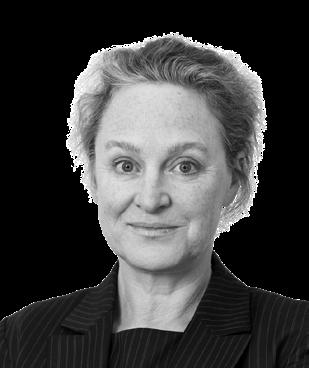










Category B: Six counsel who are not of King’s Counsel or Senior Counsel and are of not more than fifteen nor less than six years’ standing






Category C: Four counsel who are not of King’s Counsel or Senior Counsel and are of less than six years’ standing







Ten Meetings of the Victorian Bar Council were held between 10/11/22 (being the date of the first meeting of the 2022/2023 Bar Council) and 30/06/2023, including six Special Purpose Bar Council Meetings.
Council Member
Category A: King’s Counsel, Senior Counsel or junior counsel who are of not
14 Meetings of the Victorian Bar Council were held between 09/11/2023 (being the date of the first meeting of the 2023/2024 Bar Council) and 30/06/2024, including 5 Special Purpose Bar Council Meetings.


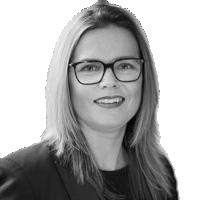






















Commitee as at 30 June 2024: Teresa Porritt (President), Jordana Cohen (Vice-President), Christine Pollard (Honorary Treasurer), Michelle Jenkins (Secretary), Kaye McNaught, Anna McDonald, Adrian Kennedy, Kate Stowell, Raymond Elishapour and Iman Osman.
Last year’s annual report anticipated the implementation of the CMS Portal, a new electronic filing system for the Children’s Court, in October 2023. The rollout occurred as planned and included on-site training and education for users to access. Although there have been some issues adjusting to the new system, the CCBA has welcomed the opportunity to provide feedback about these matters to the Court, which has been attempting to address and rectify the identified problems. This area remains a continuing piece of work for the CCBA.
Following on from the success of last year’s inaugural one-day CPD conference for members, the CCBA extended the length of this year’s conference to two full days at the end of July. The conference has been advertised widely to people at and outside the Bar, including regional solicitor firms, Victorian Legal Aid (VLA) solicitors, Department of Families, Fairness and Housing (DFFH) solicitors and community legal centres. It will be an opportunity to showcase the work of the CCBA and issues pertinent to the Children’s Court to a broader audience. Preliminary registration numbers are already very positive. We thank the CPD sub-committee, particularly the efforts of Anna McDonald, in putting together what promises to be a very interesting and educational festival of learning.
The CCBA Committee has otherwise continued to meet regularly to discuss issues and concerns raised by members and to follow up these matters with relevant stakeholders. This has included meeting with the DFFH and VLA, as required, to discuss these concerns. The CCBA has continued to provide a point of contact for members who wish to discuss legal dilemmas and practice issues. The CCBA this year has also resolved to organise and facilitate more social events for members to promote their wellbeing and connections, and to create networking opportunities with solicitors.
Committee as at 30 June 2024: Megan Cameron (President), Ray Ternes (Treasurer), Viola Katotas (Secretary), Kim Bradey, Stephanie De Guio, Lachlan Allan, Debra Coombs, Simon Weir, Brendan Johnson and Luke Perilli.
The Compensation Law Bar Association (CLBA) continues as an active and vibrant association, representing barristers who specialise in statutory benefits at the Victorian Bar and advocate for the efficient administration of justice in these jurisdictions. Its current membership is about 150, including a significant number of Senior Counsel.
The CLBA continues to conduct social and educational events of benefit to its members. Megan Cameron and Kim Bradey continue to attend the Magistrates’ Court WorkCover Users Group meetings on behalf of the CLBA and provide contemporaneous updates from those meetings to members.
The Workplace Injury Rehabilitation and Compensation Amendment (WorkCover Scheme Modernisation) Act 2023 commenced on Sunday, 31 March 2024.
The Committee arranged a CPD on 24 June 2024. Kim Bradey chaired the CPD and Tom Lynch (Director, Dispute Management Division), Jason Lardelli (Executive Director, Return to Work Victoria) and Luke Perilli of the Bar presented. It was a very well attended, informative presentation and discussion about the Modernisation Act.
Megan Cameron and Brendan Johnson presented at the Australian Lawyers Alliance conference regarding key developments in statutory benefits case law, as well as a brief discussion about how we see the landscape of litigation changing in the statutory benefits space considering the new Worksafe modernisation legislation.
The CLBA congratulates her Honour Judge Manova, former member of the CLBA, on her appointment to the County Court in June 2023.
The Committee wishes to thank all those members involved in presenting educational seminars and running events, for their work over the past year.
Commercial Bar Association
Committee as at 30 June 2024: Paul Hayes KC (President), Meg O’Sullivan KC (Senior Vice-President), Sam Rosewarne KC (Vice-President Convenor), Mark Costello KC (Treasurer), Jeremy Twigg KC, Travis Mitchell SC, Sergio Freire, Dion Fahey, Georgia Douglas, Daniel Briggs, Jesse Rudd, Raini Zambelli, Veronica Holt.
Retiring committee members in 2023 were Stewart Maiden KC, Hamish Redd KC, Dr Kylie Weston-Scheuber and Elle Nikou Madalin. On behalf of the current executive committee, I sincerely thank our retiring committee members for their service.
The CommBar executive committee meets monthly (excluding January and July) in the first week of each month.
In the 2023-24 financial year, the CommBar executive committee met on 10 occasions.
As at 30 June 2024, CommBar was also comprised of the following 18 sections, which regularly submit articles to CommBar’s renowned quarterly newsletter/blog “CommBar Matters”, which informs members of the latest legal developments in their respective area of practice and which on average, stage at least one CPD seminar each year:
» Arbitration and Alternative Dispute Resolution
» Banking and Finance
» Building and Construction
» Civil Procedure
» Class Actions
» Competition and Consumer Law
» Corporations and Securities Law
» Energy and Infrastructure
» Environment and Planning
» Equity
» Insolvency
» Insurance and Professional Negligence
» Intellectual Property and Trade Practices
» Media and Defamation
» Probate
» Public and Administrative Law
» Real Property Law
» Sports Law
On behalf of the executive committee, we acknowledge and thank our section officers for their hard work throughout the year. CommBar also thanks Daniel Lorbeer and Scott Cromb for their tireless efforts in producing not just our quarterly CommBar Matters publication (which also appears on Lexology) but for overseeing all CommBar’s online publications and content.
This year, CommBar celebrates its 30 th anniversary. To mark the occasion, a celebratory dinner for members and judges sitting in the commercial lists will be held on 9 October 2024 at the Essoign Club, at which Philip Crutchfield KC will be the guest speaker. Since its establishment in
1991, CommBar has grown to become the largest of the specialist bar associations at the Victorian Bar, with over 800 members and a significant annual budget. As CommBar celebrates its 30 th anniversary, it is timely to reflect on the considerable debt of gratitude we owe to past committee members and office holders (many of whom have gone on to become judges and leaders at the Bar) for prudently guiding CommBar to this point in time. In this anniversary year from an historical perspective, it is also fitting to record the leadership of CommBar since its inception.
1994-1996 Alan Goldberg AO QC
1997-2000 Allan Myers AC KC
2001-2004 Dr David Denton AM RFD KC
2005-2009 Peter Bick KC 2010-2012 John Digby KC 2013-2016 Philip Crutchfield KC
2017 Matt Connock KC
2018 Wendy Harris KC
2019 Nicholas Hopkins KC 2020-2021 Claire Harris KC 2022-2023 Stewart Maiden KC
2024 Paul Hayes KC
The past 12 months have been productive and rewarding for CommBar, which is well illustrated by the following activities undertaken by CommBar throughout the year.
The Equitable Briefing Roundtable, in association with the Supreme Court of Victoria and select commercial judges and solicitors. The aim of this exercise (which remains an ongoing work in progress) is to increase the proportion of women appearing in commercial matters and having oral advocacy roles in those proceedings. CommBar especially acknowledges and thanks Dr Kylie Weston-Scheuber for her ongoing endeavours in the pursuit and uptake of equitable briefing initiatives at the commercial Bar.
CommBar’s annual sponsorship of the Association of Corporate Counsel (ACC) Trivia Night, held at the Duke of Wellington, was a great success for CommBar and raised the visibility of commercial barristers in a lively and entertaining social environment with end-users of commercial barristers’ services – in-house corporate counsel.
In light of CommBar’s ever-expanding undertaking, the Executive in May 2023 decided to incorporate CommBar as an incorporated association and accordingly the Commercial Bar Association of Victoria Inc was incorporated under the Associations Incorporation Reform Act 2012. Special thanks are due to Meg O’Sullivan KC for her stellar work on the
incorporation project and for also overseeing the updating of CommBar’s Constitution.
September-November 2023
CommBar made submissions to the Supreme Court of Victoria in the development of the new Supreme Court of Victoria Commercial Court Practice Note (SC CC1) which was published on 21 December 2023 and came into effect on 26 February 2024. CommBar especially acknowledges the work of our previous President, Stewart Maiden KC, for his endeavours on CommBar’s behalf in the development of the new practice note.
October 2023
CommBar renewed its contract with Lexology which distributes online to a national and international audience of commercial law practitioners, CommBar’s quarterly publication “CommBar Matters”.
November 2023
CommBar awarded two scholarships to readers in the September 2023 cohort as part of the Alan Goldberg Scholarship Program. The Alan Goldberg Scholarship remains a popular initiative of which Commbar is most proud. It is a means-tested scholarship and the successful recipient who remains anonymous (and known only to the CommBar President and Honorary Secretary) receives a financial grant to reimburse the registration fee of the Victorian Bar Readers’ Course and the examination fee of the Victorian Bar Entrance Exam.
February 2024
CommBar sponsored the Australian Insurance Law Association annual dinner held at the RACV Club.
February 2024
The CommBar Annual Drinks Reception was held at the Owen Dixon Commonwealth Law Courts, which was jointly hosted by Chief Justice Ferguson (Supreme Court of Victoria), Chief Justice Mortimer (Federal Court of Australia) and Chief Justice Alstergren AO (Federal Circuit and Family Court of Australia). CommBar especially thanks Raini Zambelli for her solid work in organising what was yet again another successful event and a most pleasant way to reconnect with colleagues at the Bar and commercial solicitors at the commencement of a new legal year.
February 2024
CommBar commenced the revamp of its section of the new Victorian Bar website (which will come online in September 2024). This was a large task and dutifully attended to by Scott Cromb and Daniel Lorbeer, and overseen by former Victorian Bar President, Michael Shand AM KC.
March 2024
CommBar announced the establishment of a new Climate Change Law section to commence operation in 2024-2025
(formed essentially to respond to the recent developments in ESR-orientated class actions brought against corporations).
The inaugural CommBar Scholarship was established and awarded to its first recipient. This is an initiative of former executive committee member, Dr Kylie Weston-Scheuber, and is a means-tested scholarship, designed to award an appropriate law student (interested in pursuing a career at the commercial Bar) with a paid placement ($4,000 grant) to work part-time with commercial barristers over a threemonth period.
A further Alan Goldberg Scholarship was awarded to a recipient from the March 2024 intake of readers.
In the lead-up to the CommBar 2024 International Commercial Law Conference (which was held in Oxford and London on 1, 3 and 4 July 2024), Commbar staged the Young CommBar Speaking Competition at the Essoign Club, which was well attended by the junior Bar and young solicitors. The winner, Oliver Lloyd of Young’s List, received free conference registration, an opportunity to speak at the conference and a return airfare to London. Competition on the night was fierce and close, and CommBar thanks all who took the trouble to enter and deliver impressive and entertaining performances. CommBar also thanks Daniel Briggs, Georgia Douglas and Rebecca McCarthy for their efforts in organising the event.
CommBar forwarded its submission to the Victorian Bar’s working group, chaired by Philip Crutchfield KC, for the development of the Victorian Bar’s Strategic Plan 20242028. Special thanks are due to Sam Rosewarne KC, Dion Fahey and Veronica Holt for their assistance in the development of the submission.
CommBar released its new section CPD policy, in which each section is entitled to a grant in the amount of $1,500 for CPD seminars held in the Neil McPhee Room (to which solicitors and corporate counsel may be invited) to cover the cost of refreshments served in the Essoign Club, following each seminar.
CommBar again contributed to its annual sponsorship of AUSTLII.
In addition to the above activities undertaken over the past financial year, although occurring in the first week of July this year, it would be remiss not to mention the successful 2024 CommBar International Commercial Law Conference held
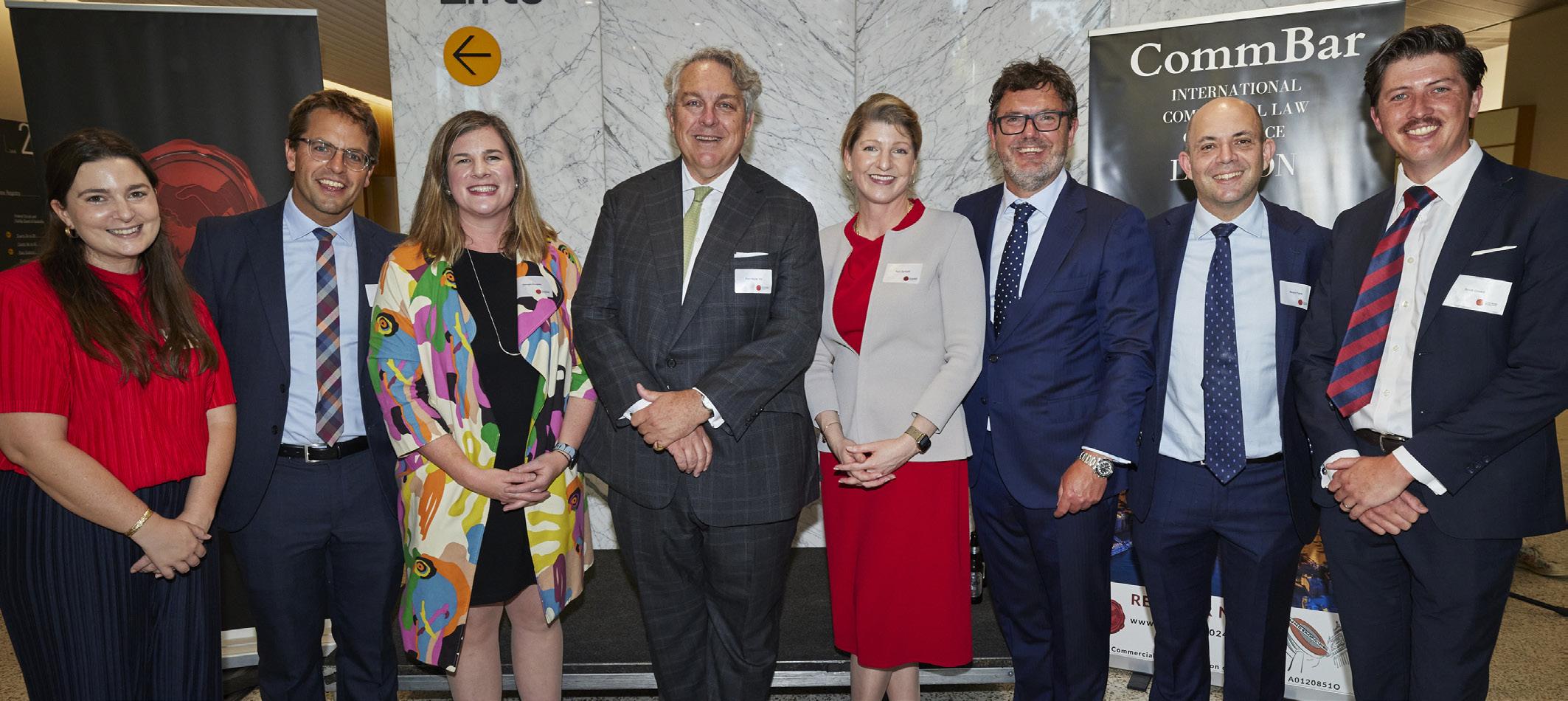
at Magdalen College, Oxford, and the Inner and Middle Temple in London on 1, 3 and 4 July 2024. The conference attracted over 110 barristers from the Commercial Bar in Melbourne and was also attended by members of the Commercial Bar in London and leading members of the commercial judiciary in both Melbourne and London. A full report of the conference (occurring in the 2024-2025 financial year) will appear in next year’s annual report.
Finally, as it did in the 2023-2024 financial year, CommBar will continue to serve commercial barristers practising at the Victorian Bar, whether that be supporting their practices in whatever way is welcomed and effective, together with operating as a reliable resource for members to share knowledge and keep up to date with developments in commercial law. Additionally, CommBar will continue to advocate for members’ interests with the courts and government and serve as a reliable and trusted resource in the community by engaging with the government and courts on matters ranging from commercial law reform to the efficient and effective operation of commercial courts.
CommBar is the successful specialist Bar association that it is because of the sum of its many parts. On behalf of the CommBar executive committee, I thank all our members and members of the wider Victorian Bar, who have contributed to and supported CommBar over the past 12 months.
Committee as at 30 June 2024: James Mighell KC (Chairman), Mary Anne Hartley KC (Treasurer), Lachlan Allan (Secretary), Julia Frederico (Assistant Secretary), Tim Tobin SC, Andrew Clements KC, Róisín Annesley KC, Michelle Britbart KC, Fiona Ellis, Patrick Over, Gavin Coldwell, Stephen Jurica, Michael Clarke, Leisa Glass, Stella Gold, Raph Ajzensztat, Carmelina Spitaleri, Jessica Clark, Paul Lamb, Scott Davison, Tristan Nathanielsz and Peter Haddad.
The Common Law Bar Association continues to grow and be active in promoting the interests of its members and assisting the Court.
There are currently 367 members of the Victorian Bar who are members of the Common Law Bar Association. This is an increase of 37 from this time last year.
Representatives of the Common Law Bar Association Committee have met regularly with judges of the Supreme and County Courts in relation to the conduct of common law trials in both courts and serious injury applications in the County Court.
In addition, the Association continues to be strongly represented on the various user or stakeholder groups of the Supreme and County Courts, and provides updates to its members following meetings of these groups.
The Association is involved in sponsoring industry events, such as those promoted by the Australian Lawyers Alliance and Australian Insurance Lawyers Association.
The Committee continues to act as a “postbox” for pro bono referrals within the Common Law Division of the County Court to promote those referrals to its membership. This
arrangement continues to facilitate the uptake of referrals from the Bar.
The Association’s CPD sub-committee continues to provide a comprehensive program of regular CPDs for members and to solicitors working in the common law jurisdiction. At a recent evening CPD, Fiona Spencer KC and Richard Stanley KC provided an update on common law/personal injury related cases which was very well attended by the Bar and solicitors. The Association intends to run similar events in future.
The Association continues to provide regular case summaries of recent Court decisions to its members. The junior membership of the Association is often involved in drafting these summaries, which are then distributed by the Committee.
The Association held its 2023 Annual Meeting and Dinner on 30 November 2023, both of which were very well attended.
The Association would like to particularly acknowledge and thank David Martin, who retired as Secretary last year after 29 years of service to the Association in that role.
Committee as at 30 June 2024: Sally Flynn KC (Chair), Jason Gullaci SC (Vice Chair), Morgan Brown (Treasurer), Abbie Roodenburg (Secretary), Sharon Lacy SC, Jim Shaw, Shaun Ginsbourg, Robert O’Neill, Jo Swiney, Carmen Currie, Sam Andrianakis, Alex Patton, Zubin Menon, Amanda Burnnard, Paul Smallwood, Christopher Wareham, Amit Malik, Veronika Drago, Susanna Locke and Felicity Fox.
Members of the Criminal Bar Association have had a busy year advising on proposed legislative changes across many areas of criminal law, as well as advocating for increased fees for our members, particularly in Office of Public Prosecutions and Victorian Legal Aid matters. We were successful in petitioning the Indictable Crime Certificate (ICC) Committee to reduce the ICC fee given the more recent changes to requirements for ongoing membership, resulting in a significant deduction to the renewal fee.
Every week, submissions are sought by government and consultative committees for our input into proposed legislative amendments, particularly in the areas of sexual offences, bail and youth crime related matters. Our Committee and non-Committee members who have volunteered to assist have continuously produced highquality submissions to contribute to the discussions and ensure that crucial criminal law principles, such as the presumption of innocence and burden and onus of proof, are not diminished by legislation. In many cases, we are the only legal body other than VLA and the OPP asked to provide submissions and so we offer an important perspective amongst the voices of other community organisations with less of a legal focus. We thank all those who have volunteered
to draft submissions, often at short notice and with tight timeframes for filing, and those who have appeared before Senate Committees to make similar submissions.
The Committee has continued to represent our members on court user groups and consultative/advisory committees on forensic evidence, custodial services, intermediaries and the Child Witness Service. We have worked with the Courts in the face of the cyber-attack early in the year to ensure access to justice remained as efficient as possible. We have recently collaborated with Corrections to produce a fact sheet for prison visits that clearly articulates the requirements for barristers conducting client visits. This will be distributed across correctional facilities and to our members and it is hoped this will ensure timely access is provided for all legal visits. We started the year with “Welcome to 2024 Drinks” at the Mint and it was a well-attended evening and a wonderful start to the 2024 working year. Our CPD subcommittee has continued to arrange a variety of interesting and valuable educational opportunities for our members with engaging and varied speakers. The CBA Health and Wellbeing sessions (new to 2024) have been particularly well attended and received. In March 2024, a joint Law Insitute Victoria/CBA CPD networking afternoon was held at the LIV.
Finally, we must acknowledge the CBA’s success at the Industrial Bar v Criminal Bar comedy debate where Patrick Doyle SC and Zoe Broughton entertained the crowd and came away winners of the debate in what was a truly entertaining evening.
Committee as at 30 June 2024: Geoffrey Dickson KC (Chair), Caroline Paterson (Deputy Chair), Anna Goldthorp (Treasurer), Sophie Mariole (Secretary), Jeanette Swann (CPD Coordinator), Gerard Holmes, Hilary Bonney, Sarah Hession and Therese Borger.
During the 2023-2024 financial year, we farewelled Therese Borger from our Committee and welcomed Alex Metherell. Alex has made some valuable contributions to the Committee, including drafting a submission to the Bar Council in response to the Law Council of Australia’s request for input in relation to Family Violence Orders.
Our CPD program, under the management of Jeanette Swann, has continued to offer a wide variety of presentations to our members. The Committee is indebted to the members who have generously shared their knowledge and time.
In September 2023, our members gathered at the newly renovated Metropolitan Hotel for a cocktail party. It was a lovely opportunity to catch up with colleagues in this postCOVID, online hearings world where many of us do not see each other as often as we used to.
In December 2023, our end of year dinner was held at the Panama Room in Fitzroy. Noah (Nicky) Eidelson, who has been battling cancer, attended with his wife and gave a very moving speech. We also congratulated Helen Dellidis SC who took silk in the 2023 intake.
Our annual barefoot bowls event in February 2024 was a sellout and we were blessed with a mild night. The solicitors managed to clinch victory in a playoff which was emceed very enthusiastically by Judge Evelyn Bender. As usual, much fun was had by all.
Committee as at 30 June 2024: Jenny Firkin KC (President), Kate Burke (Senior Vice President), Alex Manos (Vice President), Nico Burmeister (Treasurer), Leigh Howard (Secretary), Marc Felman KC, Jim McKenna, Cathy Dowsett, Joel Fetter, Eugenia Levine, Siobhan Kelly, Dimitri Ternovski, Fiona Knowles, Brendan Avallone, Franceska Leoncio, Christopher McDermott and Declan Murphy.
The IBA is an association of barristers who practise in the field of industrial and employment law. The IBA engages with Courts, Tribunals and the Fair Work Commission about practice-specific matters. It has contributed to the Victorian Bar’s submission on the New Draft General Federal Law Rules (FCFCOA) and liaised with the Fair Work Commission regarding the development of its website to enable searches for Australian Industrial Relations Commission (AIRC) 2008 Award Modernisation documents.
The Federal Court’s annual industrial law seminar was held in Melbourne last year. Amongst speakers from the Bench and the South Australian Bar, Jonathan Kirkwood SC and Siobhan Kelly spoke on “Employment law class actions. “The IBA also hosted a CPD seminar on “‘Set off’ in industrial and employment law” presented by Chris O’Grady KC, Andrew Pollock, Natalie Campbell and Stephanie Cheligoy. The seminar addressed the Federal Court judgments of Workpac Pty Ltd v Rossato, Wardman v Macquarie Bank Ltd and Fair Work Ombudsman v Transpetrol and the issues that arise when parties fail to create the type of work relationship intended.
The IBA has continued to attract a consistent stream of new members. This is due, at least in part, to the popularity of its annual comedy debate. This year, the debate drew the highest ticket sales yet with Rachel Doyle SC and James Page representing the Industrial Bar against Patrick Doyle SC and Zoe Broughton of the Criminal Bar. Equally funny were her Honour Justice Richards, who moderated, and the IBA’s Siobhan Kelly, who chaired the event.
The IBA’s other big social event, the annual dinner, was held at LongSong. This occasion provides an opportunity for past and present members of the Industrial Bar, and members of the judiciary and Fair Work Commission, to come together.
This year Craig Dowling SC, a former President of the IBA, was appointed to the Federal Court of Australia. The IBA extends its congratulations to Justice Dowling on his appointment.
The President of the IBA thanks all those who have contributed to the Association this year. Special thanks go to the members of the IBA Committee, who have given their time and skills to the IBA over the past year.
Committee as at 30 June 2024: Georgina Costello KC (Chair), Min Guo (Deputy Chair), Angel Aleksov (Secretary and Treasurer), Cahal Fairfield (Membership Officer), Roz Germov (CPD Officer), Christopher Horan, Anthony Krohn, Matthew Albert, Krystyna Grinberg, Evelyn Tadros, Adam McBeth, Mathew Kenneally and Kay Chan.
The Migration Bar Association has had a productive year, holding a number of committee meetings, assisting the Bar with law reform submissions, liaising with the Bar Council and staging several CPD seminars, with special thanks to Roz Germov for her help in organising the CPD program.
Goals for the year ahead include facilitating a function for migration barristers and solicitors to attend together, providing online resources to migration barristers via the Bar’s revamped website and continuing to deliver highquality CPD seminars.
Committee as at 30 June 2024: Eugene Wheelahan KC (President), Catherine Pierce (Vice President), Gareth Redenbach (Treasurer), Daniel Diaz (Secretary), Nick Dodds (CPD Convenor), Fiona Cameron, James Strong, Michael Wells, Piotr Klank, Khai-Yin Lim, Andrew Healer, Kay Chan, Paul Jeffreys, Alyse Mobrici and Mark Gioskos.
The TBA remains an innovative Bar association that has continued to provide opportunities for younger members to network with senior members and members of the profession. To that end, the TBA held “Spring Drinks” to coincide with a Tax Institute of Australia summit, enabling members of the Tax Bar to meet members of the legal profession who provide advice to private taxpayers. The TBA has also held CPD seminars each time a significant decision of potential interest to the Tax Bar and tax lawyers has been handed down, which have been co-presented by junior members and silks.
Highlights of the year include:
» Delivering the TBA annual dinner in November 2023 with the Honourable Justice Moshinsky as keynote speaker.
» Continuing promotion of the Administrative Appeals Tribunal’s pro bono scheme.
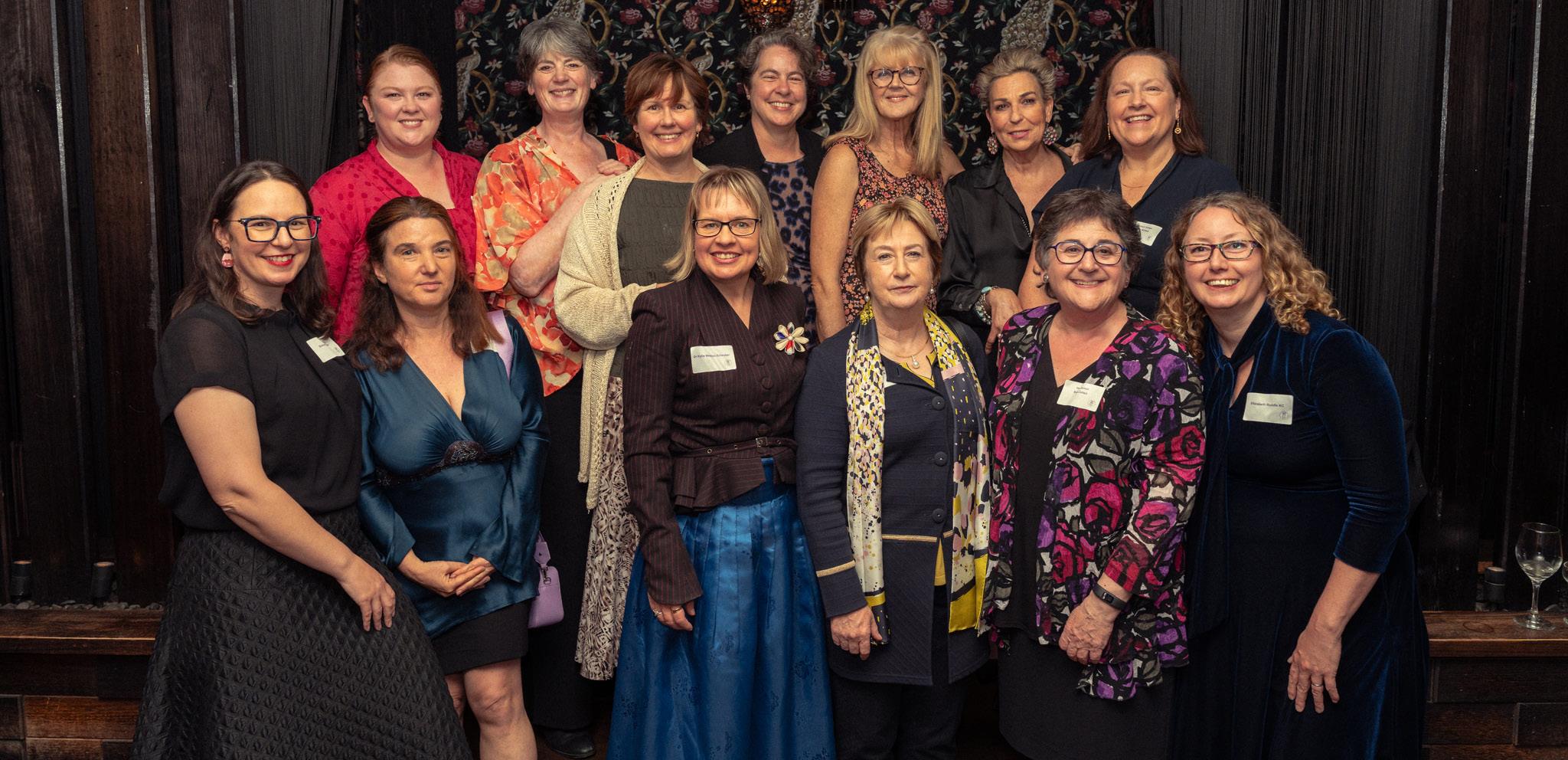
» Sending email circulars to members each time a significant decision of potential interest to the Tax Bar and tax lawyers has been handed down.
» Organising speed networking to introduce new counsel to the Australian Taxation Office and its panel firms.
Committee as at 30 June 2024: Elizabeth Ruddle KC (Convenor), Sandra Karabidian (Assistant Convenor), Priya Wakhlu (Assistant Convenor), Monique Hardinge (Treasurer), Kylie Weston-Scheuber (Membership Secretary), Samantha Cipriano (Assistant Secretary), Julianne Jacques KC, Kylie Evans SC, Deanna Caruso, Natalie Blok, Astrid Haban-Beer, Marissa Chorn, Emily Golshtein, Veronica Holt, Gemma Cafarella, Shannon Finegan, Georgina Rhodes, Jade Ryan and Brittany Myers.
The Women Barristers’ Association (WBA) enjoyed a productive year, supported by a hard-working volunteer committee. We thank those who assisted the WBA with its events program to continue promoting and supporting women at the Victorian Bar. The WBA also extends its gratitude to the Honourable Justice Melinda Richards for her patronage.
This year has been a year of celebration and looking forward to how we can support women and diversity at our Bar.
We finished 2023 with a raft of celebratory 30 th anniversary activities, including a well-attended cocktail party enjoyed by new and long-standing members alike, and a fascinating breakfast hearing from past convenors – an amazing window
into how far we have come. We celebrated new appointments and the festive season with our “Leaps and Bounds” event.
But the year was not just about reminiscing – there is still much to do. We were thrilled to co-host with Victorian Women Lawyers, Australia’s biggest equitable briefing event, “Briefing for Balance” in September 2023. The event, held to promote the new government briefing policy requiring that 50 per cent of briefs by number and value go to women, was enjoyed by counsel and solicitors alike.
The WBA supports a more diverse Bar and profession, and we were thrilled to co-host the Annual Dame Roma Mitchell Memorial Luncheon where we heard from a range of speakers, including Justine Clark, Principal at Tisher Liner FC Law and the community champion for Pride in Law; Dr Daye Gang, a Barrister at the Victorian Bar and the community champion for Asian Australian Lawyers Association; Sam Drummond, lawyer/writer and disability advocate and community champion for the Disabled Australian Lawyers Association (DALA); Candice Jackson, Barrister at the Victorian Bar and the community champion for Tarwirri-Indigenous Law Students and Lawyers Association of Victoria; and Jillian Prior, co-founder and Principal Legal Officer of the Law and Advocacy Centre for Women, and the community champion for Victorian Women’s Lawyers.
On top of this, we have continued to speak out against discrimination, support our members in their practices with education projects, such as our Court of Appeal moot, and have lots of fun at social and networking events.


Committee as at 30 June 2024: Michael Whitten KC (Chair), Dr Peter Condliffe (Deputy Chair), Tomaso Di Lallo, Mark Campbell, Emma Swart, James McDougall, Samantha Cipriano, Adam McLean, Mark McKillop, David Kim, David Sanders, Temple Saville, Tasman Fleming, Sandra Karabidian, Annette Gaber, Nussen Ainsworth and Darryl Burnett (Bar Council Representative).
This report relates to the ADR Committee’s activities since 1 July 2023 and up to 30 June 2024.
The Committee thanks the members who retired during or at the end of 2022: William Lye OAM KC, Gregory Harris KC, Bill Gillies, Darren Mort, Philip Hayes, Glen Pauline, Karen Le Faucheur, Eleanor Coates, Cameron Charnley and Jessie Taylor.
During the year, the Committee was assisted by and extends its thanks to Bar staff, in particular the Education Team including Michelle James, Nikki Walker, Golam Kibria and the in-house legal team, particularly Fernando Gallieto and Jodie Hill.
Accreditation Sub-committee chaired by Cameron Charnley in 2023 and Tomaso Di Lallo in 2024
The sub-committee considered, and approved, where the relevant requirements were met, applications for NMAS accreditation, re-accreditation and reinstatement, as well as applications relating to the Victorian Bar Advanced Mediator Scheme 2019 (VBAM).
The Bar is a Recognised Mediator Accreditation Body (RMAB) under the Australian National Mediator Accreditation System (NMAS). NMAS accreditation, reaccreditation and reinstatement as mediator is by resolution of the Bar Council as the governing body of the Victorian Bar and will usually act on the recommendation of the Alternative Dispute Resolution Committee.
From July 2023 to June 2024, the Sub-committee received 30 initial applications, 74 renewal applications, nine re-instatement applications and one transfer application
for NMAS. All applications were reviewed by the Subcommittee members and were recommended for approval. Similarly, the Subcommittee received four initial applications and 15 renewal applications for the VBAM scheme, all of which were recommended for approval.
In August 2023, the Mediator Standards Board (MSB) released version one of the Australian Mediation and Dispute Resolution System (AMDRAS) Standards. The MSB then spent four months in consultation with members, trainers, mediators and key stakeholders alike. As part of this consultation, the Law Council of Australia (LCA) also released a consultation in relation to the alternative pathway for mediator accreditation exclusively for lawyers. After consultation, the MSB released the final version of the AMDRAS standards along with the Guidelines and the Transitional Rules that will apply to the Bar.
A working group was formed to consider the proposed amendments to the NMAS Practice and Approval Standards. The working group formed a view that the implementation of the AMDRAS Standards should be supported by the Bar and that an alternative scheme for lawyers should not be supported.
Courts Liaison Sub-committee chaired by Glen Pauline in 2023 and Michael Whitten in 2024
The Courts Liaison Sub-committee facilitated the nominations by the President and subsequent appointment of a Victorian Bar nationally accredited mediator in:
5 County Court proceedings pursuant to the Victorian Bar/ Commercial Division Mediator Referral Scheme; and
17 proceedings pursuant to the Victorian Bar/Family Property List Mediator Referral Scheme for County Court testators’ family maintenance proceedings.
The Sub-committee is currently reviewing the Expedited Mediator Referral Scheme as well as the Nomination Process for all referrals received as part of the County Court Schemes.
Glen Pauline (previous Chair of the Courts Liaison Subcommittee) presented at the National Mediation Conference
2023 held in Te Wanganui-a-Tara, Aotearoa (Wellington, New Zealand) on the Victorian Bar/County Court Mediation Referral Schemes.
Nussen Ainsworth and Tasman Fleming are currently serving on the Magistrates’ Court’s ADR Committee in 2023 and 2024. The Court is currently developing some guidance in relation to using platforms for short-notice mediations.
Education Sub-committee chaired by Tasman Fleming
The Sub-committee arranged and hosted a program of CPD sessions open to all Victorian Bar members and regular discussion groups. The program provided increased mediation related CPD opportunities for the CPD requirements of practising certificates and sufficient mediation content for the purposes of NMAS reaccreditation.
Since 30 June 2023, the Committee has delivered five CPD and four Mediators’ Discussion Groups via Zoom or in person. The online and hybrid sessions were very well attended with significant registrants.
The Lawyers Mediation Certificate (LMC) course was presented by Dr Peter Condliffe, Principal Instructor, together with co-instructors Eleanor Coates, Peter Fary SC, Tasman Fleming and Karen Le Faucheur and assisted by the Victorian Bar Office Education Team and other coaches and assessors. The November 2023 course had 20 participants and was held over 24-26 November and 1 and 3 December, partly online via Zoom and partly face to face on Level 1 of Owen Dixon Chambers East.
The May 2024 course had 18 participants held over six days (17, 18, 19 May and 24, 25, 26 May). The report from the principal instructor is yet to be received.
The Sub-committee also initiated a Mediator Mentoring Program. The aim of the Program is to provide members of the Bar who have obtained their accreditation as mediators within the last few years to be paired with experienced mediators of the Bar. The Program seeks to encourage the collegiality between members of the Bar who practice and those who wish to practice, as mediators, and to assist newly accredited mediators to be introduced to experienced mediators at the Bar.
Publicity, Media and Communications Subcommittee chaired by Karen Le Faucheur in 2023 and Annette Gaber in 2024
Since 30 June 2023, the Sub-committee compiled and distributed two newsletters to the Bar’s accredited mediators, used the closed LinkedIn Group for communications to members and continued to work with the Bar on modifications and refinements of the Bar website to improve the accuracy of the information on the website and the visibility of the Bar’s ADR capabilities and services.
Victorian Bar sponsorship of the International Chamber of Commerce Asia Pacific Commercial Mediation Competition continued, including the awarding of the Henry Jolson QC prize to the winning team.
We wish to thank the members of the Committee, members of the Bar Office and Bar Presidents Sam Hay KC and Georgina Schoff KC for their work on the various projects addressed by the Committee.
Committee as at 30 June 2024: Gregory Harris KC (Chair), Andrew Hanak KC, Matthew Harvey KC, Dr Brenton Devanny, James Waters, Amy Hando, Huw Watkins, D’Arcy Hope, Drossos Stamboulakis, Bianca Sacco and Jessie Taylor (Bar Council Representative).
The Committee’s work over the 2023 period centred around implementing the Victorian Commercial Arbitration Scheme (VCAS). At the close of 2023, 23 arbitrators who are members of the Victorian Bar were appointed to the VCAS panel.
The Chair met with the Victorian Department of Agriculture to discuss using VCAS as the preferred arbitration body for the government biosecurity compensation scheme. The Chair was also in contact with VCAT to consider using VCAS to help reduce the post-COVID backlog of claims.
Members of the Committee prepared and presented a number of CPDs on an introduction to arbitration to members of the Bar, aimed at educating practitioners about the fundamentals of arbitration and promoting VCAS.
The Committee also gave input into the Bar’s new website construction in relation to its references to arbitration.
In 2024, the Committee will continue to promote arbitration as a safe alternative to litigation. It will continue to engage with judicial officers from the Courts and VCAT regarding arbitration and what the Bar can do to assist the Courts and Tribunals with the backlog of cases and continued delays being suffered due to the COVID-19 pandemic. The Committee plans on conducting further CPDs on issues relevant to arbitration. The Committee is also continuing to have input into the form of the Bar’s new website.
Committee as at 30 June 2024: Siobhán Ryan KC (Chair), Peter Willis SC (Deputy Chair), Charles Parkinson KC, Justin Tomlinson, Laura Colla, Morgan McLay, Julia Frederico, Melanie Albarella and Luisa Frederico and Mr Gavin Silbert KC (Bar Council Representative).
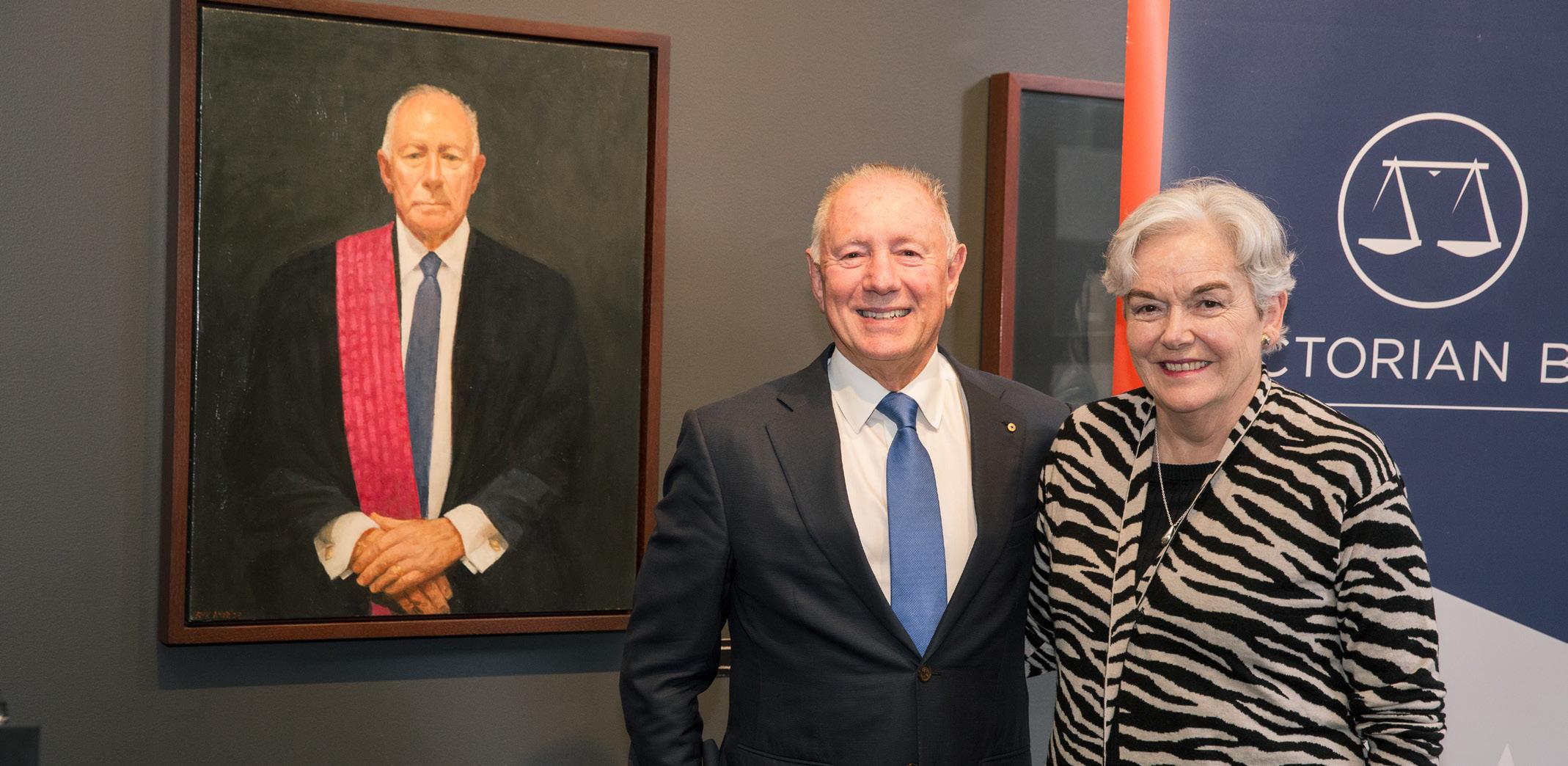
In December 2023, the Art & Collections Committee farewelled committee members Cilla Brookes, Timothy Goodwin and Evelyn Tadros and welcomed new members, Laura Colla and Justin Tomlinson. We also farewelled our Honorary Curator, Sophie Prince.
The functions of the Committee are to advise and assist with the maintenance and development of the Victorian Bar’s collections of art and artefacts, and to assist in the promotion, preservation and protection of material culture belonging to and associated with the Victorian Bar.
In that respect, the Committee acts as an advisory committee to the Peter O’Callaghan QC Gallery Foundation Ltd and works closely with the Foundation in commissioning portraits of past and present luminaries of the Bar to grow and display the Gallery Foundation’s collection, in accordance with its Commissioning Protocol. The Committee makes recommendations to the Bar Council in relation to the custodianship, maintenance, development, cataloguing, care and conservation, and display of art and artefacts associated with or relevant to the Bar. The Committee also works to promote access to, and appreciation of, the collections by the wider community as well as the Bar.
In the period 1 July 2023 to 30 June 2024, we took delivery of the following commissions and gifts:
» The Honourable Linda Dessau AC CVO by Yvette Coppersmith
» The Honourable Geoffrey Nettle AC KC by Jude Rae
» Jeremy Ruskin KC by Juan Ford
» The Honourable Gareth Evans AC KC (photograph).
» A portrait of Andrew Kirkham AM RFD KC by photographer Earl Carter was approved by the Peter O’Callaghan QC Gallery Foundation on the Art & Collections Committee’s recommendation. Fundraising for it is underway.
In May, the Committee reprised Changing Faces of the Bar, a black and white photography exhibition showcasing the diversity of the Victorian Bar. Photographer Garth Oriander returned with his pop-up studio to take portraits of members of the contemporary Bar and has curated a video installation of photographs from both the 2018 and 2024 suites which will be displayed in the Peter O’Callaghan QC Gallery. This will be unveiled by the Honourable Chief Justice Deborah Mortimer of the Federal Court of Australia later in the year.
At its last meeting for FY 2023/24, the Committee resolved to recommend a portrait of the late James Merralls AM QC to the Foundation. We have obtained a very suitable portrait from the Merralls family.
Artefacts
» A photo portrait of Stratton Langslow (Bar No 796) by Elizabeth Langslow, gifted by His Honour Mark Dean KC and his Honour Magistrate Robert Stary;
» Full bottom wig of Lord Asquith (1890 – 1954) –English barrister and Law Lord, gifted by the late Nimal Wikramanayake KC;
» Annotated transcripts of R v Foord (NSWSC 1985) and a collection of Northern Territory Supreme Court Cases, gifted by Andrew Kirkham KC;
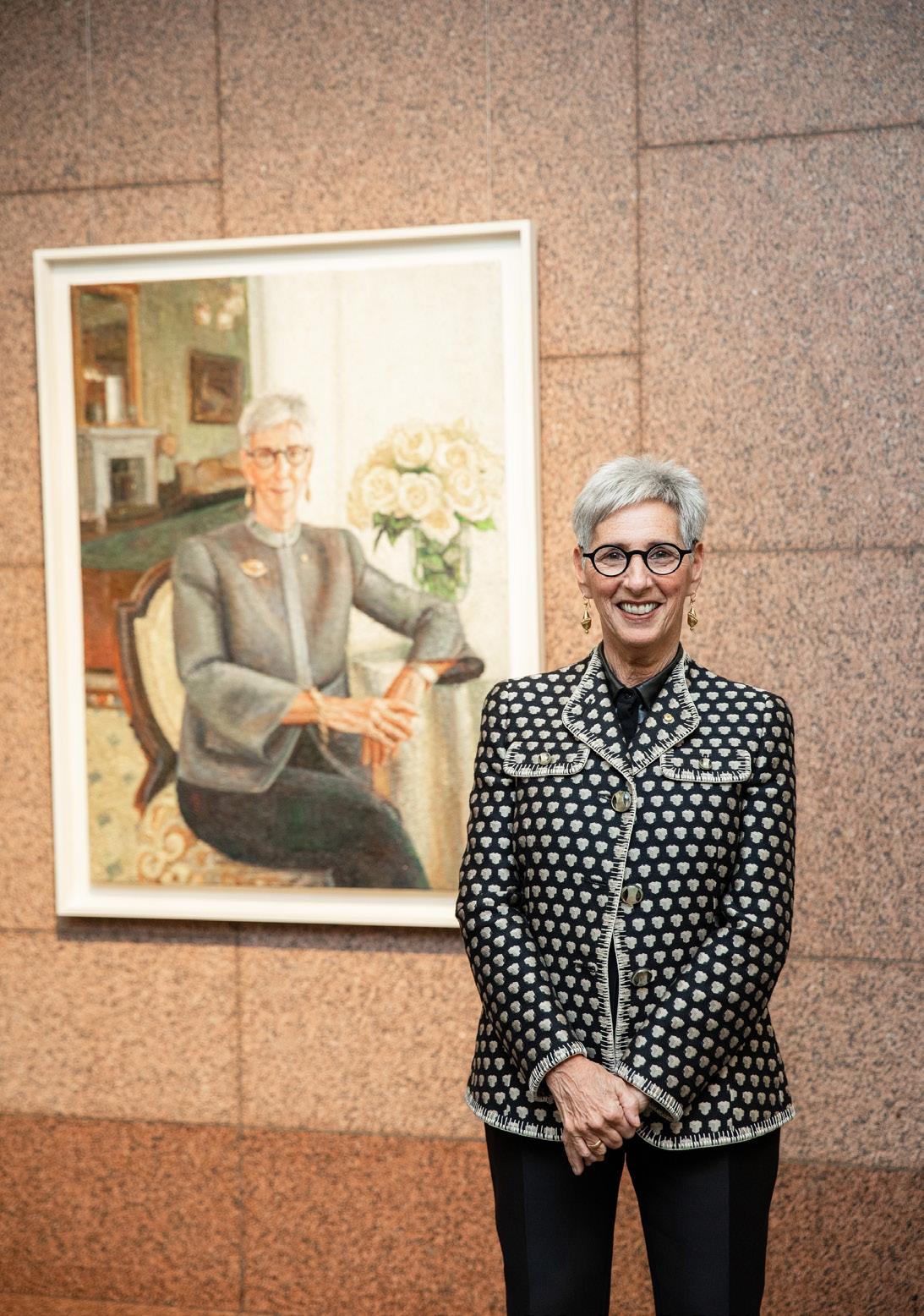
» The ‘Collingwood Cup’, given by Tony Lewis (Bar No 972) arising from the case on the conduct of counsel in Lewis v Ogden (1984) 153 CLR 682: see Victorian Bar News No 153 (Winter 2013), p 60);
» Correspondence between the Bar, Sir Robert Menzies and artist, Ivor Heley.
» Appointment of a part-time archivist has been secured thanks to funding from the Bar Council. Steve Stefanopoulos OAM will manage the preservation of the materials generated by the History of the Bar Project and will also manage the artefacts collection.
Events
We were pleased to host the following events:
» 17 July 2023 – photo portrait of Nimal Wikramanayake KC was unveiled by retired County Court Judge Ross Howie KC;
» 2 August 2023 – portrait of Peter Jopling AM KC by Louise Hearman was unveiled in the presence of the artist by Eddie Gisonda;
» 21 November 2023 – portrait of the Hon John Middleton AM KC by Rick Amor was unveiled in the presence of the artist by Philip Crutchfield KC;
» 27 February 2024 – photo portrait of Barbara Hocking by Bryan Keon-Cohen KC was unveiled with a talk by her daughter, Emeritus Professor Jenny Hocking AM;
» 23 May 2024 – Law Week 2024 – “Lawyers on Film” a well-attended and lively panel discussion with documentary filmmaker Daryl Dellora and barrister John Ribbands;
» 28 May 2024 – portrait of the Hon Linda Dessau AC CVO by Yvette Coppersmith was unveiled in the presence of the artist.
The Committee welcomes proposals from members of the Bar for further portraits, in accordance with the criteria of the Commissioning Protocol, and donations of memorabilia, in accordance with the Committee’s donations policy. Members of the Bar may support the Peter O’Callaghan QC Gallery by making donations to the Foundation.
Committee as at 30 June 2024: Sarah Keating (Chair, Bar Council Representative), Raini Zambelli (Deputy Chair, Bar Council Representative), Michael Flynn KC, Catherine Boston SC, Mark McKillop, Dean Luxton, Justin Mereine, Temple Saville, Andrew Morrison, Myles Tehan and Stephen Bunce.
The Audit Finance and Risk Committee (AFRC) acknowledges the tremendous support of Amanda Utt (Executive Director), Mark Bryant (Manager – Finance and Membership), Sharni Doherty (Senior Executive Assistant) and all the other diligent members of the Bar Office and expresses its gratitude to them. The Chair thanks the members of the Committee for their commitment and service to the Bar.
The AFRC oversees the Bar’s budget and annual financial reporting, and monitors and maintains the Bar’s risk register. Its most important responsibility is to oversee the preparation of the budget and end-of-year accounts, and to make recommendations about these matters to Bar Council, including the acceptance of the financial report in the annual accounts. In discharging its obligations, the AFRC liaises with the Bar management and external auditors.
The AFRC, working closely with Bar Office management, recommended a budget to the Bar Council which enabled the maintenance of existing subscription fees without any increase for all barristers in Category AI for the 2024-2025 financial year. This considered inflationary pressures, the continuing cost of the IT Project, the increased cost of the new Bar exam and sitting arrangements. A budget projecting a modest deficit, largely attributable to the IT Project was
recommended to Bar Council. The Bar Council approved the proposed budget and maintenance of existing subscriptions. The Victorian Bar has now secured an increase in funding from the LSB for the delivery of regulatory, ethics and legal practice activities, which is expected to reduce the deficit to a break-even position.
Further to its regular oversight of activities, this year, the AFRC:
» Reviewed the risk register.
» Reviewed the Professional Standards Improvement Plan.
» Consulted extensively with BCL’s CEO regarding the status of chambers vacancies, the proposal to manage costs associated with those vacancies, and the impact of those vacancies along with debt recovery activities for the outstanding rent for members.
» Received feedback from the Victorian Bar Office regarding the progress of the IT Project, and the impact of any future delays on the cost of the project.
Committee as at 30 June 2024: Rachel Walsh (Chair), Zoe Maud SC (Deputy Chair), Ian Horak KC, Robert O’Neill SC, Premala Thiagarajan, Dr Jason Harkess, Sav Korica, Patrick Noonan, Amit Malik, Christopher Hibbard, Aaron Lane and Felicity Fox (Bar Council representative).
The Committee acknowledges and thanks outgoing members of the Committee - Richard Dalton KC (Chair), Romauld Andrew KC, Andrew Meagher SC, Deborah Siemensma, Glenn Worth and the Bar Council’s representative, Alistair Pound SC for their work.
The CPD Program continued to see a strong growth in the delivery of CPD sessions in the 2023-2024 CPD year, with a total of 80 CPD sessions, 25 of which were delivered as in-person only seminars, 12 seminars were delivered via Zoom, and 43 were a hybrid of in-person and livestream delivery. The total attendees recorded for the year was 5,794.
There was a range of content across the four CPD categories (Substantive Law, Barristers Skills, Practice Management/ Business Skills and Ethics/Professional Responsibility). There were contributions from various Bar Associations and Bar Committees, most notably the Commercial Bar Association (15 sessions), the Alternative Dispute Resolution Committee (10 sessions), the Criminal Bar Association (10 sessions), the Tax Bar Association (6 sessions) and the Family Law Bar Association (5 sessions). There were 16 CPDs with ethics content. Three of those were exclusively in the Ethics category. This is in line with the recommendation of the Police Informants (“Lawyer X”) Royal Commission to seek to embed Ethics into all topics, rather than treat it as a standalone topic.
The 2024 Committee has actively encouraged Bar Associations and Committees to embed Ethics content in all CPD proposals, and also to work with one another to create CPD activities which appeal to a cross-section of the Bar. This has resulted in an increase in joint sessions in 2024.
The CPD Committee held four meetings in the 2024 financial year: 25 October 2023, 1 February 2024, 13 March 2024 and 8 May 2024. The main activities of the CPD Committee for the year were:
» Undertaking a review of the last 12 months of CPD topics and developing the Bar’s CPD program framework (ongoing);
» Developing a CPD Policy – Guidance to members for allocating CPD points to committee activity and similar;
» Developing a CPD Masterclass series geared (but not exclusively) toward barristers with 6 or more years’ call;
» Overseeing the activities of the Victorian Bar’s Education Team in providing administrative support and resources to Bar Committees and Associations for the scheduling and delivery of their CPD sessions;
» Providing advice and guidance to barristers on whether specific sessions or other activities attract CPD points (and any caps on points for such sessions/activities);
» Collaborating with Bar Associations and Committees with respect to Indigenous cultural capability training;
» Approving CPD exemption requests;
» Monitoring and analysing data on CPD activity; and
» Overseeing the annual audit of barrister compliance with the CPD Rules.
One of the recent initiatives of the CPD Committee has been collating feedback from barristers on the delivery of all CPD sessions through the Survey Monkey feedback platform. This offers barristers a convenient way to provide feedback about the presenters, the content and style of the presentations, and preferences for future topics. This year we received 872 survey responses.
For the annual CPD compliance audit, 112 barristers were randomly audited. 11 barristers did not initially meet the audit requirement and were required to submit rectification plans. Of these, 10 have complied, submitting rectification plans, and one barrister remains non-compliant. Additionally, 28 barristers ticked “No” on their PC renewal application that they had not met the minimum requirements of the CPD Rules. Of these, 25 achieved compliance by submitting rectification plans, and three remained non-compliant as of 31 July 2024.
The Committee thanks all barristers who have served on the CPD Committee this year. It also thanks Michelle James and Golam Kibria of the Bar’s Education Team for their work in liaising and organising the delivery of the CPD Program and the secretariat support provided for the Committee’s meetings. The Chair is also grateful to Zoe Maud SC for her invaluable advice and assistance as Deputy Chair.
Committee as at 30 June 2024: Justin Hannebery KC (Chair), Fiona Ryan SC (Deputy Chair), Rishi Nathwani SC, Daniel Nguyen, Jessie Taylor and Ffyona Livingstone Clark. It is assisted by Ben Gibson (Honorary Secretary), Elle Nikou Madalin and Christopher McDermott (Assistant Honorary Secretaries).
The Committee thanks those members who retired in November 2023: Peter Chadwick KC (former Chair), Gavin Silbert KC (former Deputy Chair), Darryl Burnett, Nawaar Hassan, Raini Zambelli and former Honorary Secretary, Owen Wolahan.
The Committee is appointed pursuant to clause 63 of the Constitution of the Victorian Bar. It is comprised solely of members of the Bar Council and considers matters in relation to the grant, renewal, variation, suspension or cancellation of practising certificates and applications to sign the Roll of Counsel and makes recommendations to the Bar Council. The Committee also deals with matters relating to the show-cause procedure set out in clause 14 of the Constitution.
The Committee meets on an as needs basis. Since the last annual report, it has met eight times. In addition, the Committee resolved four matters via email circular and held six meetings/hearings with counsel.
The 2024/25 practising certificate renewal cycle necessitated the review of 16 disclosures for recommendation to the Bar Council. In comparison, this was more than the 11 disclosures from the 2023-24 renewal cycle.
Pursuant to the Bar’s Protocol for dealing with disclosures, the Honorary Secretary and Assistant Honorary Secretaries conducted 48 interviews with March 2024 Reader applicants and 42 September 2023 Reader applicants, many of whom made disclosures as part of their Readers’ Course application. Following Honorary Secretary interviews with all Reader applicants, recommendations were made to the Bar Council as to whether the applicants should be permitted to commence the Readers’ Course and were fit and proper persons to be granted a practising certificate on successful completion of the Readers’ Course. Two applications were referred to the Committee for determination.
During the 2023/24 financial year, the Committee considered 13 suitability matters arising from practising certificate renewal disclosures, out-of-cycle disclosures relating to fit and proper person issues or disclosure of automatic show cause events pursuant to s 88 of the Legal Profession Uniform Law. As at 30 June 2024, 10 of those matters had been finalised (most requiring continued monitoring due to practising certificate conditions imposed or undertakings given to the Bar Council) and 3 remained the subject of continuing investigation.
The Committee monitors compliance with conditions placed on barrister practising certificates as well as undertakings given by barristers in relation to their practising certificates. As at 30 June 2024, there were 18 prasticing certificate restrictions and/ or undertakings being monitored for compliance.
Overall, including suitability matters disclosed as part of the 2024/25 practising certificate renewal cycle and out-of-cycle disclosures, the Committee finalised 21 matters from July 2023 to June 2024.
The Committee is grateful for the support provided by the Victorian Bar Office, in particular Kai Li Zhu (Senior Inhouse Legal Counsel), Fernando Gallieto (In-house Lawyer) and Thomas McAllister (In-house Lawyer).
Committee as at 30 June 2024: Haroon Hassan (CoChair), Clare Cunliffe (Co-Chair), Natalie Campbell (ViceChair), Georgia Suhren (Secretary), Mark Irving KC, Dr Kylie Weston-Scheuber, Zubin Menon, Eliza Tiernan, Lachlan Carter, Adam Craig, Nadia Stojanova, Raymond Elishapour, Celeste Shambrook, Olivia Go, Lauren Bull and Colin Mandy SC (Bar Council Representative).
The Committee has had a busy year since its appointment and continues to pursue a range of initiatives to promote greater diversity and inclusion within the Bar and the wider legal profession.
This year there has been a particular focus on collaboration with other Bar Committees on areas of mutual interest. A selection of our work is outlined below.
» Attending a roundtable with the Student Engagement and Indigenous Justice Committees in February 2024 to discuss better coordination of volunteers for mentoring programs, moots and internships.
» Assisting in hosting an information session for counsel about Victoria Legal Aid’s new Equity & Diversity List on 20 March 2024.
» Hosting a Parents and Carers event jointly with the Health and Wellbeing Committee on 27 March 2024 and developing online resources to better support parents and carers at the Bar.
» Hosting an Eid Celebration for members on 17 April 2024.
» Hosting a panel discussion on “Diversity in the Profession – where to from here?” on 30 May 2024.
» Hosting a Law Week panel discussion on the Diversity Internship, featuring the 2023 interns and judicial officers from the Federal Court of Australia (Rofe J), The Supreme Court of Victoria (Forbes J) and the County Court of Victoria (Judge Karapanagiotidis).
» Providing a response to an Australian Law Reform Committee Inquiry into Justice Responses to Sexual Violence, which was incorporated into a submission from the Bar Council Executive.
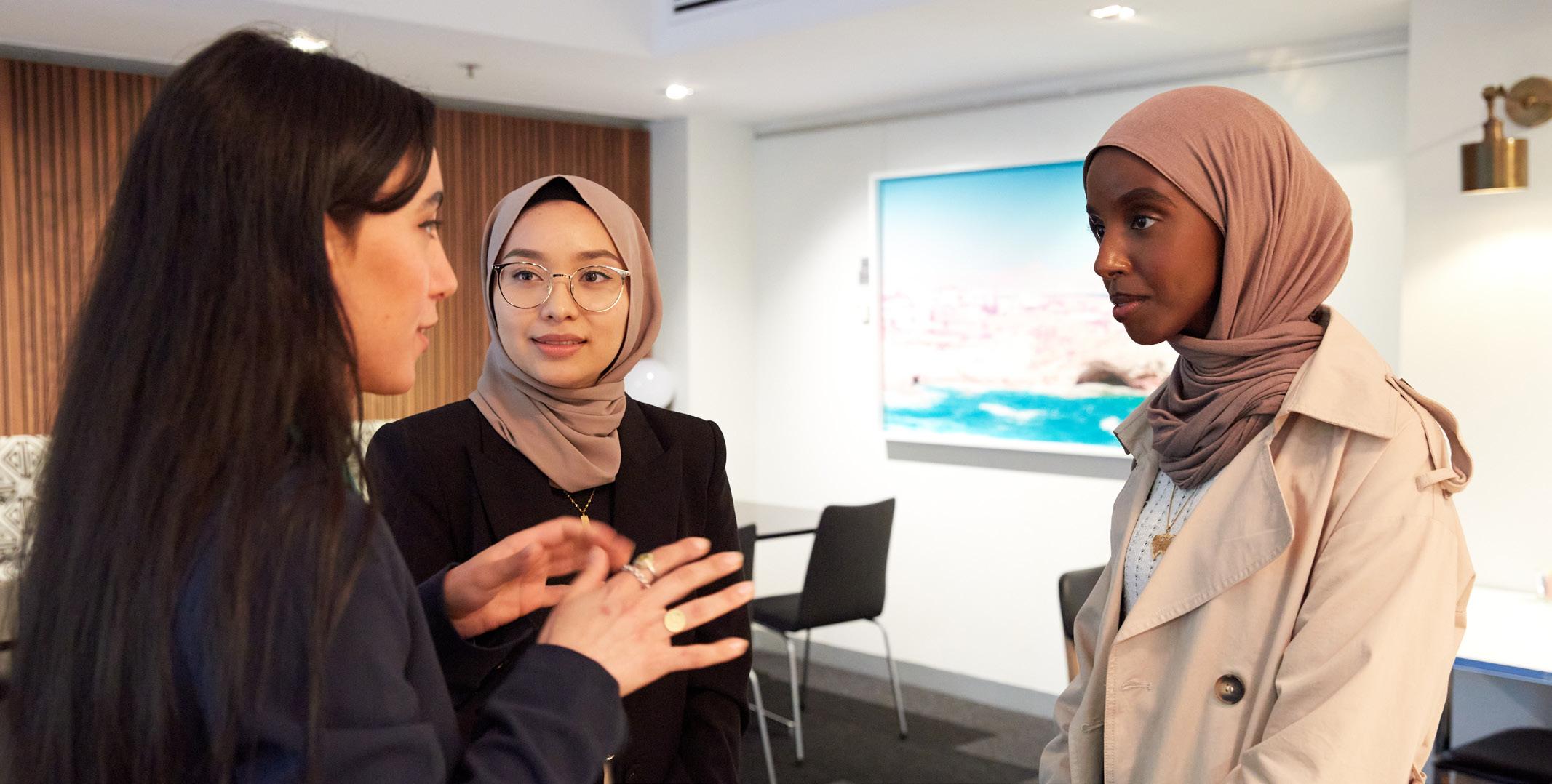
» Reviewing and providing feedback regarding the Bar’s Strategic Plan for 2024 to 2028, contributing to the inclusion of diversity as a standalone objective in the Strategic Plan.
» Drafting a letter jointly with the Health and Wellbeing Committee regarding extended sitting hours and parenting and caring responsibilities.
» Establishing a Neurodiversity Working Group which has worked with the Health and Wellbeing Committee to survey members about possible services to be offered.
» Formulating a joint response to the Law Council of Australia Public Leadership statement and model framework on sexual harassment and discrimination alongside the Human Rights Committee.
» Reviewing data collected about diversity characteristics obtained as part of the State of the Bar survey.
» Consulting with the Hon. Peter Riordan KC and the Readers’ Course Committee about proposed amendments to the Bar Entrance Exam, Readers’ Course and Reading requirements.
» Reviewing current materials and resources available from Victorian Courts in relation to name pronunciations and forms of address.
» Assisting the Bar in confirming details regarding the Disability Referral Scheme and updating information concerning Equality and Diversity on the new Victorian Bar website.
» Liaising with the Supreme Court, Federal Court, Federal Circuit and Family Court, County Court and the Victorian Civil and Administrative Tribunal to deliver the 2024
Diversity Internships and exploring the potential for expansion of the internship.
» Exploring initiatives for Culturally and Racially Marginalised (CARM) members to improve their experience of life at the Bar (which is likely to involve roundtable Chatham House discussions/feedback from CARM members and a working group to implement the feedback received).
» Maintaining ties with external stakeholders such as the LIV and other professional associations that focus on supporting equality, diversity and inclusion across the legal profession.
» Providing feedback to the Bar Council on equality and diversity issues affecting members of the Bar.
Liaising with Victorian Legal Aid and other stakeholders to expand equitable briefing policies and initiatives to include broader diversity characteristics other than gender, with a view to hosting an event regarding equitable briefing.
Exploring other initiatives to reduce barriers to entry to the Victorian Bar and to encourage persons that are traditionally under-represented at the Bar to consider careers as advocates.
1. Cultural Diversity Working Group (Co-Chairs – Olivia Go and Zubin Menon)
In addition to the events already held, the working group is planning activities for the second half of the year, including:
a. a potential CPD on safe and inclusive workplaces;
b. finalising a cultural and community calendar; and
c. organising a moot for university students.
2. Neurodiversity Working Group (Chair – Clare Cunliffe)
The working group worked with the Health and Wellbeing Committee to:
a. arranged a poll in InBrief to obtain responses from people who are neurodiverse or who know someone who is neurodiverse, in order to obtain information that might inform future work; and
b. organising a CPD on the topic to be delivered jointly with the Health and Wellbeing Committee.
3. Gender Equality Working Group (Chair – Dr Kylie Weston-Scheuber)
The working group:
a. has liaised with the Women’s Legal Service regarding training on family violence;
b. has continued to monitor discussions regarding a potential childcare centre proposal by Bar Council for opportunities for engagement;
c. reconvene re-engagement roundtables for members returning to work.
4. LGBTIQ+ Working Group (Chair – Nadia Stojanova)
The working group:
a. is coordinating the Equality & Diversity Mooting competition in conjunction with the Student Engagement Committee.
b. has hosted “Rainbow” drinks”; and
c. will host the annual “Rainbow” dinner.
The work of the Committee (and its working groups) would not be possible without the dedication of the members and the many volunteers who contribute their valuable time to our myriad projects and initiatives. We also wish to thank the Bar Office and its staff for its unstinting support of our work.
Committee as at 30 June 2024: James Barber KC (Chair), Minal Vohra SC (Deputy Chair), Daniel Gurvich KC, Dr Andrew Hanak KC, Sam Tatarka OAM, John Saunders, Paul Hannan, Patrick Over, Ingrid Braun, Timothy Scotter, Alexandra Golding, Eliza Holt, Carmen Currie, Dimitri Ternovski, Lucy Line, Lynton Hogan, Simon Fuller, Scott Cromb and Justin Hannebery KC (Bar Council Representative).
The Ethics Committee is often the first port of call for members in dealing with ethical dilemmas encountered in professional practice. The prompt resolution of those dilemmas is important to individual members of our Bar, from both a professional and personal perspective. It is also an important means by which the high standards of ethical conduct expected of members of our Bar can be maintained.
The Committee continues to provide advice and, if requested or required, formal resolutions, to individual members of the Bar confronted with an ethical dilemma. Advice and resolutions are often given in urgent circumstances and frequently within a short time of a request being made. In the 2023-24 financial year, 85 formal resolutions were issued to members.
The number of formal resolutions given by the Committee was far outweighed by the number of occasions on which members of the Committee engaged in informal discussions with individual members of the Bar seeking advice about an ethical concern. The availability of this process continues to be a valuable and efficient means by which members of the Bar may seek assistance and reassurance on ethical questions which may not require a formal resolution. It is of particular assistance to more junior members of our Bar.
The Committee also managed grievances raised against barristers under the Bar’s Grievance Protocol, which remains as an informal dispute resolution mechanism that can be accessed both by members of the Bar as well as by others who are aggrieved by a barrister’s conduct but do not wish to make a formal complaint to the Victorian Legal Services Commissioner. In the 2023-24 financial year, the Committee managed seven grievances, four of which were resolved or withdrawn, with three ongoing.
The Committee continues to be consulted by Bar Council on a range of matters, including on ethical issues that have arisen, and for assistance in responding to draft legislation, proposed law reform and other matters affecting the regulation of barristers and the rule of law. For example, in the 2024 financial year members of the Committee drafted policy reform submissions in relation to the proposed amendment of rule 101A of the Legal Profession Uniform Conduct (Barristers) Rules 2015.
In discharging its responsibility for informing members of the Bar of developments in matters of ethics, in the 2024 financial year the Committee published one Ethics Bulletin, which concerned the operation of section 102NA of the Family Law Act 1975 (Cth), as well as one Note to Members on a variety of topics. Committee members also conducted or contributed to continuing professional development seminars as follows:
» 26 February 2024 – Ethical issues arising from Pro Bono Briefs (in conjunction with the Pro Bono Committee): Ethics Committee contributors Sam Tatarka OAM and Lynton Hogan;
» 18 March 2024 – Ethics Update 2024: conducted by James Barber KC and Carmen Currie; and
» 24 June 2024 – Cybersecurity for Barristers (Vol 1): Rules and expectations (in conjunction with the Innovation and Technology Committee): Ethics Committee contributor Sam Tatarka OAM.
The Committee continues to contribute to the Readers’ Course.
In addition to an Ethics Introduction session conducted by the Chair and Deputy Chair, six members of the Ethics Committee conducted an Ethics Workshop for Readers where common ethical problems were considered and discussed.
The Committee has developed a large number of web pages to constitute the Ethics Hub component of the Bar’s forthcoming new website. The Committee thanks its Ethics Hub Working Group current and former members James Barber KC, Chris Brown SC, Sam Tatarka OAM, Patrick Over and Carmen Currie.
The Committee has undergone significant change in its makeup in the 2023-24 financial year, including the resignation of former Chair, Lisa Hannon KC. The Committee thanks Lisa for six years’ outstanding service including two years as Chair during which she ably and energetically led the Committee, dealing wisely and deftly with a number of tricky problems.
The Committee further thanks former members: the Honourable Justice Ian Waller, Jason Pizer SC, Darren Mort, Dr Michelle Sharpe, Christopher Brown SC, Dr Robin Smith, Benjamin Jellis and Leana Papaelia each of whom made notable contributions to the work of the Committee.
The Committee is indebted to the immediate past Bar Council President Sam Hay KC and the current Bar Council President Georgina Schoff KC for their unfailing support of the Committee, and willingness to address urgent and systemic issues of importance to members of our Bar and the administration of justice.
Finally, the Committee thanks Fernando Gallieto of the Bar Office for four years’ dedicated service as secretary to the Committee including many attendances at short notice, late at night and over weekends and holidays. The role has recently been taken up by Tom McAllister, to whom the Committee is most grateful for his careful and conscientious assistance.
Committee as at 30 June 2024: Christopher Archibald KC (Chair), The Honourable Justice Kristen Walker (Judicial Member), Rishi Nathwani SC, Stella Gold, Tasman Ash Fleming, Kathleen Crennan, Emma Poole, Simon Frauenfelder and Liam McAuliffe.
The Exam Committee was newly created in early 2024 following the Bar Council’s endorsement of recommendations in the report of the 5-Year Exam Review Panel. The Committee replaces the previous Standing Exam Review Panel and is given responsibility for all aspects of the conduct of the Bar’s Entrance Exam.
Foremost among the tasks of the Committee has been the consideration and implementation of the Panel’s recommendations as endorsed by the Bar Council. Principle measures include examining candidates to a standard of
a basic level of knowledge in core areas (ethics, evidence and procedure) suitable for commencing the Bar Readers’ Course, providing for discrete papers in each of the core areas (which candidates can sit separately and accumulate over a period of time) and enabling candidates to sit a paper in procedure with choice between civil and criminal.
In the relatively short period since establishment, the Committee has met four times and also met with the joint Chief Examiners. The Committee has approved a new Reading Guide to be released to all prospective candidates and is progressing development of the exam format, a program for preparation materials, presentations for candidates and arrangements for conducting the exam in October 2024.
Committee as at 30 June 2024:Michael Stanton (Co-Chair), Fiona Ellis (Co-Chair), Darren Mort, Kaye McNaught, Emily Latif, Jonathan Korman, Duncan Robertson, Amber Harris, Andrew Pollock, Tristan Nathanielsz, Nicholas Walter, Kathleen Crennan, Christopher Brydon and Moya O’Brien (Bar Council representative).
The Committee is ably assisted by Miranda Tulloch and Roisin Ryan (Bar Office) and psychologist Bernadette Healy. Their attendance at Committee meetings and general support is invaluable.
The Committee has had a busy year engaged with issues that are relevant to the health and wellbeing of members.
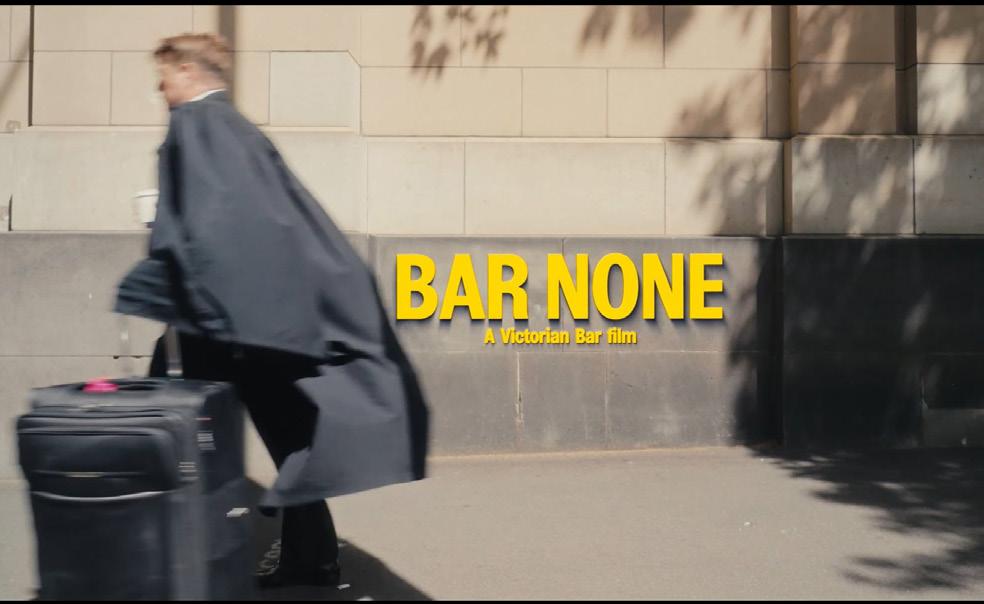
The Committee has:
» Launched the film “Bar None” (a project of the 2023 Health and Wellbeing Committee). The launch took place over a breakfast and was well attended including by members of the judiciary;
» Addressed the March Bar Readers on health and wellbeing at the Bar, including outlining resources available to members (the film Bar None was also played). Bernadette Healy also discussed strategies to assist in managing the
transition to the Bar. The Committee has been invited to speak to the September 2024 Bar Readers on the first day of their course, demonstrating that health and wellbeing is a matter of high importance to new members as they move from previous careers/studies and embark upon life at the Bar;
» Published new material on the Health and Wellbeing Portal, including a piece on feeling overwhelmed by Bernadette Healy;
» Held meetings regarding the formulation of modules for members on vicarious trauma;
» Held a “town hall” style meeting and formed a crosscommittee working group on the challenges faced by parents and carers at the Bar, and for those looking to return to the Bar;
» Identified how health disclosures may impact on members’ insurance coverage and liaised with the Insurance Committee for advice and assistance;
» Held a well-attended joint seminar with the Criminal Bar Association on managing stress in the early years at the Bar, with thanks to Chris Brydon, Ashlea Patterson and Bernadette Healy; and
» Featured in the latest issue of Bar News, which has a health and wellbeing theme.
There are numerous seminars on the agenda for the remainder of 2024:
» The Committee is in discussions with the Equality and Diversity Committee and the New Barristers’ Committee about a joint education session on the topic of cultural safety and inclusivity for gender diverse and LGBTIQ+ members (language, behaviour and environment). It is hoped that the judiciary will be involved as well as organisations and a psychologist with appropriate expertise;
» Together with the Equality and Diversity Committee, and after receiving the results of an initial survey about the possible impact of neurodiversity, a seminar will be developed in which greater awareness, skill and needs/ benefits will be discussed;
» Together with the Ethics Committee, we are planning a joint education session on difficulties in dealing with complex and vulnerable clients; and
» We are working with organisations that have expertise in cardiac health and hypertension and will be looking to hold an education session in September 2024 about these issues.
Appreciating that maintaining good physical health is an important aspect of good overall health, and with special thanks to Roisin Ryan, we organised for a SiSu Health Station to be made available for members in the foyer of Owen Dixon Chambers East. This allowed members to undergo a quick, free health check of various risk factors for heart disease and diabetes with a prompt for those who fell into defined categories to consult with their general practitioner. The anonymous results of SiSu have been
consolidated and will be published so that members can understand what health issues were identified. The SiSu results have prompted us to also consider organising a regular group exercise session that members can opt-in to if and when they have capacity.
The first reflective practice program, in which several members were trained by psychologists Bernadette Healy and Tom Evans on the skills of reflective practice and debriefing, was completed in May 2024. The feedback from members who engaged in the program was very positive. An education session will be held in the second half of this year by some of those members and their skills shared. It is anticipated that members who have completed the program will be able to offer members support by engaging with them in reflective practice. It is intended that the program will be run again with a new cohort of members.
It has been a busy and productive year, and the Committee is grateful to the support provided by Bar Council and to all those people who have contributed to improved health and wellbeing at our Bar.
Committee as at 30 June 2024: Dan Star KC (Chair), Eugenia Levine (Deputy Chair), Emily Latif (Secretary), Rohan Millar, Adam McLean, Agusia (Aggy) Kapitaniak, Joanna Davidson, Evelyn Tadros, Dr Adam McBeth, Julia Kretzenbacher, Julie Buxton, Harry Lewis, Shanta Martin, Bryn Overend, Nikolas Barron and Gemma Cafarella (Bar Council Representative).
Committee in the 2023 calendar year: Dan Star KC (Chair), Dr Felicity Gerry KC (Deputy Chair), Alexander James-Martin (Secretary), Anthony Krohn, Rohan Millar, Agusia (Aggy) Kapitaniak, Stella Gold, Eugenia Levine, Evelyn Tadros, Dr Adam McBeth, Julia Kretzenbacher, Julie Buxton, Shanta Martin, Julian Murphy and Alistair Pound SC (Bar Council Representative).
The Committee’s remit
The Human Rights Committee (HRC) is one of the Bar Council’s longest-standing policy advisory committees.
As recognised in the Charter of the HRC effective from 15 December 2017 (HRC Charter), the HRC “reflects the role played by respect for human rights in upholding the Rule of Law, one of the fundamental values to which VicBar is committed, and the important part that lawyers can play in the recognition and protection of human rights.”
In accordance with the HRC Charter, the central task of the HRC is to “raise for attention issues that affect the liberty and dignity of all persons where those issues engage human rights.”
The HRC focuses on existing legislation and responding to calls for submissions on law reform issues engaging human rights, which mainly raise systemic issues within Victorian and Commonwealth jurisdictions. It generally does not address individual cases, unless it raises systemic issues.
The HRC Charter establishes that the HRC has a particular focus on issues affecting access to justice, equality before the law, freedom from discrimination and the arbitrary exercise of power, and adherence by Government at all levels to widely accepted human rights norms, including those established by the International Conventions to which Australia is a signatory.
The HRC met regularly in person, by video conference and by circulating material outside of scheduled meetings. Focussing on the 2024 calendar year, the HRC has so far met on 6 March, 9 May and 13 June 2024. Further meetings are planned for 2024. Substantial work is undertaken by the HRC outside of its formal meetings, particularly by submission writing raising human rights issues.
Since late 2023, the HRC has contributed to the following submissions by VicBar:
The HRC, jointly with the Public Law section of CommBar, contributed to a submission by VicBar to the Integrity and Oversight Committee’s Inquiry into the Operation of the Freedom of Information Act 1982 (Vic).
The HRC contributed to a submission by the Bar to the Law Council of Australia (LCA) for the Senate Legal and Constitutional Affairs Legislation Committee in relation to its inquiry into the provisions of the Crimes Amendment (Strengthening Criminal Justice Response to Sexual Violence) Bill.
The HRC, jointly with the Indigenous Justice Committee, contributed to a submission by the Bar to the LCA for the Joint Standing Committee on Aboriginal and Torres Strait Islander Affairs’ inquiry into economic self-determination and opportunities for First Nations Peoples.
The HRC, jointly with the Equality and Diversity Committee, contributed to a submission by the Bar to the LCA’s Public Leadership Statement on Sexual Harassment and Discrimination and National Model Framework on Sexual Harassment in the Legal Profession.
The HRC contributed to a submission to the LCA by a working group established by the Bar in respect of the statutory review of the Online Safety Act 2021 (Cth).
The HRC relies on the voluntary work of its members for drafting these submissions. The HRC has received many further referrals and anticipates additional requests to it to be forthcoming. It is intended that the HRC will draft further submissions in 2024 on
those issues it has the expertise and capacity to comment upon. It is not possible for the HRC to respond to each referral that it receives.
The HRC also undertakes other activities. On 22 February 2024, Dan Star KC (Chair) and Eugenia Levine (Deputy Chair) attended a meeting with the Bar Policy team and representatives of the LCA.
On 5 April 2024, Dan Star KC (Chair), Eugenia Levine (Deputy Chair), Bryn Overend and Harry Lewis (HRC representatives) attended a meeting with Nawaar Hassan (representative of the Bar Council Strategic Plan Working Group) to provide input into the Strategic Plan from the perspective of the HRC.
The HRC is currently making arrangements for a Bar CPD to be presented on 29 October 2024 to bring attention to members of the Bar of relevant human rights issues.
Committee as at 30 June 2024: The Honourable Robert Redlich AM KC (Chair), Sally Flynn KC, Colin Mandy SC (Bar Council Representative), Patrick Doyle SC, Ruth Shann SC and Rachel Walsh.
The Indictable Crime Certificate (ICC) is an accreditation and quality assurance program overseen by the Indictable Crime Certificate Committee (ICCC) on behalf of the Victorian Bar in conjunction with Victoria Legal Aid.
Barristers seeking ICC accreditation complete an application that the ICCC evaluates and determines the requirements each applicant must fulfil before being eligible to be granted the ICC accreditation. Most applicants undertake a full-day Jury Skills Workshop, an Advocacy Assessment Workshop and an online ICC Knowledge Test. An ICC Certificate is issued when a barrister has competently completed these prerequisites.
To maintain the ICC accreditation and be eligible to renew it at the end of the three years, ICC holders must complete five CPD points annually from the program of CPDs approved by the ICCC from time to time. A noteworthy change to the cost incurred by barristers in renewing their ICC accreditation was implemented in May 2024. On the Committee’s recommendation, the Bar Council approved a reduction in the renewal fee from $300 to $50, which will reduce the cost burden of retaining accreditation, particularly for the junior criminal members of the Bar.
In the 2023-24 financial year, the ICCC received 12 new applications, bringing the total number of applications to 401, and 54 ICC holders renewed their accreditation. During this period, the Committee approved issuing ICC certificates to 15 barristers who completed all the ICC assessment requirements.
Over the last year, the Committee considered a cultural competency training requirement as part of the ICC program arising out of the findings of Coroner Simon McGregor into the death and inquest into the passing of Veronica Nelson delivered on 30 January 2023. The Committee has provided its recommendation to the Bar’s Chair of the Veronica Nelson Working Group, Richard Dalton KC.
The Committee also reviewed the ICC Knowledge Test content as part of its quality assurance responsibility for the program to ensure it satisfied requirements. This followed Dr Jason Harkess’ revision of the Test in early 2024 to reflect changes in the law since it was written in 2019.
The Jury Skills Workshops and Advocacy Assessment Workshops would not have taken place without the support of those who volunteered their time to support the delivery of these activities outside of court sitting hours. In this regard, the Committee greatly appreciates the support of the Honourable Chief Judge Peter Kidd of the County Court of Victoria for permitting the Jury Skills Workshops to be held at the County Court in December 2023. The Committee also acknowledges and thanks his Honour Judge O’Connell, her Honour Judge Karapanagiotidis, his Honour Judge Sexton, and their Associates for their time to run three moot jury trials on a Saturday in December 2023. The Committee is also grateful for the excellent assistance of the Director of Criminal Division Administration – Mr Jason Goliszek, and the Senior Executive Assistant to Chief Judge Kidd –Ms Genevieve Daffy, in coordinating Court arrangements.
The Committee is indebted to his Honour Justice Paul Coghlan AO for his ongoing contribution and support of the ICC program by facilitating 10 ICC Advocacy Assessment Workshops in 2023-2024.
The Committee acknowledges that these workshops could not have taken place without the involvement of a large number of volunteers, mostly law students, who played the essential roles of the accused, witnesses or jury members, which facilitated the jury trials and assessment workshops to be a successful development experience for our barristers.
The Chair also acknowledges the valuable contribution and work undertaken by each member of the Committee, including Colin Mandy SC (Vice-President, Victorian Bar), Sally Flynn SC, (Chair, Criminal Bar Association), Patrick Doyle SC, Ruth Shann SC and Rachel Walsh as well as the Committee members whose term concluded in October 2023 including Peter Chadwick KC, David Hallowes SC (Exofficio) and Richard P Dalton KC.
Finally, the Committee acknowledges and thanks the Victorian Bar Education staff, Michelle James (Education Manager) and Golam Kibria (Education Coordinator), for supporting the work of the Committee.
Committee as at 30 June 2024: Timothy Goodwin (Co-Chair), Serena Armstrong (Co-Chair), Christopher McDermott (Secretary), Shivani Pillai, Jeremy Whelen, Raj Bhattacharya, Julie Buxton, Kate Stowell, Rabea Khan, Dr. Julian Murphy, Cal Viney, Gabriel Chipkin, Nicolas Muniz Saavedra and Candice Jackson.
Retired members: The Committee thanks those members who retired during the year: John Heard, Sophie Coulson, Duncan Robertson, Daniel Nguyen, Julia Kretzenbacher and Nick Boyd-Caine.
Judicial consultants: The Committee thanks the following judicial consultants for their valued and continuing support: Justice Rita Incerti (Victorian Supreme Court), Justice Mordecai Bromberg (Federal Court), Justice Michael O’Bryan (Federal Court) and Judge Arushan Pillay (County Court).
Bar office support: The Committee thanks the essential assistance from Bar Office staff across the year, without which the IJC would struggle to meet its commitments under the Reconciliation Action Plan (RAP) and to respond to the high number of submissions. Special thanks go to Fernando Gallieto, Jodie Hill and Kai Li Zhu for participating in IJC and RAP committee meetings and for providing administrative, strategic and substantive support. Thanks also to Golam Kibria (Education) and Roisin Ryan (Communications).
Acknowledgements and thanks
The Committee is delighted to acknowledge the achievements of Candice Jackson, the latest Indigenous barrister to join our Bar. Candice signed the Roll on 19 October 2023, joining other recent Indigenous members Sophie Coulson (20 October 2022), Greer Boe (5 May 2022) and John Heard (7 May 2020). There were six First Nations practising members of our Bar in the previous year, two of whom are members of the Committee as at June 2024.
The Committee wishes to extend its unending debt of gratitude to the magnificent work, in particular, of John Heard, who whilst a member of the Committee championed and organised the Indigenous mentoring program. The Committee has no doubt that the number of First Nations barristers at the Victorian Bar will grow, to a large degree, as a result of John’s outstanding leadership and support of First Nations lawyers.
Members of the Committee contributed to a demanding year of activities, including mentoring and support for Indigenous legal practitioners to support their journey to, and continued practice at, the Victorian Bar. Other core activities of the Committee included organisation and presentation of Continuing Professional Development
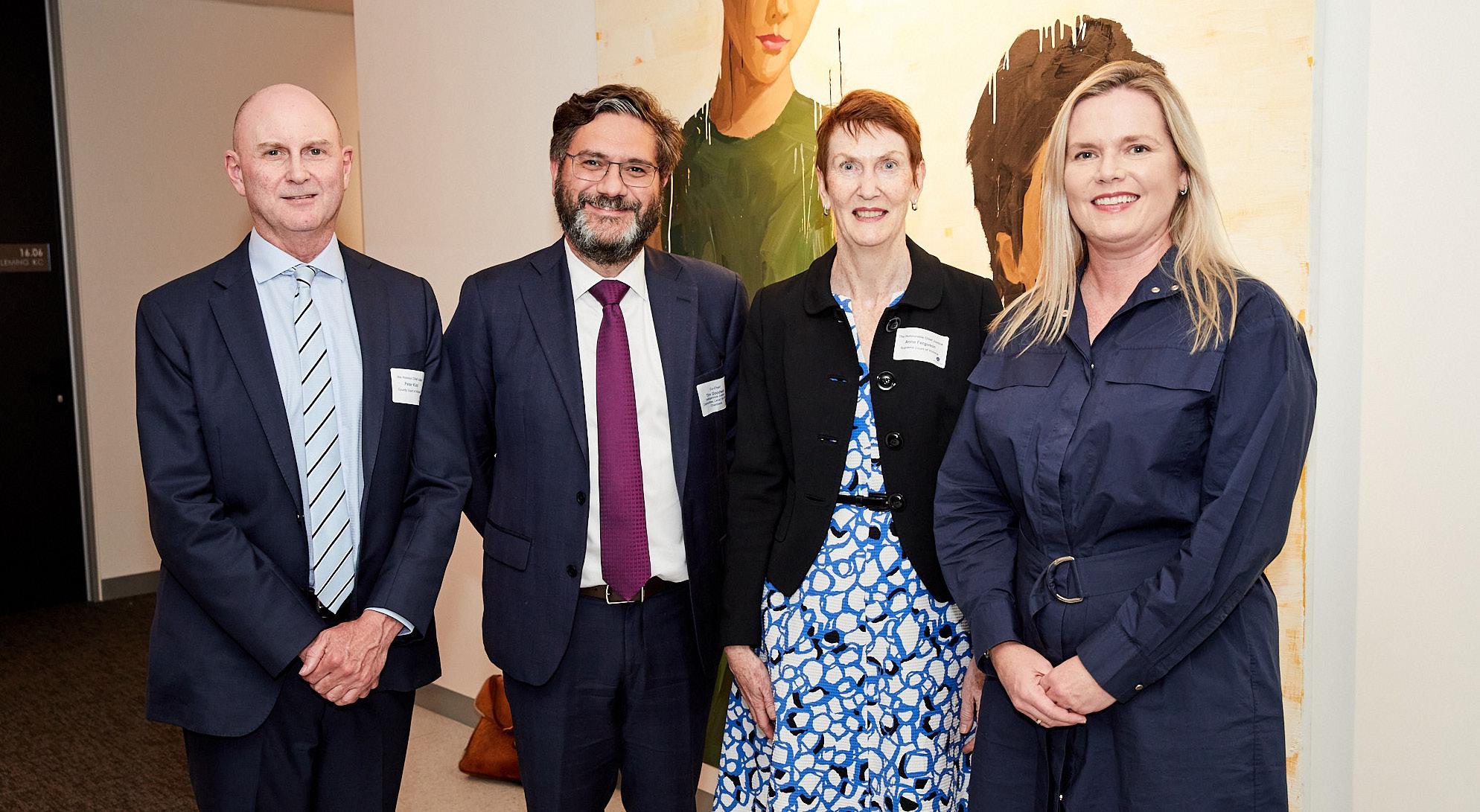
sessions (CPD), submission writing and stakeholder engagement, implementation of the Reconciliation Action Plan (RAP) and commencement on the development of the next RAP, supported by the Committee’s RAP Working Group.
During 2023, current and former members of the Committee contributed a great deal of time, together with colleagues, educating members on the Voice to Parliament Referendum. The Committee is proud of the way it, and the Bar through the work of its President, endeavoured to maintain a calm and respectful dialogue in the face of heated discussion and publicity. The hurt caused to First Nations people during parts of the referendum debate has caused significant damage, which the Committee has focused on repairing. The Committee has sought to do so primarily through renewed efforts to engage and support First Nations people interested in or with relationships with the Bar.
The Committee presented a number of CPDs over the last 12 months. Most recently, it presented a CPD entitled: Treaty, yeah? Treaty, how? – Victoria’s Legal Framework for a Treaty with First Nations Peoples, hosted at Koiki Mabo Chambers with speakers Rueben Berg (Co-Chair, First Peoples’ Assembly of Victoria), Jidah Clark (Chair, Treaty Authority) and Serena Armstrong (Co-Chair, IJC). The event was chaired by Cal Viney (Member, IJC).
The CPD was extremely well attended. Attendees were briefed about the significant legislative architecture now in
place in Victoria for the commencement of negotiations for both state-wide and traditional owner treaties in Victoria.
Judge Caitlin English, Vice President of VCAT and Chair of the VCAT Professional Development and Well Being Committee, has requested the Committee present the CPD as part of the VCAT CPD program run for its members (there are presently 220 VCAT members).
The Committee notes that Treaty is a significant law reform program, with treaties capable of covering a wide array of subject matter far beyond those matters barristers may be familiar with via existing native title and/or traditional owner settlement processes. It commends the CPD to any barristers interested in learning more about treaty in Victoria, and the groundbreaking roles of the First Peoples’ Assembly of Victoria and the Treaty Authority respectively. It is available for viewing on the VicBar website.
The Committee has, throughout the last 12 months, made contributions to a number of submissions the Victorian Bar has made to a myriad of law reform committees and inquiries. This has included law reform matters as diverse as:
a. the Spent Convictions Act 2021 (Vic) Review;
b. the Bail Amendment Bill 2023 (Vic);
c. the Statutory Review of the Online Safety Act 2021 (Cth); and
d. the development of stand-alone Commonwealth Indigenous Cultural and Intellectual Property (ICIP) legislation.
In addition to law reform matters, the Committee made contributions through:
» responding to the Yoorrook’s Notice to Produce as part of the Truth Telling and Treaty Royal Commission; and
» preparing a memorandum for the Bar’s Strategic Plan Working Group to inform its development of the Bar’s latest Strategic Plan, complemented by meetings between Tim Goodwin, Serena Armstrong (for the IJC) and Rachel Doyle SC (for the Working Group).
The Committee notes the Indigenous mentoring and clerkship programs for 2024 were a huge success.
The mentoring program pairs Indigenous law students and graduates with two mentors: a judicial mentor and a barrister mentor. Lily Ireland, an ANU student who participated in the IJC mentoring program with Dr Laura Hilly as her mentor, was recently awarded a Rhodes scholarship. There is no doubt that the calibre of students participating in this program is extremely high. It is frequently reported by mentors that the program is mutually beneficial, being a crucial two-way learning experience and the opportunity for senior members of the Bar and judiciary to enhance their cultural awareness and their connections with First Nations people.
The clerkship program has clerks spend four weeks each rotating through placements at the Victorian Bar, the Supreme Court, the County Court and the Federal Courts. The feedback from the clerks, barristers and judicial officers involved is consistently positive, with many developing ongoing connections and support networks. The Committee acknowledges and thanks all involved in the programs.
The clerkship and mentoring program is a vital part of ensuring First Nations people develop insight, connections and opportunities to support a successful career in law. It is an essential step in creating a culturally safe environment in which they can explore all the Bar has to offer, with long term connections forged that facilitate their being called to the Bar. Jidah Clark, Co-Chair of the Treaty Authority, was a former clerk and reflected favourably on the experience during the Treaty CPD.
The Committee is currently working with the Supreme Court of Victoria, County Court and Federal Court to finalise a Memorandum of Understanding that documents the arrangements between the Bar and the courts in providing the annual IJC clerkship for up to six First Nations tertiary students.
The 20 th anniversary gala event for Tarwirri (Indigenous Students Network) was held earlier this year. Tim Goodwin (Bar Council) was one of the speakers for the evening. Elizabeth Bennett SC (Vice President, Bar Council) and a number of current and former IJC members attended. Mention was made at the event of the long support from the Bar over the years.
The Committee is committed to working with many other organisations, including Djirra, Victoria Legal Aid, the Victorian Aboriginal Legal Service and Tarwirri.
Key issues in the year ahead
The Committee foreshadows the following as key issues likely to require its input over the next 12 months.
Development of the new RAP: The development of the Bar’s third RAP (its second at the “Innovate” level of the framework) is a high priority for the second half of this year. Input has been sought through a roundtable held earlier this year and informal consultation and drafting of the new RAP has commenced. The members of the RAP Working Group are Tim Goodwin, Serena Armstrong, Shivani Pillai, Cal Viney and Candice Jackson.
Cultural Competency Framework: Julie Buxton and Tim Goodwin of this Committee, together with the Bar Council, Veronica Nelson Working Group, Legal Services Board and Commissioner and others have worked hard to introduce a framework for cultural competency/awareness training, following the Veronica Nelson Inquest findings. The Bar has responded to the recommendations of the Veronica Nelson Working Group and agreed to a timeline for action in 2024. This program is well underway for forthcoming Readers’ Courses. The next 12 months will be an important period for developing how the training will be rolled out for barristers at all experience levels. The Committee has fielded multiple inquiries from junior and senior members of the Bar keen to undertake cultural competency training. It is an area seen by many as key to them fulfilling their role as counsel to the utmost of their abilities and in appropriately responding to and meeting their clients’ needs.
Support for Djirra: Djirra has been working with the Committee for more than 12 months to address issues it experiences in finding Barristers to represent its clients and ensuring that briefs are not returned at late notice.
NAAJA Pro Bono Program: The Victorian Bar has a long history of providing pro bono and reduced fee work to Aboriginal clients in the Northern Territory. The Committee, with the Criminal Bar Association, is looking to develop a formal scheme whereby barristers at the Victorian Bar who have appropriate expertise and experience go to the Northern Territory for a short period on a roster to assist the Northern Australian Aboriginal Justice Agency (NAAJA) to provide legal services. NAAJA have, over a long time, experienced difficulties in meeting the high demand for its services. This year the need has been especially pressing, as indicated by the joint communication from the Australian Bar Association, the Law Council of Australia and the Northern Territory Bar Association for legal assistance from barristers.
Committee as at 30 June 2024: The Committee was chaired by His Honour Judge Michael Wise until his appointment to the County Court in January 2024. Since that time, the Committee has been chaired by Emma Poole (formerly Deputy Chair). Its other members are Brenton Devanny, Sam Prendergast, Bridget Slocum, Sanjay Schrapel, Liam McAuliffe, Stephen Bunce, Olivia Cameron and Elizabeth Bennett SC (Bar Council Representative).
The Committee wishes to acknowledge Judge Wise’s considerable contribution to the work of the Committee.
During this term, the Committee’s work has focused on issues relating to cybersecurity and artificial intelligence tools as they affect barristers. Additionally, the Committee has continued its core projects aimed at increasing the digital literacy and capability of the Bar and has contributed where possible to the Bar’s submissions on various issues.
As of June 2024, the Committee now has Working Groups focussed on cybersecurity, artificial intelligence and reverse mentorship.
This year, the Committee continued its engagement with BCL IT, including regular briefings on new and forthcoming initiatives from BCL IT and the redevelopment of the Bar’s website. The Committee has contributed to the Bar’s review of its Strategic Plan and also a number of the Bar’s contributions to submissions by the Law Council of Australia including in relation to:
» Senate Select Committee on Adopting Artificial Intelligence;
» Statutory Review of the Online Safety Act 2021; and
» Australian Legal Education in 2030 and Beyond (CALD project).
The ITC has run several CPD sessions this year:
» the second of a two-part CPD series on artificial intelligence focussing on ‘AI Legal Tools’;
» the first of a two-part CPD series on cybersecurity. This first CPD, coordinated with members of the Bar’s Ethics Committee, included a presentation by the Victorian Legal Services Board on the new Minimum Cybersecurity Expectations. The second part of the series, to be coordinated with the Women Barristers’ Association and BCL IT, will explore practical steps barristers can take to reduce the likelihood of experiencing a cybersecurity incident (and the resultant harm to their clients, instructors and themselves); and
» a further CPD providing updates on artificial intelligence is also being explored for later in the year.
The Committee worked with the Victorian Bar News Committee on various articles in the Summer 2023 edition, which had a principle focus on artificial intelligence. The issue also included an article coordinated by members of the Committee on barristers’ obligations of confidentiality and
The Committee also intends to continue with its two core projects in the coming year: the Reverse Mentorship Scheme and the Digital Courts Survey. The Committee’s Reverse Mentorship Scheme ran with a new intake from June 2023. The Reverse Mentorship Working Group, led by Sanjay Schrapel, is currently preparing for the next intake. The scheme pairs senior barristers who wish to develop specific digital skills or improve their knowledge of particular tools with barristers under five years call who volunteer as mentors. The next intake will allow for pairs to self-nominate and will have a particular focus on cybersecurity.
Committee as at 30 June 2024: Roslyn Kaye SC (Chair), John Tesarsch (Deputy Chair), James Barber KC, Matthew Hooper, David Klempfner, Darren Ferrari, Joel Harris and Mark Robins KC (Bar Council Representative).
In 2023-24, the Insurance Committee worked with the Health and Wellbeing Committee to explore potential options for an income protection insurance scheme for barristers with more limited disclosure requirements than other commercial offerings. The Insurance Committee liaised with the Bar Council, and the Bar Council will further investigate the matters which the Committee raised with it.
The Insurance Committee continued its consideration of options for cyber insurance for barristers. Following information provided to the Bar Council by the Committee, the Bar will engage the services of its insurance broker to advise on suitable members’ cybersecurity schemes. The Insurance Committee will consider those recommendations when they become available.
In November 2023, the Committee held a CPD for barristers on cyber risk and cyber insurance.
The Insurance Committee continues to review annually proposed wording changes by the LPLC in relation to its professional indemnity insurance for barristers. It also requested again that the President remind barristers of the gaps in the LPLC insurance coverage and the need to consider top-up insurance.
The Insurance Committee intends to continue to work with the Bar Council in respect of the above matters.
Committee as at 30 June 2024: Peter O’Farrell SC (Chair), Albert Dinelli KC (Deputy Chair), Remy van de Wiel KC (Ex-Officio), Michael Whitten KC, Sarah Thomas, Maya Rozner, James Doherty, Carrie Rome-Sievers, Susan Gatford, Janine Gleeson, Sophie Molyneux, Elizabeth Brumby, Thomas Ellicott and Ffyona Livingstone Clarke (Bar Council Representative).
The IATC’s remit
The International Advocacy Training Committee (IATC) organises and delivers advocacy training in Pacific nations.
The Charter of the IATC provides that the role of the IATC includes:
» organising and delivering advocacy training to members of the legal profession of other countries;
» assisting with the provision of mentoring to members of the legal profession of other countries; and
» together with the Readers’ Course Committee and the Education and Professional Development Executive, facilitating the participation by members of the legal profession of other countries in the Victorian Bar Readers’ Course.
Intensive Advocacy Training Program in Port Vila, Vanuatu
On 25 to 27 March 2024, the IATC presented a threeday appellate advocacy workshop for approximately 35 government-employed lawyers in Port Vila, Vanuatu. The workshop was arranged through the Palladium Group which is currently administering the Vanuatu Australia Policing and Justice Program, funded by the Department of Foreign Affairs and Trade.
The barristers who delivered the workshop were Remy van de Wiel KC, Sarah Thomas (Team Leader), Susan Gatford, Samuel Burt, Alex Campbell and Elizabeth Brumby.
The workshop was held at the Conference Centre located in the Melanesian Hotel in Port Vila. The opening of the workshop was attended by the Chief Justice of the Supreme Court of Vanuatu, the Honourable Vincent Lunabek, the Public Solicitor and representatives of the Australian High Commission to Vanuatu. The Public Prosecutor, who has been a strong supporter of the IATC’s workshops in the past, sent his apologies as he had taken leave in advance of the Easter break. Representatives from the High Commission also attended sessions during the workshop, showing a keen interest in the work that the Victorian Bar is doing in the region.
The workshop was attended by 30–40 lawyers from various public agencies in Vanuatu including the Office of Public Prosecutions, the Public Solicitors’ Office (similar to Legal
Aid), the Women’s Law Service, the State Law Office and the Ombudsman’s Office.
On the first day of the program, the team was fortunate to have the assistance of Justice Viran Treif of the Supreme Court of Vanuatu, the first and, so far, only female indigenous judge in Vanuatu.
The team presented two appellate problems – a sentencing problem developed by Sarah Thomas, Remy van de Wiel KC and Janine Gleeson, and a medical negligence problem previously developed by Maya Rozner and Tom Ellicott and adapted for use in Vanuatu by Elizabeth Brumby. Lawyers “on the ground” in Vanuatu assisted and consulted with the development and adaptation of both problems to ensure that they were locally appropriate and addressed problems that had been observed in local appellate advocacy.
The closing session was attended by the Director General of the Ministry of Justice and Community Services, Mr Arthur Faerua, who delivered an inspiring speech to all participants.
The IATC has received positive feedback from our colleagues in Vanuatu, including from the Chief Justice (who met with Remy van de Wiel KC in person the week following the workshop). The Chief Justice expressed gratitude to the Victorian Bar for its work in Vanuatu and stated he has observed the improvement in the performance of government-employed lawyers which has followed the IATC’s workshops.
‘Train the Trainer’ Program in Melbourne – 29 July to 9 August 2024
From 29 July to 9 August 2024, the IATC will deliver the Train the Trainer Program. The IATC has partnered with the Papua New Guinea Centre for Judicial Excellence, the Pacific Centre for Judicial Excellence, the Pacific Justice Sector Program and the Australian Government, the AustraliaPapua New Guinea Law and Justice Partnership and the Department of Foreign Affairs and Trade to deliver a training program, hosted by and at the Victorian Bar. It is designed to build capacity within the legal profession of Pacific nations (in particular, Papua New Guinea and the Solomon Islands) in the field of advocacy training for court appearances.
The Program will comprise an intensive advocacy training program for Pacific nation delegates combined with observations of court advocacy in Victoria and a shadowing and mentoring program with Victorian barristers. Delegates will be drawn from Papua New Guinea (PNG), the Solomon Islands, Vanuatu, Tonga and Fiji. The intention is to build capacity within the IATC’s partner countries with trained advocacy trainers who will then be able to apply those skills to teaching advocacy in their home countries.
The Program will have the following structure:
» Prior to attending the intensive advocacy workshops in Melbourne, trainees will be required to watch a series
of four video lectures remotely, including completing practical exercises.
» On arrival in Melbourne, trainees will begin the workshop with a refresher on advocacy skills for court proceedings including opening, examination-in-chief, crossexamination, closing submissions and legal argument.
» Trainees will be introduced to the Victorian Bar method of advocacy that is taught in the Readers Course and delegates will participate in practical exercises.
» Trainees will train with experienced instructors to develop their skills using volunteers from the Victorian Bar and each other.
» As part of the workshop, trainees will spend time in Melbourne courts and shadowing Victorian barristers in order to observe advocacy skills as practised in both criminal and civil jurisdictions in Victoria.
» At the end of the course, attendees will be able to conduct advocacy training of junior lawyers. Trainees from PNG will complete the ToT Program upon attendance at the PNG Legal Training Institute later in 2024. Further, trainees who complete the Program will be added to the role of accredited Pacific Nation Victorian Bar Advocacy Trainers maintained by the IATC. Accredited trainers will then be called upon from year to year to assist with the task of capacity-building in their local profession and will receive invitations to continue ongoing advanced advocacy training.
Intensive Advocacy Training Program to the Legal Training Institute in Port Moresby, PNG
The annual IATC intensive advocacy training program to the Legal Training Institute (LTI) in Port Moresby, PNG, will take place in the second half of 2024.
The Victorian Bar has been involved since the mid-1980s in the support for law and the administration of justice in PNG via the teaching of courtroom advocacy and ethics. The first team that travelled to Port Moresby was led by the late Robert Kent QC.
Post-graduate training is delivered by the LTI under the auspices of the PNG Centre for Judicial Excellence before admission as lawyers of the Supreme and National Courts of PNG. Successful completion of the LTI is a pre-requisite to admission to legal practice in PNG.
The annual workshop at the LTI is intensive, both in terms of the content and the effort required from all of those who contribute to and participate in the program. The cohort is typically comprised of 80 to 90 students.
Last year, this training was delivered to 150 students together with a Judicial Forum (with great guidance and support from the Honourable Chris Maxwell AC (former President of the Victorian Court of Appeal), the Honourable Peter Riordan KC (former Justice of the Supreme Court of Victoria) and Judicial Registrar Ros Avis (of the County Court)) and an Advanced Advocacy Program delivered to the Office of the Public Solicitor in PNG.
Planning for the 2024 LTI is ongoing.
Two applicants from PNG have been offered places in the 2024 September Readers’ Course (Benjamin Yalehen and Jessy Biar).
The Victorian Bar’s Readers’ Course has taught numerous PNG practitioners courtroom techniques, written skills, ethics and conduct of legal practice as an advocate, assessed as a precondition to signing the Roll of Counsel, in addition to the multiple advocacy skills programs delivered in PNG by the Bar’s International Advocacy Training Committee. Upon successful completion of the Readers Course, overseas readers are invited to sign the Roll of Overseas Practitioners.
The further development of the IATC Teaching Manual has taken place this year. The purpose of the Manual is to capture the collective knowledge of the IATC and its various programs so that each year, there is a repository of the collective knowledge that can be drawn upon by those conducting the programs from year to year.
Key information about the IATC and its function, followed by country information for each relevant country continues to be added to the IATC Teaching Manual.
The Manual is maintained by the IATC in a digital format, to be added to and updated yearly.
In addition to these activities, the IATC is hoping to deliver intensive advocacy training programs in the Solomon Islands and Tonga during 2024. Whether these programs are able to go ahead in 2024 is dependent on the IATC’s ability to secure funding from external sources. These efforts are ongoing.
Committee as at 30 June 2024: Dr Paul Vout KC (Chair), Peter Willis SC (Deputy Chair), Dr Steven Stern (Secretary), Richard Brear, John Gordon, Romesh Kumar, Tom Smyth, Lucy Line, Andrew Burnett, Nicholas Bird, Peter Turner, Christopher Hooper, Angus Mackenzie and Sarah Keating (Bar Council Representative).
The Committee thanks long term member and previous Bar Council Representative, Nawaar Hassan, who retired in December 2023.
The Committee meets formally four times a year, with Law Library of Victoria (LLV) Director, Laurie Atkinson, and Manager of Library Reference Services, Belinda Schembri, routinely invited to Committee meetings. Working bees are also conducted from time to time.
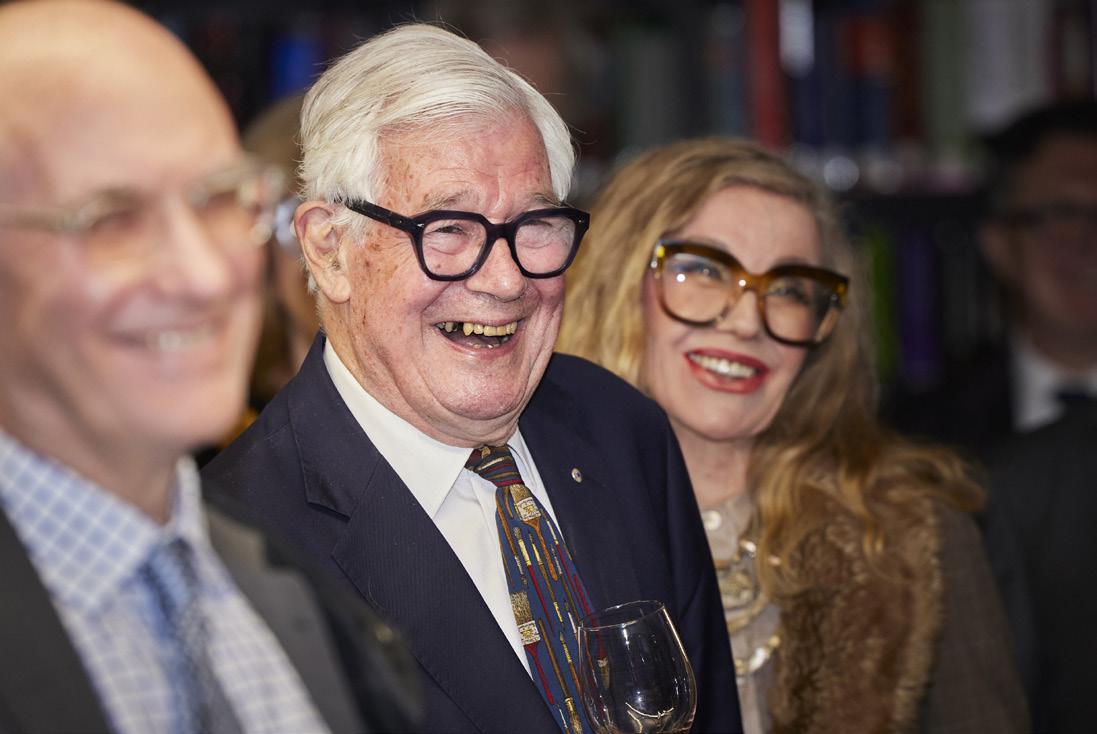
Working closely with the LLV, the Committee provides management of the Richard Griffith Library (RGL) and the library services provided in-house to barristers. The Committee oversees the Bar’s collection of hard copy law reports, textbooks and journals, available at all hours to members of the Bar. These are housed in the RGL on the first floor of Owen Dixon Chambers East, in the adjoining Neil McPhee Room, Bar Council Chambers and the Essoign Club, as well as in ‘branch libraries’ within various buildings, hosted courtesy of the tenants of the relevant floors and BCL. These branches are currently on Owen Dixon Chambers East 9th Floor, Owen Dixon Chambers West 6th and 12th Floors, Brian Bourke Chambers 5th Floor and Dawson Chambers Ground Floor.
Additionally, in co-operation with the LLV, the Committee provides access to a wide and increasing range of digital legal resources (including three computer terminals in the RGL and access to the full suite of electronic resources available in the Supreme Court Library) and provides training and legal research assistance.
Staff from the LLV continue their part-time physical presence in the RGL: Nadine Mann at RGL on Wednesdays from 9am to 11am, and Alissa Duke on Thursdays from 1pm to 3pm. This is provided pursuant to the service agreement between the Bar Council and the LLV (LLV Agreement) renewed for three years on 1 July 2021 and due for further renewal on 1 July 2024 (New LLV Agreement).
Using the annual budget for purchases provided under the LLV Agreement, the Committee again substantially updated and extended the textbook collection in this reporting period, with input from specialist practice associations of the Bar, the Committee and LLV. Deselected reports and texts were either added to the Heritage Collection in the Bar Library Annexe (if of heritage value) or offered to incoming Readers. The LLV’s current catalogue of the Victorian
Bar collection of books and law reports can be searched or browsed online on the Law Library of Victoria website.
13 CPD sessions were held by the LLV for barristers during the reporting period, with 164 barristers attending. A further 23 LLV CPD sessions were open to all members of the legal profession to attend.
In addition to up-to-date legal resources, the Committee is the custodian of many valuable and historic texts and sets of law reports, many donated by their previous owners, being distinguished members of the Bar and the judiciary. We record gratefully the acceptance of such donations and other records, and the contributions of legal publishers.
With pressure on shelf space as BCL refurbishes floors of chambers, and concerned about the storage and protection of donated items (including items of Bar heritage value), the Committee again records its appreciation of BCL providing two rooms (ODE 05024 (“Heritage Room”) and 0525 (“Reserve Sets Room”)) which together serve as the ‘Bar Library Annexe’. The Committee thanks BCL and the Bar Office - in particular, Miranda Tulloch, Corporate Services Manager - for their assistance throughout the year, and the Bar Office for funding the provision of free photocopying in the RGL, and for providing administrative and corporate services to the Committee as needed. The Committee also thanks the manager of the Essoign Club, Marijana Hegedis, for enthusiastically hosting the lending collection in the Club. The Committee is pleased that members of the Bar can browse and borrow from the Bar Library’s lending collection while relaxing in the Essoign Club.
With the assistance of the Bar Office, in April and May 2024 the Committee conducted an electronic survey of members of the Bar with a view to ascertaining current usage of the Bar Library’s resources, future needs, preferences and improvements. Fifty three members of the Bar responded to the survey. Some of the key results of the survey included:
» frequency of use of the Bar Library: 13.21% of respondents indicated that they used the Bar Library “Weekly or more often”. The largest response was “3 to 10 times a year” (32.08%), followed by “Monthly” (20.75%). 15.09% (or 8) of respondents responded that they “never” used the Bar Library.
» primary use: the largest response was “use textbooks”, followed by “access digital resources” and, in a close third place, “use law reports” (i.e. hard copy law reports).
» attendance by a Supreme Court librarian on duty in the Bar Library several times a week: awareness of this service was high, at almost 60%.
» assessment of performance: 38 of the 43 members rated the performance from good to excellent.
» possible changes: the principle suggestion to make using the Bar Library easier or more enjoyable was “better explanations as to how to access the digital resources” (67.50% of respondents), “book swap shelves to facilitate
sharing texts” (25%), and “better signage on how to find the Bar Library” (22.50%).
In broad compass, it appears that the Bar Library is providing the right mix of digital and hard copy resources having regard to the available space, budget, and demand. Members are significantly aided by the Supreme Court library librarians in attendance. The results of the Bar Library Survey will be used to develop a Bar Library Collection Policy to accompany the recently developed Bar Library Donations Policy. I thank Peter Willis SC, John Gordon and Lucy Line for their excellent work in designing the Survey.
Finally, the Committee wishes to pay particular thanks to two of its members: Dr Steven Stern, for preparing meeting agendas and comprehensive draft minutes without fail; and Richard Brear, for his tireless auditing of and tending to the collection.
Committee as at 30 June 2024: Christopher Brown SC (Chair), Aggy Kapitaniak (Deputy Chair), Kieran Hickie, Daniel Briggs, Reegan Grayson Morison, Matthew Meng, Angelo Germano, Antony Berger, Rebecca McCarthy, Bryn Overend, D’Arcy Hope, Bryony Seignior, Andrea Skinner (Bar Council Representative).
The New Barristers’ Committee (NBC) provides assistance and advice to Bar Council in relation to practising members under six years’ call. NBC considers issues of interest and concern to this cohort of barristers, provides support and assistance where possible, and organises CPDs and social events.
In the past year, NBC has hosted some successful social events, including the popular “Coffee with Silks” series, where junior barristers have a chance to meet and chat with silks in their practice area. This was held in November 2023 and a further series is planned for late October 2024. NBC also hosted a Trivia Night in late 2023, in conjunction with Law Institute of Victoria, which was well attended and enjoyed by all. The 2024 Trivia Night is being held in September.
Other events have been organised for the latter half of 2024, including an end-of-year lawn bowls night and the Junior Bar Conference (targeted to barristers under six years’ call) in conjunction with the CPD Committee, scheduled for 21 February 2025.
NBC has been active in organising CPD events targeted at barristers under six years’ call. In particular, NBC has commenced a new initiative for new Readers with a panelstyle Q&A session where new Readers and the immediate past Readers group (by then, around six months’ call) come together for a Q&A CPD where all questions can be asked in relation to commencing a practice at the Bar. This event is followed by a social event where the most recent Readers
and their immediate predecessors can mix and socialise. This inaugural event was held in May for the most recent Readers’ intake (with the Sep 2023 Readers) and another is planned for the September 2024 Readers (with the Mar 2024 Readers).
Another event planned for 2024 is “Meet the Magistrates”, organised in conjunction with the Magistrates’ Court. Several Magistrates will present to junior barristers about tips and tricks of appearances in the Magistrates’ Court. This will be followed by a social event where junior barristers can meet and interact with the Magistrates. The NBC thanks the former chair of NBC, Shane Lethlean, for his continued assistance in organising this event.
NBC has worked with other committees and elements of VicBar on important issues for barristers under six years’ call. NBC regularly communicates to the barristers under six years’ call of activities via a regular newsletter.
NBC is also in the process or reviewing and updating a document available to all new Readers titled “New Barristers’ Guide to the Bar”. This is being done in conjunction with the Readers’ Course Committee.
Committee as at 30 June 2024: Ian Horak KC (Chair); Paul Kounnas (Vice Chair); Robert O’Neill SC; David Kelsey-Sugg; Kieran Hickie; Timothy Farhall; Ms Rebecca McCarthy; Moya O’Brien (Bar Council Representative).
The Practice Development Committee (PDC) was established in 2022 with the aim of assisting members of the Victorian Bar, particularly junior members, to broaden their practice areas and to increase the quality and quantity of briefs.
The PDC is planning CPD sessions dealing with practice development in two primary areas, namely outwardly focusing and inwardly focusing sessions.
As to outward focusing development, the PDC has prepared a series of slides that will be used in educational seminars to instruct solicitors on briefing practices. The presentations will be targeted to solicitors and other briefers (primarily at regional and suburban law associations) to explain the value of the Bar. The series would then be rolled out with members of the Bar being giving an opportunity to present.
As to inward focusing development, the PDC has met with Matthew Harvey KC and Kylie Weston-Scheuber with the aim of rolling out a seminar on practice development directed to the junior bar. This is expected to take similar content to a session presented by Matthew and Kylie to the Readers’ Course. The PDC also has an internal practice development session organised for the end of the calendar year.
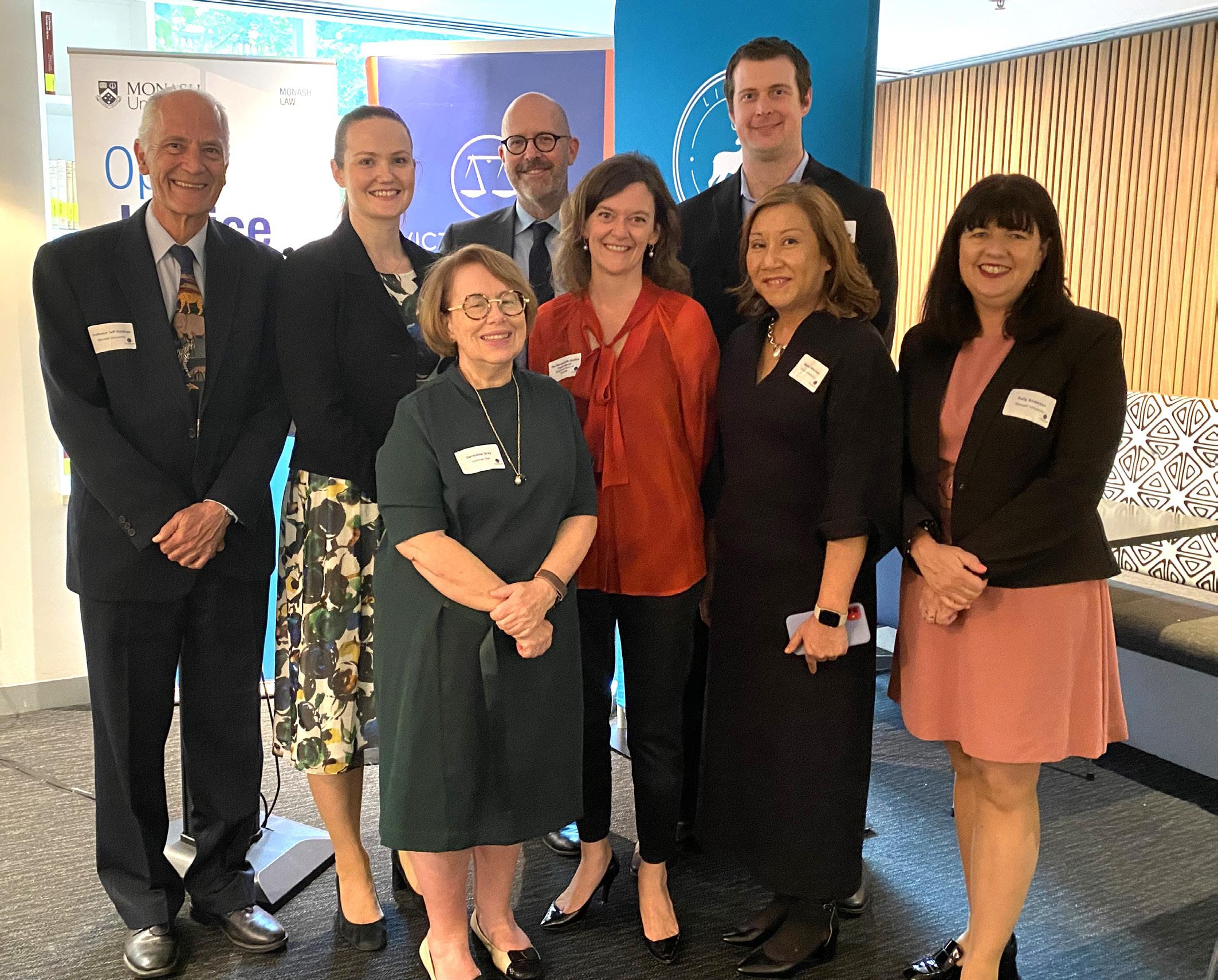
Committee as at 30 June 2024: Geraldine Gray (Chair), Laura Hilly (Deputy Co-Chair), Christopher Lum (Deputy Co-Chair), Juliet Forsyth SC, Andrew Woods, Steven Lowry, Anna O’Callaghan, Alexander Campbell, Amanda Storey, Liam McAuliffe, Nikolas Barron, Bianca Sacco and Fiona Ryan SC (Bar Council Representative).
The Pro Bono Committee supports the longstanding tradition of barristers of the Victorian Bar performing pro bono work by overseeing the Bar’s various pro bono schemes. Pro bono work performed by barristers under the schemes helps improve access to justice for clients, promotes the rule of law and supports the administration of justice in our courts.
The work of the Pro Bono Committee comprises three broad areas of activity:
1. The Victorian Bar Pro Bono Scheme;
2. The various Court referral schemes;
3. A collection of activities designed to facilitate those schemes.
Justice Connect administers the Victorian Bar Pro Bono Scheme. People seeking the assistance of a barrister’s services pro bono may apply to Justice Connect via its online platform. Justice Connect then assesses the application’s eligibility, which involves determining whether it is appropriate that the person receive pro bono assistance and whether the person requires the help of a barrister. The Bar’s partnership with Justice Connect through the scheme is longstanding and highly valued. The Committee thanks Justice Connect for its ongoing assistance.
The various Court referral schemes facilitate pro bono
services for self-represented litigants in cases already before the Courts. Through these schemes, the Courts can also seek the assistance of counsel acting as amicus curiae. The Court schemes currently operate in the Victorian Supreme Court and Court of Appeal, the County Court, the Coroners Court and the Federal Circuit and Family Court of Australia. Requests for assistance are posted by Self-represented Litigant officers from each court onto the Bar’s pro bono platform. The pro bono platform is also used by Justice Connect to place many of its requests for assistance.
The additional activities which the Committee oversees are as follows.
The Open Justice Project: This project is a collaboration between Monash University Law School and the Victorian Bar. Now in its fourth year, the Open Justice Project allows Monash law students to assist barristers working on pro bono matters.
The Victorian Bar’s Pro Bono Awards: The Pro Bono Awards recognise some of the exceptional pro bono contributions and achievements of Victorian barristers who are nominated in the various award categories. The next Pro Bono Awards ceremony will be held in March 2025.
Disaster Legal Help Victoria: Two members of the Committee represent the Victorian Bar as partners of Disaster Legal Help Victoria. This scheme provides pro bono assistance to Victorians affected by natural disasters in the state.
Continuing Professional Development: The Committee organised several CPD activities in 2023-2024.
Future directions: The Committee has concluded discussions with representatives of VCAT as to a pilot pro bono referral scheme with that tribunal. Discussions are underway for a pilot scheme to be operated in conjunction with the Magistrates’ Court of Victoria and for the development of a pro bono mediation scheme within the County Court.
Finally, the Committee records its thanks to previous members who dedicated themselves to advancing the Committee’s work. It also extends its gratitude to Lisa Paykel, the Bar Office Pro Bono Program Manager, for her invaluable assistance over the last twelve months.
Committee as at 30 June 2024: Anthony Strahan KC (Chair), Ben Ihle KC (Deputy Chair), Chris O’Grady KC, Christopher Archibald KC, Albert Dinelli KC, Kate Burke, Erin Gardner, Aphrodite Kouloubaritsis, Diana Price, Alexandra Folie, Ms Georgia Douglas, Mark Hosking, James McComish, Nicholas Walter, Nadia Deltondo, Owen Nanlohy, and Felicity Fox (Bar Council representative).
In November 2023, the Bar Council appointed a 5-Year Exam Review Panel (Panel) chaired by the Hon. Peter Riordan KC. Georgina Costello KC, Justin Graham KC, Ashlee Cannon, James McComish, Laura Johnston, Felicity Fox, and Yusur Al-Azzawi were appointed Panel members. While the Panel was initially appointed to review the Bar Exam, its remit was extended to consider other aspects of the process by which new barristers come to the Bar.
The Panel delivered its report to the Bar Council in March 2024 and made 17 recommendations and four suggestions for substantial changes to the Bar Exam and Readers’ Course. The Bar Council unanimously agreed to adopt 16 of the 17 recommendations. Recommendation 14 was to reduce the course duration from nine to five weeks. The Bar Council then asked the Readers’ Course Committee to consider the merits of a five or six-week Readers’ Course and provide its recommendation accordingly. Following a thorough review of the Readers’ Course curriculum undertaken by the Committee’s Course Review Working Group, the Bar Council adopted the Committee’s recommendation of a sixweek course commencing from the first delivery in 2025.
The decision to reduce the course length was primarily motivated by a desire to ensure that candidates wishing to access a career at the Bar were able to do so and were not precluded by financial or other burdens of an unduly long course. To meet that objective, the course is being redesigned to focus primarily on the skills needed by an advocate in court.
A number of sessions from the “old” course, many of which deal with other aspects of a barrister’s practice (other than court work) were unable to be accommodated within the shorter six-week course period. Many of these are of substantial significance to practice at the Bar, and continuing to deliver this content to Readers is desirable. To achieve this, the Committee is presently developing a three-phase readers’ program comprising first, an online phase with reading and videos to watch, followed by the second phase, which is the “course proper” (over six weeks), and then a third phase conducted after the dedicated six-week course, but still during (or proximate to) the reading period. This last phase is expected to comprise more general content about life and practice as a barrister in modules running a few hours at a time. In addition to designing the new course, another working group of the Committee is considering amendments to the Reading Regulations that will be required to give effect to these changes. The final format and content of the March 2025 Readers’ Course and post-course program will be finalised in Q3-4 of 2024.
Other notable changes adopted by the Bar Council include increasing the capacity of each course from 48 to 60 Readers and offering a third course, if necessary, in any year.
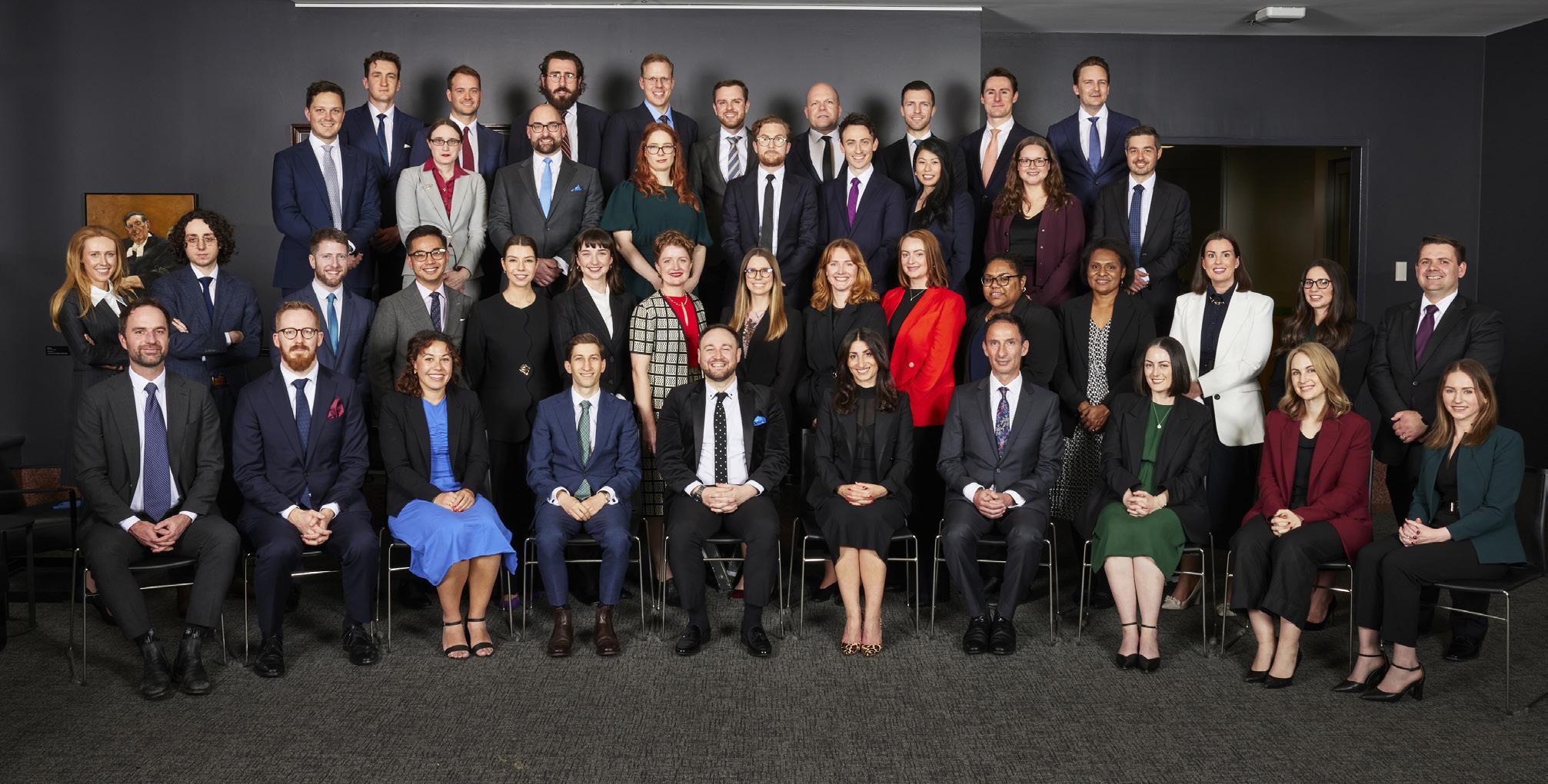
Front row (l-r): James Mitchell, Allen Clayton-Greene, Georgia Suhren, Thomas Diaz, Nicolas Muniz Saavedra, Ran Zaydan, David Blumenthal, Courtney Hart, Amy Armstrong, Caitlin O’Neil
Second row (l-r): Hayley Daniel, Dylan Ioannou-Booth, Joshua Cunningham, Chadwick Wong, Camilla Middleton, Elizabeth Main, Hetty Champion de Crespigny, Taylah Stretton, Bryony Seignior, Candice Jackson, Tapas Kametan, Marlynn Koim, Isabelle Murphy, Bianca Sacco, Ben Kerlin
Third row (l-r): Evan Ritli, Jasmine Still, Aaron Lane, Bree Ridgeway, Scott Smith, Luke Chircop, Angela Kittikhoun, Kelly Butler, Leigh Crosbie
Back row: (l-r): Jamie O’Regan, Ben Holding, Angus Mackenzie, Robert Marsh, Tim Noonan, David Rofe, Andrew Theodore, Oliver Lloyd, Adrian Dean
The Panel also suggested various changes to the mentoring program, including adjusting the reading requirements in various ways. A working group of the Committee considered these changes and made recommendations to the Bar Council about them. The Bar Council passed resolutions affecting changes to the way mentoring will operate in August 2024.
During the 2023/24 year, the Readers’ Course Committee, in close consultation with the Victorian Bar’s Education team (Michelle James, Nikki Walker, Golam Kibria and Vicky Kourtis), continued to oversee the Readers’ Course and the Bar Entrance Exam in accordance with the Bar’s Application & Reading Regulations, delivered the September 2023 and March 2024 Readers’ Courses and the Victorian Bar Entrance Exam in October 2023.
The Course Review Working Group (CRWG) undertook its post-course review of the September 2023 and March 2024 courses shortly after each had been completed. The refinements recommended by the CRWG were implemented for the following courses.
Another working group of the Committee, chaired by Sarah Porrit (September 23) and Erin Gardner (March 2024), oversaw the process of engaging with and obtaining feedback
from Readers. Feedback from our Readers is vital data that assists and informs each course review. Pleasingly, in the past year, the feedback has for the most part been very positive.
Since its inception, the Readers’ Course has been subject to continual refinement and improvement. While the key lessons for young barristers remain the same, the course curriculum strives to assist readers in successfully transitioning to life at the Bar, whether they have practised extensively as solicitors or have limited legal practice experience. Our thanks are due to all those who have contributed to and continue to contribute to that process.
The Bar only offers a limited number of places in the Readers’ Course each year (currently a maximum of 96 places across two courses). As a pre-condition of eligibility for a place in the Readers’ Course, candidates are required to pass the Bar’s Entrance Exam. Demand exceeded the number of places available in the next and following courses following the Exam (March and September 2024). A small overhang of eligible reader applicants who passed the October 2023 Entrance Exam but were not allocated a place in the 2024 Courses has been carried into 2025. Although notably, most readers are generally allocated the course of their preference.
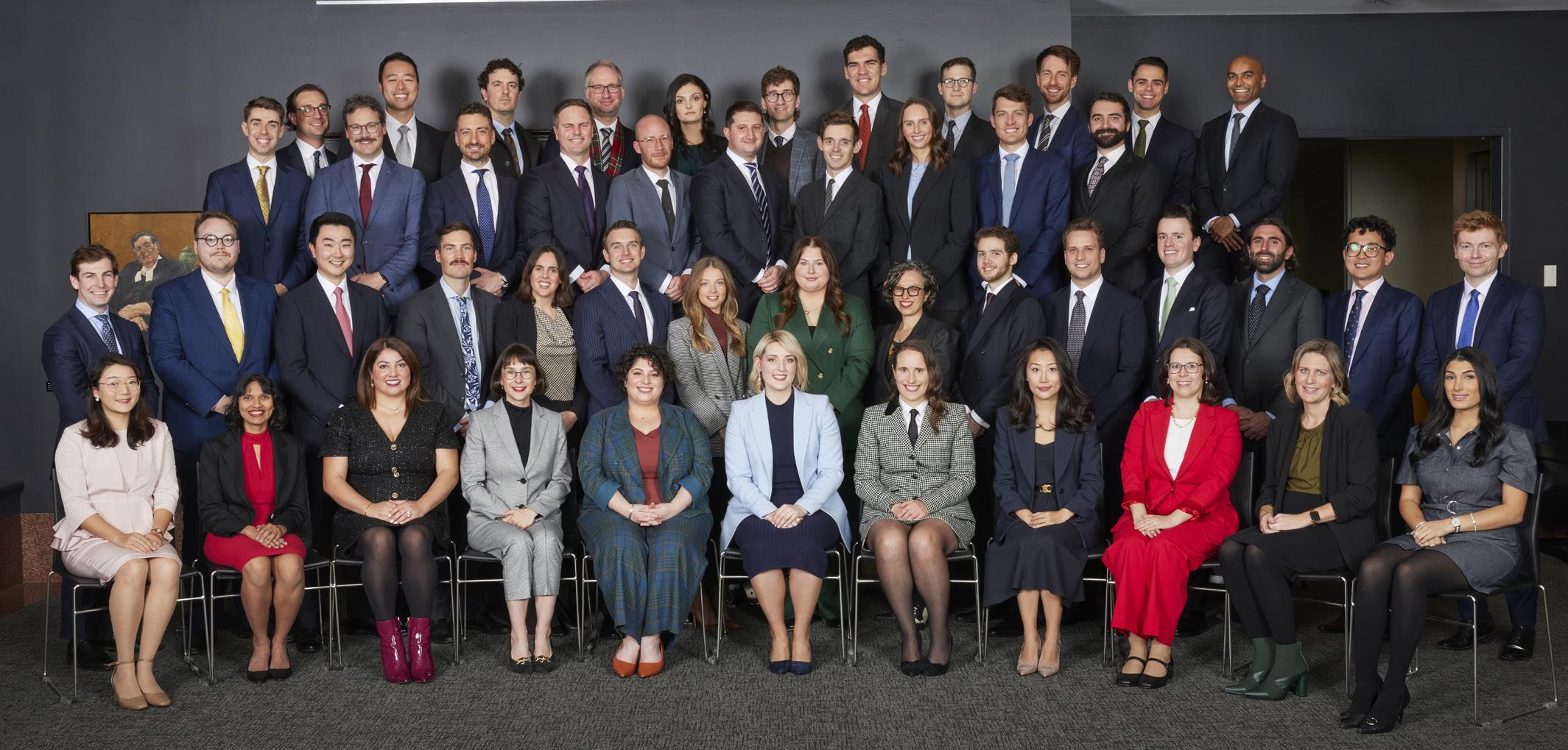
Front row (l-r): Jessy Xie, Nilanka Goonetillake, Sana Gelic, Georgia Dobbyn, Rachel Cashmore, Stephanie Mann, Stephanie Young, Karen Liu, Rebecca Barrett, Kahlia Shenstone, Zeina Alhalabi
Second row (l-r): Sebastian Campbell, Jack Cleveland, Gary Zhang, Redmond Casey, Thea Casey, James Moutsias, Brittany King, Samantha Owen, Nina Vallins, Cameron Moir, Daniel Fawcett, William Stone, Stephen O’Connell, Joshua Teng, Rowan Slattery
Third row (l-r): Dylan Dexter, Alex Gelber, Scott Thomas, Sean Kelly, Gavin Rees, Michael Beaconsfield, Thibaut Clamart, Molly Deighton, Sam Mullaly, Vincent Farrugia
Back row: (l-r): Louis Dean, Isaac Guan, Magnus O’Mallon, Jason Allen, Stacey Stanley, Henry Hunt, Sam Crock, Eli Fryar, Tom Egan, Elliott Young, Jay Chandramohan
The September 2023 Course had 43 Readers plus two overseas Readers from Papua New Guinea, and the March 2024 Course had 47 Readers. The reduced numbers reflect late withdrawals.
The Bar Entrance Exam was administered in October 2023. A total of 287 candidates registered for the exam, 264 sat on exam day, and 94 candidates passed the exam (32.9%). These candidates were invited to nominate their preference to undertake the Readers’ Courses in March 2024, September 2024, or March 2025.
Of the 264 exam candidates, 52% identified as male, 47% as female, and 1% as non-binary.
The October 2023 Exam was once again successfully delivered electronically. The ExamSoft software, which included remote invigilation mechanisms, continued to be an effective platform for delivering the Bar’s exam. No technical errors related to the ExamSoft program were identified, although some candidates did experience difficulty with their own equipment during the exam.
The October 2023 Exam was prepared and overseen by the Chief Examiner, Dr Jason Harkess. The Exam was reviewed by the Standing Exam Review Panel, appointed by the Bar Council following the recommendations of the 2019 Exam
Review Panel Report. The Panel, chaired by Ben Ihle KC, had the responsibility to confer with the Bar’s Chief Examiner regarding the exam’s content, form and complexity. The Exam Working Group, chaired by Felicity Fox, was responsible for the conduct of the exam. The October 2023 Exam was the last to be overseen by Dr Harkess after an extended period in that role. The Committee is grateful for his work.
Exam candidates were invited to participate in online preexam webinar lecture sessions. These were well attended and received good feedback. Candidates were also provided with recorded preparation sessions and exam materials to assist with their preparations for the exam.
During the past year, the Committee also established a working group to consider including sensitive content in the exam reading guide, the exam and the Readers’ Course. The working group presented its preliminary views to the Committee in May 2023. The working group will finalise this work in collaboration with the newly established Exam Committee appointed by the Bar Council and chaired by Christopher Archibald KC.
The newly appointed Exam Committee has assumed responsibility for the content and conduct of the 2024 and future exams.
The Readers’ Course Executive dealt with applications for dispensation from the obligation to read with a mentor or sit the exam. It has also determined applications for special consideration from candidates sitting the Bar Exam or applications to sit the exam under modified circumstances. It was a busy year for the Executive, with a significant number of applications being considered and determined.
The Application and Reading Regulations Review Working Group is a sub-committee of the Readers’ Course Committee and is chaired by Ben Ihle KC. A comprehensive review of the Regulations is underway to encompass changes required for the effective operation of the Committee and also to reflect the changes adopted by Bar Council arising out of the Panel Review identified above.
In 2023, the Committee (in conjunction with the Indigenous Justice Committee) continued a mentor program for First Nations Bar Exam candidates. In the program’s third iteration, a First Nations candidate was paired with a barrister who had recently completed the exam and course. Since its inception in 2021, all candidates who have participated in the program have successfully passed the Bar Exam and completed the Readers’ Course.
The Committee acknowledges and extends a warm thank you to:
» the retiring committee members (in November 2023), Bronia Tulloch, Sarah Porritt, Gordon Chisholm, Robert Forrester and Raini Zambelli (Bar Council Representative) for their valued service and commitment to the work of the Committee and the Bar;
» the Bar’s Education team, Michelle James, Nikki Walker, Golam Kibria and Vicky Kourtis, for their care, hard work and excellent service in supporting the Committee over the past year and in administering the Readers’ Course and the Bar Entrance Exam;
» the many volunteer presenters, advocacy trainers, moot judges and mentors from the Bar and Bench, whose generosity made the Readers’ Course possible and the success that it is;
» the Bar’s Senior In-house Counsel, Kai Li Zhu, for her assistance in drafting changes to the Application and Reading Regulations and new policies to reflect the changes to the Readers’ Course and Entrance Exam.
Committee as at 30 June 2024: Bonnie Renou (Co-Chair), Erik Dober (Co-Chair), Matthew Weinman (Secretary), Kylie Evans SC, Paul Hannan, Clive Madder, Alison Umbers, Adam Rollnik, Dr Andrew Newman, Tim Farhall, Shane Dawson, Ashleigh Best and Daniel Nguyen (Bar Council Representative).
The Student Engagement Committee’s objective is to demystify the Bar by providing secondary and tertiary students with a better understanding of the work of the Bar, and of the pathways to becoming a barrister. The Committee achieves this through an online presence, presenting at schools and careers events, and providing shadowing opportunities.
The SEC is an active committee that meets monthly.
The Committee’s key activities over the past year included:
» Secondary school outreach: Throughout the year, SEC members spoke at numerous schools – including Swinburne Senior Secondary College, Fitzroy High School, Northcote High School, Sirius College and Plenty Valley Christian College – both in-person and virtually. The SEC prioritises providing such opportunities to schools throughout Victoria that are underrepresented at the Bar. This important outreach provides secondary school students with a window into the practice of law as a barrister and builds their understanding of the critical importance an independent Bar plays in protecting rights, resolving disputes and responding to the demands of a modern pluralist community. Members of the SEC continue to generously provide their time and skills to these visits. Our efforts here are complemented by the Victorian Law Foundation who assist in connecting the SEC with interested schools.
» Shadowing program: The university student shadowing program was greatly expanded in the past year with students participating from Victoria University, Deakin University, La Trobe University and RMIT. In accordance with the SEC’s Charter, the program is targeted to students from diverse backgrounds or who do not have existing links to the legal profession. There is no better way to understand the work of the Bar and its many pathways than this program. The program has also been enhanced by relationships with other organisations who have presented to the students, including the Coroners Court and VIFM, Judicial College of Victoria, Juries Commissioner of Victoria, Sentencing Advisory Council and Supreme Court of Victoria Library. We are grateful to all the barrister mentors who have made this program such a success.
» Law Week: The Committee brought back its unfailingly popular ‘Cross-examine a barrister’ event for Law Week 2024. This event was strongly attended with both in-person and virtual offerings. The engaging panel and audience questions made for a lively discussion that demonstrated the importance of the work of the Bar and some flavour of the characters who make up its membership.
» University outreach: The Committee continued its regular participation in university careers fairs, training sessions and other university events throughout the year, including at events coordinated by RMIT, La Trobe, Swinburne and the Law Institute of Victoria.
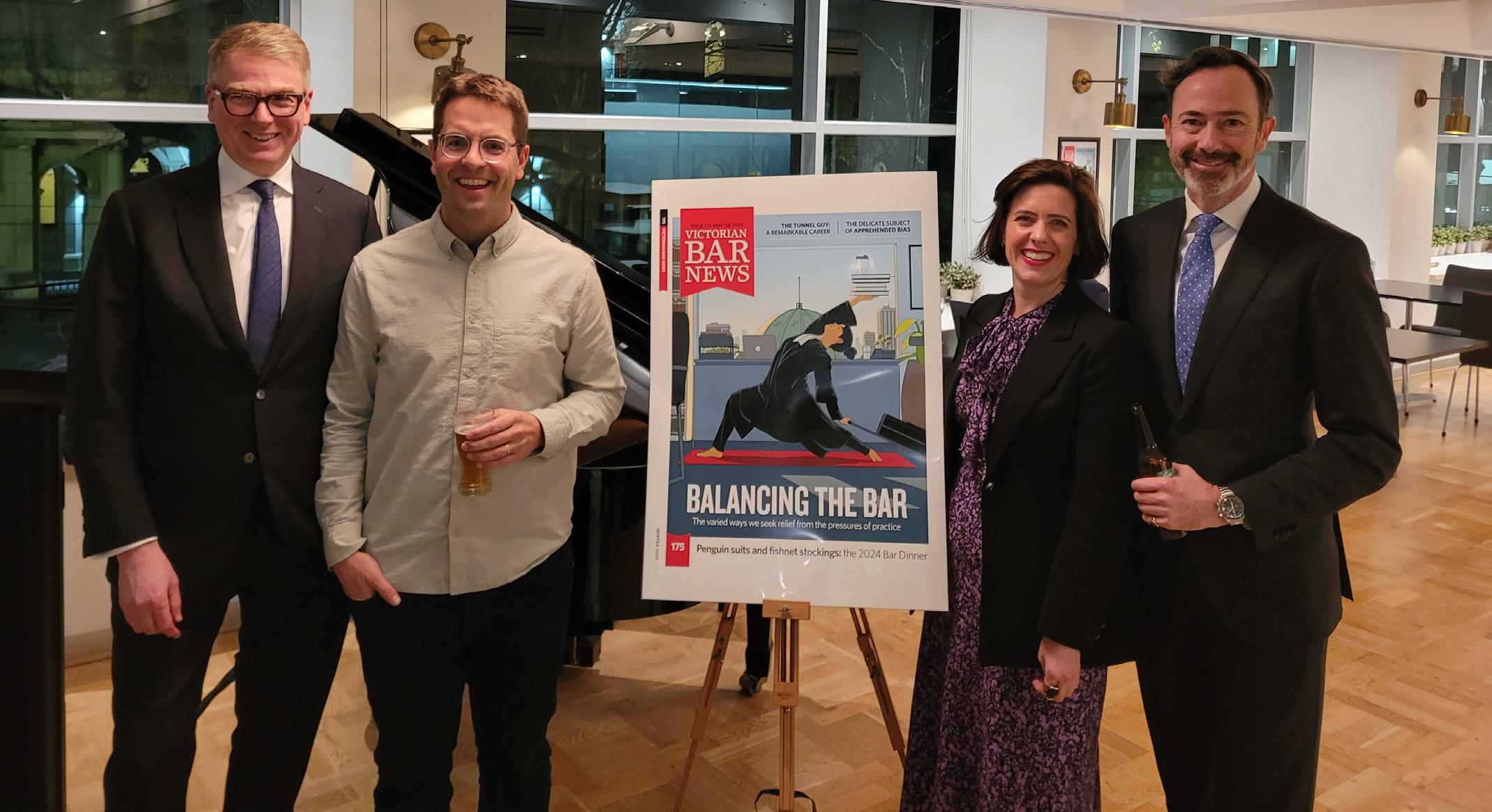
The Committee extends its thanks to all barristers who have contributed to the success of our work. We especially acknowledge the support of:
» Lisa Paykel from Bar Office who has been of great assistance, particularly in the administration of the shadowing program;
» the retiring committee members (in November 2023), including Sebastian Reid (Co-Chair), her Honour Judge Diana Manova, Reegan Grayson Morrison, Veronica Holt and Priya Wakhlu, for each making valued contributions to the work of the Committee, in some cases over many years; and
» the continued service of Tim Farhall who remains on the Committee but has stepped down from his dedicated and tireless efforts as Co-Chair.
Committee as at 30 June 2024: Luke Merrick SC (Editor), Banjo McLachlan (Editor), Maree Norton (Editor), Jesse Rudd (Editor), Sandip Mukerjea, Joel Silver, Emma Poole, Angelo Germano, Alexander Di Stefano, Julia Nikolic, Sam Blashki, Annabelle Ballard, Jasmine Still, Liz Main and Lana Collaris (Bar Council Representative).
Report on activities from previous year
Last year we published two issues of the Victorian Bar News. In this period, we have also refined and improved the editorial process, both within the Committee and with our external editor (Peter Barrett).
To produce the VBN, we maintain an updated content schedule that is regularly reviewed. During Committee meetings, specific responsibilities from the schedule are assigned to members who collaborate on ideas and recruit contributors/authors.
Additionally, editors convene regularly to discuss and decide upon the focus of the magazine, make editorial decisions, and oversee task completion.
The Bar Office, especially Sharni Doherty and Yola Beaini, plays a crucial role in supporting the Committee with administrative tasks. The editors and the Committee are grateful for their assistance.
External editorial support is provided by Peter Barrett (Editor) and Guy Shield (illustrator). The editors and the Committee are grateful for their assistance.
The new Committee is operating efficiently, having implemented improved processes in the last 12 months.
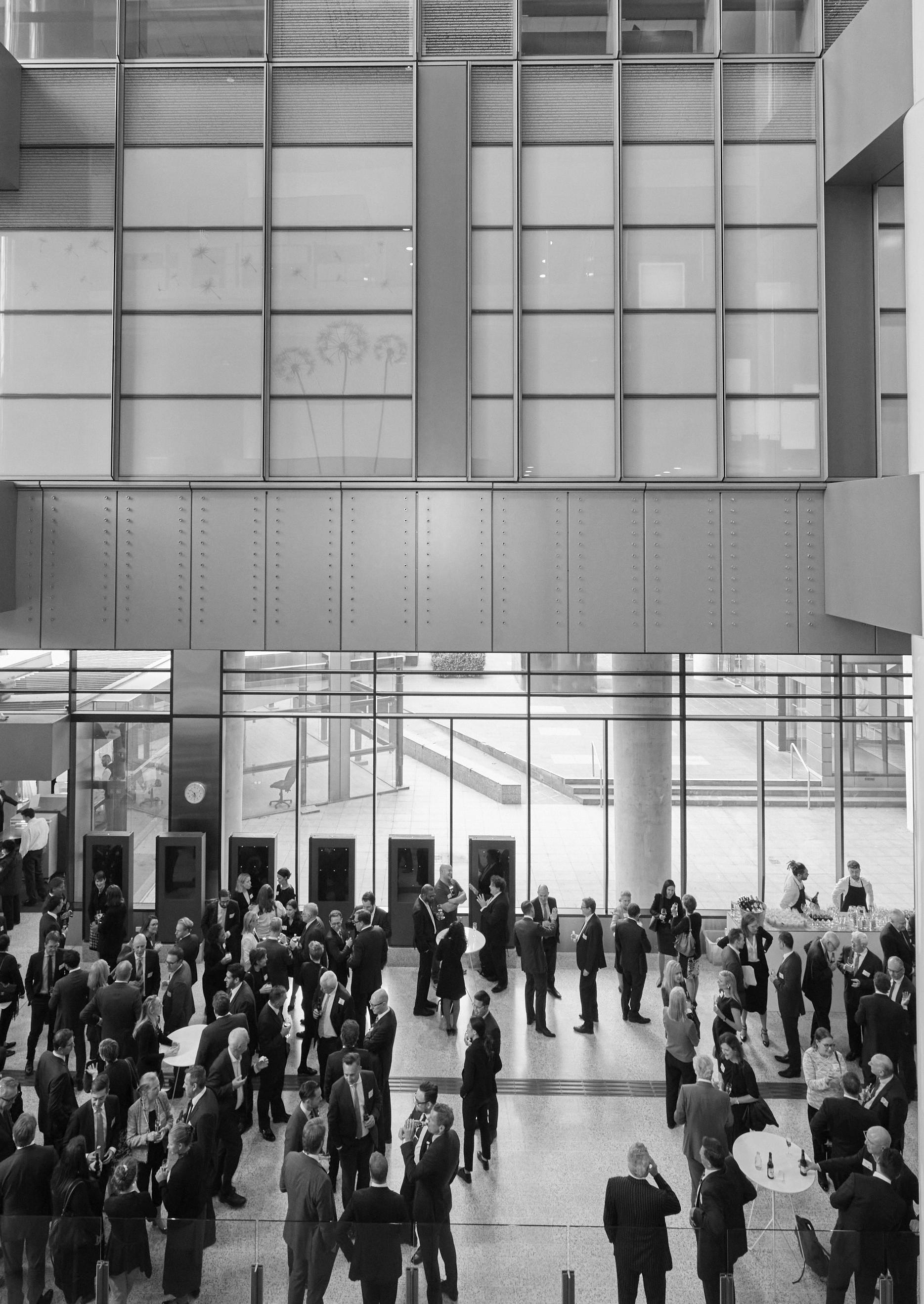
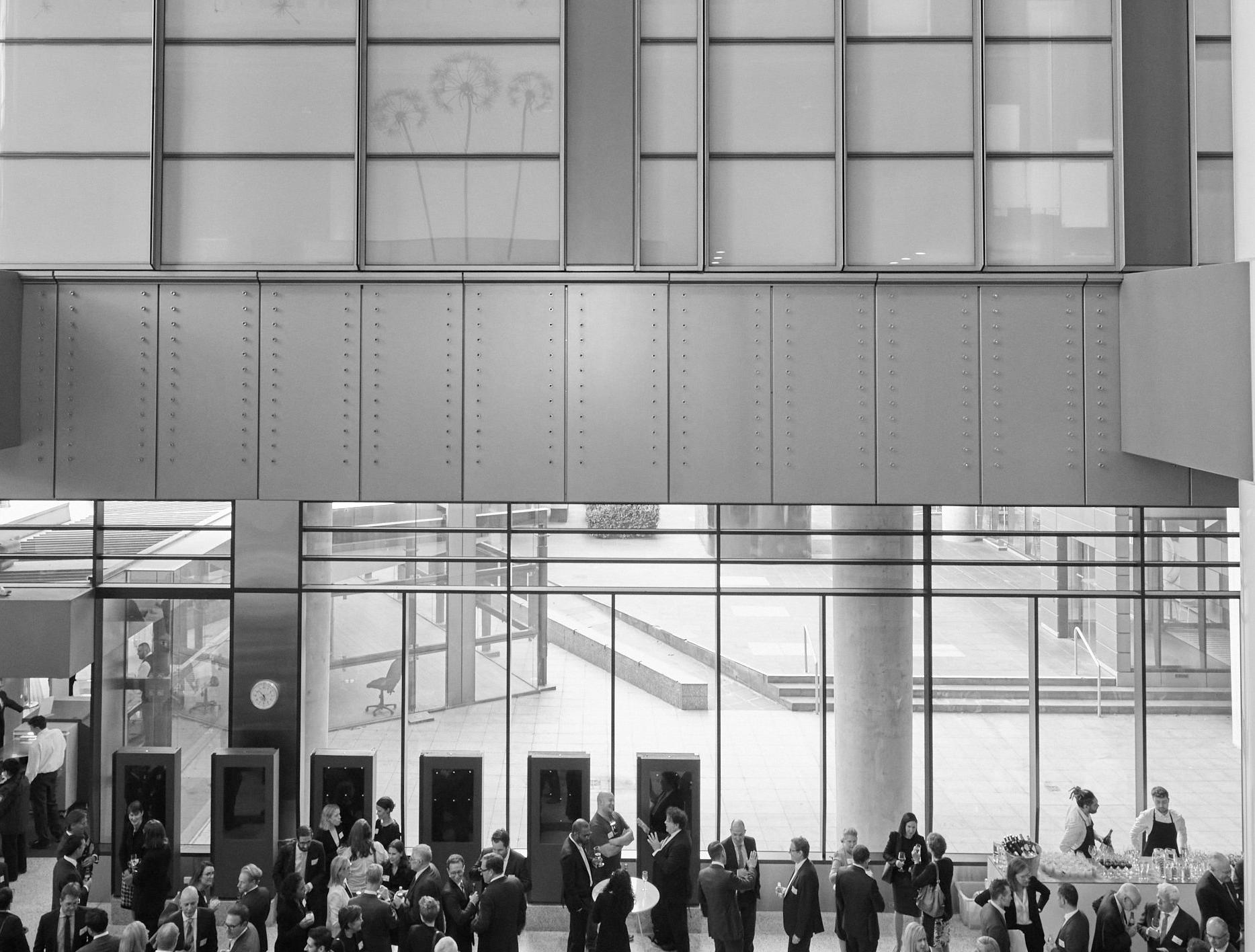
The Bar congratulates members appointed to Public, Judicial and other Office:
Federal Court of Australia
The Honourable Justice Christopher Horan
The Honourable Justice Penelope Neskovcin
The Honourable Justice Craig Dowling
Federal Circuit and Family Court of Australia
The Honourable Judge Simone Bingham—Division 2 (Melbourne Registry)
Supreme Court of Victoria Court of Appeal
The Honourable Justice Kevin Joseph Aloysius Lyons
The Honourable Justice Christopher Boyce
The Honourable Justice Rowena Orr
Trial Division
The Honourable Justice Ian Waller
The Honourable Justice Claire Harris
The Honourable Justice Andrew Watson
The Honourable Justice Paul Cosgrave
The Honourable Associate Justice Catherine Gobbo
Law Aid
(Victorian Bar Incorporated and Law Institute of Victoria)
James Mighell KC (Chair), Michelle Britbart KC, Andrew Clements KC and Fiona Ryan SC
Commonwealth Director of Public Prosecutions
Raelene Sharp KC
Administrative Appeals Tribunal
Lisa Maree Lo Piccolo
County Court of Victoria
Her Honour Judge Suzanne Kirton
His Honour Judge Andrew Palmer
His Honour Judge Michael Wise
Magistrates’ Court of Victoria
Her Honour Magistrate Allison Vaughan
His Honour Magistrate Michael Gurvich
His Honour Magistrate Andrew Waters
Medico-Legal Joint Standing Committee
Tim Tobin SC, Mary Anne Hartley KC and Marietta
Bylhouwer
Police/Lawyers Liaison Joint Standing Committee
Ian Hill KC
Solicitor-General of Victoria
Alistair Pound SC
Australian Bar Association Board of Directors
Róisín Annesley KC (Vice President) and Sam Hay KC (Victorian Bar Representative – Chair of Conferences)
Constituent Body Representative
Georgina Schoff KC
Committees
Criminal Law Committee
Zoe Broughton and Zubin Menon
Cybersecurity Committee
Michael Seelig
Diversity & Inclusion Committee
Christopher McDermott
Ethics Committee
Dr Michael Rush KC, Patrick Doyle SC, Maree Norton and Maya Narayan
Law Council of Australia
Lachlan Molesworth (Executive Member)
Family Law Committee
Tim Puckey KC and Andrew Barbayannis
First Nations Issues Committee
Thomas Keely SC, Anne Sheehan and David Yarrow
International Committee
Paul Hayes KC, Ian Horak SC, Raini Zambelli and Huw Watkins
Advisory Committees and Working Groups
Investment Committee
Lachlan Molesworth
Access to Justice Committee
Dr David Neal SC (Co-Chair)
Business and Human Rights Committee
Shanta Martin
Equal Opportunity Committee
Jenny Firkin KC
Futures Committee
Laurence White
Legal Practice Section
Charities and Not-For Profits Committee
Jennifer Batrouney AM KC
Business Law Section
Dr Elizabeth Boros KC (Executive Member)
Indigenous Legal Issues Committee
Julie Buxton
National Criminal Law Committee
Dr David Neal SC (Co-Chair), Paul Holdenson KC and Michael Stanton
National Human Rights Committee
Nicholas Cowdery AO KC (Chair) and Emrys Nekvapil SC
Rural, Regional, and Remote Committee
Simon Molesworth AO KC
Practice Development Committee
Dominique Hogan-Doran SC (Chair), Oren Bigos KC and Rachel Walsh
Taxation Committee
Jennifer Batrouney AM KC, Daniel McInerney KC, Angela Lee, Kateena O’Gorman, Gareth Redenbach and Michael Wells
Customs & International
Transactions Committee
Dean Merriman (Deputy Chair)
Defamation Working Group
Renee Enbom QC
Indigenous Incarceration Working Group
Dr David Neal SC
National Security Working Group
Ian Upjohn KC, Chris Tran and Dr David Neal SC
Young Lawyers Committee
Rebecca McCarthy
Taxation Committee
Angela Lee (Chair) and Mia Clarebrough (Deputy Chair)
Family Law Section
Executive Committee
Dr Robin Smith
Federal Dispute Resolution Section – Committees
Georgina Costello KC (Treasurer)
Military Justice Committee
Paul Willee RFD KC
Commonwealth Courts and Tribunals
Federal Court of Australia
Corporations and Commercial NPA User Group
Stewart Maiden KC, Anthony Strahan
KC, Michael Borsky KC, Cam Truong KC, Dr Oren Bigos KC, Greg Ahern, Alison Umbers and Raini Zambelli
Employment & Industrial Relations NPA User Group
Jenny Firkin KC and Malcolm Harding SC
Insolvency (Bankruptcy and Corporate Insolvency) User Group
Philip Corbett KC, Michael Gronow KC, Carl Moller and Charles Parkinson
KC
State Courts and Tribunals
Supreme Court of Victoria Rules Committee
Jonathon Moore KC
Law Library of Victoria Committee
Dr Paul Vout KC and Lucy Line
Chief Justice’s Legal Costs Committee
Stewart Maiden KC
Supreme Court Library Committee
Dr Paul Vout KC and Lucy Line
Probate Users’ Committee
Shane Newton, Simon Pitt, Ursula Stanisich, Thomas Mah, Eleanor Coates, Lucy Dawson and Nicholas Baum
Legal Services Board
Sam Hay KC
Legal Services Council –Admissions Committee
The Honourable David Habersberger KC
County Court of Victoria County Court Rules Committee
Michael Corrigan
Commercial Division Users Group
Jeremy Twigg KC, Con Salpigtidis, Andrew Downie and Georgia Berlic
Criminal Users Group
Alexander Patton, Jim Shaw and Morgan Brown
Intellectual Property Users’ Group
David Shavin KC and Tom Cordiner
KC
Legal Services Council – Law
Admissions Consultative Committee (LACC)
The Honourable David Habersberger KC
Magistrates’ Court of Victoria Alternative Dispute Resolution Committee
Tasman Fleming, Steven Lowry and Nussen Ainsworth
Civil Practice Committee
Hugh Burchill and Steven Lowry
Criminal Court Users Group
Sam Andrianakis, Chris Wareham and Susana Locke
WorkCover Users Group
Megan Cameron and Kim Bradey
Melbourne Law School – Centre for Employment and Labour Relations Law Advisory Board
The Honourable Justice Mordecai Bromberg (Chair), the Honourable Peter Gray AM, his Honour Judge Peter Rozen KC, Fiona Knowles and Dr Laura Hilly
Melbourne Law School – Asian Law Centre Advisory Board
The Honourable Justice Susan Kenny (Chair) and the Honourable Peter Gray AM
ACICA Board
Caroline Kenny KC, Andrew Hanak KC and Jonathan Redwood SC
Australian Bar Review - Editorial Board
Annette Charak
Charity Law Association of Australia & New Zealand
Jennifer Batrouney AM KC
Competition & Consumer Law
Alice Muhlebach (Chair), Jillian Williams (Co-Secretary) and Tim Farhall (Co-Secretary), Timothy Maxwell, Anna O’Callaghan and Alison Martyn
Commonwealth Lawyers Association
Fiona McLeod AO SC
Council of Law Reporting
Michael Pearce SC and David Colman
Fair Work Commission
Termination of Employment User Group
Yasser Bakri and Rebecca Preston
Firearms Appeals Committee
Samuel Stafford, Simon Lee and Christopher Sheen
Heritage Council of Victoria
The Honourable Simon Molesworth
AO KC and Adrian Finanzio SC
Melbourne Law School –Indigenous Law and Justice Hub Advisory Board
Timothy Goodwin
Melbourne Law School – Taxation Law and Policy Advisory Committee
Jennifer Davies KC, Frank O’Loughlin KC (Principal Fellow), Jennifer Batrouney AM KC (Principal Fellow) and Mia Clarebrough.
Victoria Law School
Robert Richter KC (Adjunct Professor), Dr David Denton AM RFD KC (Adjunct Professor), Dr Richard Manly KC (Adjunct Professor), David Bailey (Adjunct Professor), Dr Steven Stern (Adjunct Professor) and Nussen Ainsworth (Lecturer)
Monash University Law SchoolCentre for Commercial Law and Regulatory Studies
The Honourable Justice Clyde Croft AM and the Honourable Marilyn Warren AC KC
International Bar Association –Bar Issues Committee
Dominique Hogan-Doran SC (DeputyChair) and Fiona McLeod AO SC
International Bar AssociationDiversity and Inclusion Council
Fiona McLeod AO SC
Law Aid – Trustees
James Mighell KC, Michelle Britbart
KC, Andrew Clements KC and Fiona Ryan SC
Law Institute of Victoria – States Taxes Committee
Tim Grace
Law Institute of Victoria – Tax and Revenue Committee
John Morgan, Dr Phillip Bender and Matthew Meng
eLegal Practitioners Liability Committee Board
Adrian Finanzio SC
Legal Super Pty Ltd
James Peters AM KC (Director)
Mediator Standards Board - Board of Directors
Dr Peter Condliffe
Post Sentence Authority
Felicity Hampel AM SC (Chair as of April 2024) and Michele Williams KC (Chair resigned February 2024)
National Competition Council
Michael Borsky KC
Takeovers Panel
Michael Borsky KC
Victoria Law Foundation Board
Peter Caillard
Victorian Law Reform Commission
Kathleen Foley SC (Part-time Commissioner)
Victorian Legal Admissions Board
The Honourable David Habersberger KC (Chair), the Honourable Kate McMillan KC and Alexandra Golding.
Victorian Legal Admissions Committee
The Honourable Justice Ian Waller, Peter Chadwick KC, Cam Truong KC, Matthew Harvey KC, Lisa Hannon KC, Tamieka Spencer Bruce SC and Alexandra Golding.
Victorian Legal Admissions
Academic Course Appraisal Committee
Dr Jason Harkess
Practical Legal Training Committee
Bradley Wright

The Bar Council records with deep regret the death of the following members and past members of the Victorian Bar:
Edward Sikk
Bar Roll No 503
21 July 2023
William (Bill) Francis Lally KC
Bar Roll No 915
23 August 2023
The Honourable Donnell
Michael Ryan KC
Bar Roll No 765
26 August 2023
The Honourable Alexander Robert
Monteith KC
Bar Roll No 830
30 August 2023
David Gibson
Bar Roll No 4212
31 August 2023
His Honour John Dee KC
Bar Roll No 764
27 September 2023
David McKenzie
Bar Roll No 1971
10 October 2023
Charles Gidley
Bar Roll No 1248
27 October 2023
Laurie Robson
Bar Roll No 1933
1 November 2023
(Gerald) Martin Randall
Bar Roll No 1657
20 November 2023
Malcolm Oakes SC
Bar Roll No 2070
20 November 2023
Roger Young
Bar Roll No 2364
1 December 2023
Peta Murphy
Bar Roll No 4102
3 December 2023
His Honour Francis (Frank) Dyett
Bar Roll No 572
4 December 2023
Gavan Leonard Rice
Bar Roll No 2019
9 December 2023
Nimal Wikramanayake KC
Bar Roll No 1025
20 December 2023
Zev Wagen
Bar Roll No 3589
3 January 2024
Neville Bird
Bar Roll No 1984
25 January 2024
The Honourable Richard Francis
Edmonds AM SC
Bar Roll No 2463
14 March 2024
John Kaufman KC
Bar Roll No 743
24 March 2024
Arthur William Adams KC
Bar Roll No
750 30 March 2024
Ian Michael Hayden
Bar Roll No 708
2 May 2024
During the year the following Victorian judges members and past members of the Victorian Bar were recipients of the following honours:
Australia Day Honours 2024
Member of the Order of Australia (AM)
Dr Ian James Hardingham AM KC
Medal of the Order of Australia (OAM)
Mr Richard Patrick Dalton OAM KC
The King’s Birthday Honours 2024
Officer in the General Division (AO)
The Honourable Kevin Harcourt Bell AO KC
Member in the General Division (AM)
His Honour Judge Michael Patrick Bourke AM
45 Years at the Bar
Neil Young KC
Peter Bick KC
Paul Elliott KC
Leslie Glick KC
John Richards KC
Anthony A Nolan KC
W R Middleton KC
Andrew J McG Moulds KC
Philip Barton
Michael S R Clarke
Robert McCloskey
Ian McEachern
Rose Weinberg
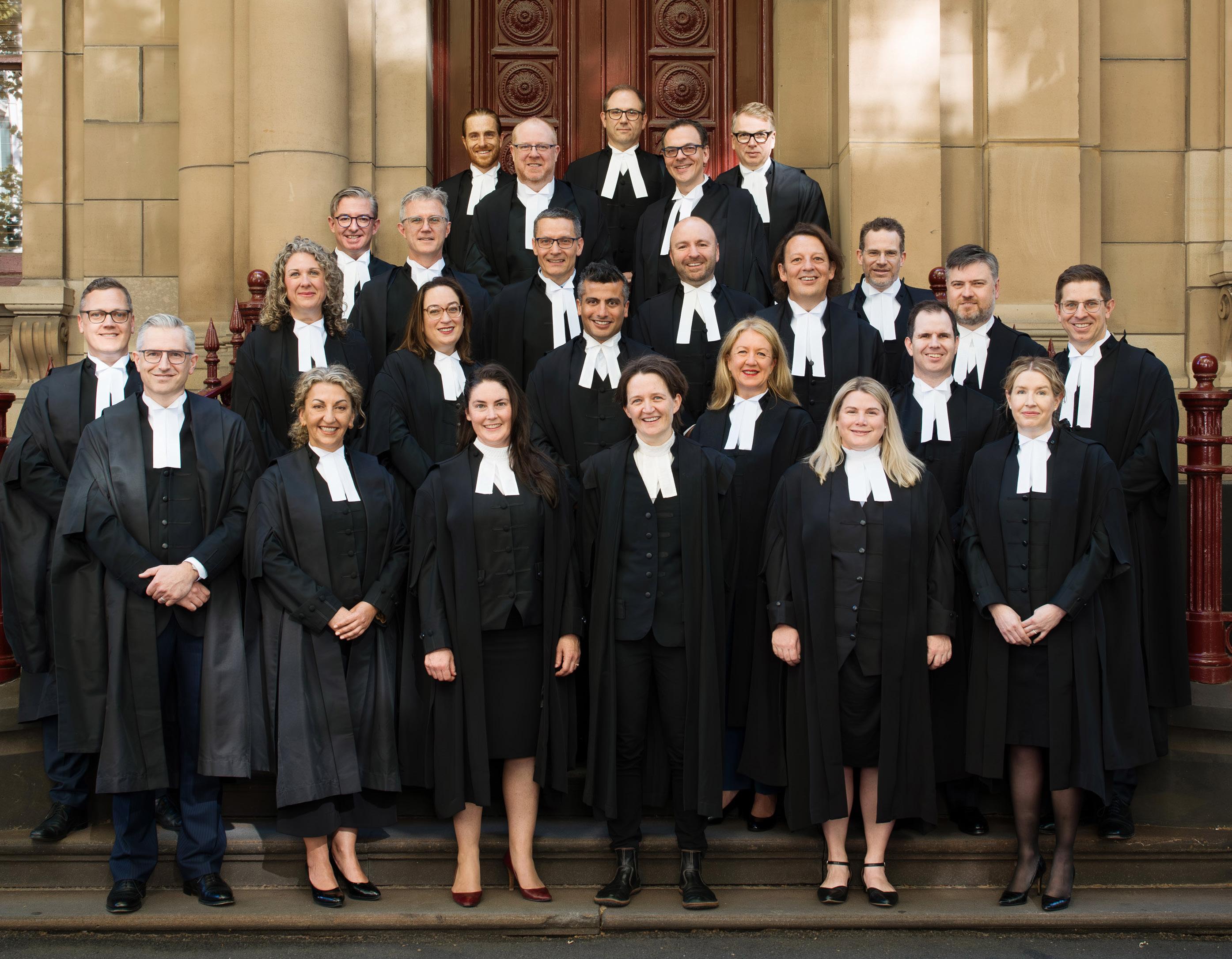
Victoria’s newest silks are:
Back Row of 5 (L-R): Liam Brown SC Christopher Brown SC Dean Guidolin SC Travis Mitchell SC Luke Merrick SC
2nd Row Down of 5: Hamish Redd SC Peter O’Farrell SC John Gurr SC Simon Pitt SC Matthew Follett SC
3rd Row Down of 7: Barnaby Chessell SC Kylie Evans SC Gabi Crafti SC Rishi Nathwani SC Richard Stanley SC
John Tracey SC Paul Liondas SC.
Bottom Row of 8: Richard Harris SC Helen Dellidis SC Tamieka Spencer Bruce SC Kateena O’Gorman SC Sharon Lacy SC
Catherine Boston SC, Shaun Gladman SC, Fiona Spencer SC
The following is a statistical profile of membership of the Victorian Bar Association and a listing of those joining, leaving or transferring their membership during the year ended 30 June 2024.
The following persons signed, re-signed, transferred or were removed from the Roll of Counsel:
Signed Nick Luxton, Robert Gray, David Blumenthal, Allen Clayton-Greene, Leigh Crosbie, Ben J Kerlin, David Peter Rofe, Aaron M Lane, Isabelle Claire Murphy, Jasmine Benedicta Faith Still, Chadwick Wong, Bree H R Ridgeway, Angela Kittikhoun, Scott Anthony Smith, Jamie T O’Regan, Joshua Cunningham, Kelly Day Butler, Robert R Marsh, Andrew Nicholas Theodore, Angus Mackenzie, Timothy John Noonan, Georgia Leilani Suhren,
Evan Peter Ritli, Hetty Mary Champion de Crespigny, Hayley E Daniel, Bryony Seignior, Camilla Middleton, Liz M Main, James Ian Mitchell, Ran Zaydan, Luke Chircop, Oliver D Lloyd, Bianca Jade Sacco, Caitlin Elizabeth O’Neil, Adrian C Dean, Ben Holding, Nicolas Muniz Saavedra, Courtney Ann Hart, Tom Patrick Diaz, Candice N Jackson, Dylan James Ioannou-Booth, Taylah E Stretton, Amy Elisabeth Armstrong, Stephanie Young, Kahlia Shenstone, Nilanka
Goonetillake, Michael Beaconsfield, Rowan Slattery, Daniel Fawcett, Sana Gelic, Rebecca E Barrett, Eli Joseph Fryar, Louis E Dean, Gary Zhang, Stephanie Colette Mann, Redmond John Casey, Alexander Gelber, Jason M Allen, Jehan Chandramohan, Joshua Teng, Sean Kelly, Georgia Dobbyn, Rachel Cashmore, Thibaut Clamart, Nina Hannah Vallins, Vincent Farrugia, Henry Edward Hunt, Sebastian T Campbell, Scott Alexander Thomas, Stacey Stanley, Molly Deighton,
Stephen O’Connell, Jinxin (Jessy) Xie, William Joseph Stone, Thomas K Egan, Yang (Karen) Liu, Gavin Terrence Rees, Samantha Owen, Thea Casey, Dylan Dexter, James Douglas Moutsias, Sam Crock, Samuel M Mullaly, Jack D Cleveland, Brittany King, Elliott F Young, Isaac Guan, Zeina Alhalabi, Cameron Moir and Magnus Christopher O’Mallon.
Re-signed
Kerry Stephens, Neil J Adams SC, Tania N Bolton, Laura Keily, Victoria E Lambropoulos, Dane McLeod and Tanya Kamil.
Transfers from Phillip M Bornstein, Mark E Regan, Bernard J Sutherland, Maurice B Phipps KC, Brooke Hutchins, Russell N J Young, Pamela M Hogan, Remy van de Wiel KC, Richard J Moore, Jeremy H Gobbo KC, Lisa K Sarmas, Deborah Mandie, Ross H Gillies KC, Michael J
Corrigan, Ronald D Curtain, Annette H Kaitinis, Robert H Miller, Peter Moloney, David A Pannifex, Michael T Schulze, Peter G Sest KC, Stephen G R Wilmoth OAM, Richard Short, Berris E Aitken, Caitlin Dwyer, Dyson F HoreLacy SC, Donald F Kinder, Bernadette M McMahon, Munya M Andrews, Julian Burnside AO KC, Catherine F Gobbo, Ian Duffy, Christopher K Horan KC, Andrew J Palmer, Ian G Waller KC, Gary Fitzgerald SC, Timothy D Best, Lisa Maree Lo Piccolo, Joseph M Toal, Noel Magee KC, Carmel Morfuni, Mark E Dean KC, Toby Borgeest, Sharon Keeling, Claire M Harris SC, Aaron Shwartz, Raelene Sharp KC, Sharn-Adelle A Coombes, John Glover, Penny J Thorp, Adrian T Hoel, Martin P Guthrie, Charles Gunst KC, Michael W Wise KC, Craig Dowling SC, Penelope Neskovcin KC, Joseph M Toal, Paul Bingham, Thracy P Vinga, Alistair D Pound SC, Paul A
Willee RFD KC, Michael J F Sweeney OAM, George H Golvan KC, Bruce R Geddes KC, Daniel N McGlone, Simone L Bingham, Bryan J F Mueller, Morry A Nightingale, Lindsay Paine, Sarah Lenthall, Susan A Blashki, Margot F Brenton, Michael E King and John R P Lewisohn.
Transfers to Catherine Chiang, Michael H Whitten KC, Gary B Hevey RFD, Rodney Hepburn, Melissa Mahady, Neill A Hutton, Simona Gory, his Honour Randall J Kune, Carly Sluiter and her Honour Magistrate Kristen A Rose.
Removed from Declan Hyde, Laura Keily, Miriam Orwin, Andrew L Purcell, Janine Garner, Steven Castan, Andrew McCowan, Tanya Kamil, Andrew McCowan, Kim A Galpin, Marcus J Langlois, Ellen M Grant and Toby Borgeest.
Transfers from
Mark J Rochford KC, Christopher B Boyce KC, Melissa Mahady, Neill A Hutton and Andrew G Waters.
Transfers to Deborah Mandie, Sharn-Adelle A Coombes, Penny J Thorp, Daniel N McGlone and Sarah Lenthall.
Signed Regina Weiss, Christopher Griggs, Sagorika Patel, Sean Noel Kikkert, Kathryn (Kate) Louise Sheridan, Christopher Honnery, Louise Perigo, Bruce Robert McTaggart SC and the Honourable Steven Andrew Strickland KC.
Transfers from Catherine Chiang, Matthew Howard SC, Paul Menzies KC, Terence K Tobin KC and Carly Sluiter.
Transfers to Dominique K Grigg and Michelle L Bennett.
Name removed Scott Collins.
Removed from Paul E Blacket SC, Rodney M Smith SC, Bret W Walker AO SC, Alain Musikanth SC, Lindsay J Ellison SC, Koulla E Roussos, David T Cole, Andrew T Conley, Christopher O’Meara and Peter Douglas van Eps.
Transfers from Rodney Hepburn, Heather M Gordon, Simona Gory and Michelle L Bennett.
Transfers to
Brooke Hutchins, Berris E Aitken, Caitlin Dwyer, Munya M Andrews Joseph M Toal, Carmel Morfuni and Noel Magee KC.
Stayed In Michelle L Bennett.
Removed from Nick Button.
Transferred To
Matthew Howard SC (appointed to the Supreme Court of Western Australia)
Michael T Schulze (appointment as Ombudsman with the Australian Financial Complaints Authority)
Catherine F Gobbo (appointment as Associate Justice of the Supreme Court of Victoria)
Christopher K Horan KC (appointed to the Federal Court of Australia)
Andrew J Palmer (appointed to the County Court of Victoria – Criminal Division)
Ian G Waller KC (appointed to the Supreme Court of Victoria)
Garry Fitzgerald SC (appointed to the Administrative Appeals Tribunal)
Lisa Maree Lo Piccolo (appointed to the Administrative Appeals Tribunal)
Claire M Harris SC (appointed to the Supreme Court of Victoria)
Raelene Sharp KC (appointment as the Commonwealth Director of Public Prosecutions)
Christopher B Boyce KC (appointed to the Court of Appeal – Supreme Court of Victoria)
Adrian T Hoel (appointed to the Victorian Civil and Administrative Tribunal)
Transfers from His Honour Randall J Kune.
Transfers to Phillip M Bornstein, Mark E Regan, Bernard J Sutherland, Maurice B Phipps KC, Russell N J Young, Pamela M Hogan, Remy van de Wiel KC, Richard J Moore, Jeremy H Gobo KC, Mark J Rochford KC, Lisa K Sarmas, Ross H Gillies KC, Michael J Corrigan, Ronald D Curtain, Thomas K Hassard, Annette H Kaitinis, Robert H Miller, Peter Moloney, Marc A Sargent, David A Pannifex, Peter G Sest KC, Stephen G R Wilmoth OAM,
Martin P Guthrie (appointed to the Victorian Civil and Administrative Tribunal)
Michael W Wise KC (appointed to the County Court of Victoria)
Craig Dowling SC (appointed to the Federal Court of Australia)
Penelope Neskovcin KC (appointed to the Federal Court of Australia)
Alistair D Pound SC (appointment as Solicitor-General of Victoria)
Simone L Bingham (appointed to the Federal Circuit and Family Court of Australia (Division 2))
Andrew G Waters (appointed to the Magistrates’ Court of Victoria)
Transfers from Lord Chief Justice Michael H Whitten, Gary B Hevey RFD, Thomas K Hassard, Marc A Sargent, his Honour Judge Dean E Clayton, the Honourable Justice John R Dixon, The Honourable Justice Kate McMillan, the Honourable Justice Susan Kenny AM, the Honourable Justice Anthony Graham, the Honourable Justice Michael L Sifris, his Honour Judge David Brookes, his Honour Magistrate Randall J Kune, Dominique K Grigg, his Honour Magistrate John W Hardy, her Honour Magistrate Kristen A Rose, the
Honourable Associate Justice Nemeer Mukhtar, Bryan J F Mueller and the Honourable Steven D Rares KC.
Signed in
Peter Alan Britten-Jones Full-time members of Statutory Tribunals
Remain in
Her Honour Suzanne A Kirton (appointed to the County Court of Victoria – Commercial Division)
Her Honour Allison Vaughan (appointed to the Magistrates’ Court of Victoria)
The Honourable Kevin J A Lyons (appointed to the Court of Appeal –Supreme Court of Victoria)
The Honourable Justice Paul Cosgrave (appointed to the Supreme Court of Victoria)
Her Honour Judge Felicity Hampel AM (appointment as the Chair of Victoria’s Post Sentence Authority)
The Honourable Justice Rowena Orr KC (appointed to Court of Appeal –Supreme Court of Victoria)
His Honour Michael Gurvich (appointed to the Magistrates’ Court of Victoria)
Richard Short, his Honour Judge Dean E Clayton, Dyson F Hore-Lacy SC, Donald F Kinder, Bernadette M McMahon, Julian Burnside AO KC, Paul Menzies KC, Ian Duffy, the Honourable Justice John R Dixon, Professor the Honourable George Hampel AM KC, the Honourable Justice Kate McMillan, Timothy D Best, the Honourable Justice Susan Kenny AM, the Honourable Justice Anthony Graham, his Honour Mark E Dean KC, Toby Borgeest, Sharon Keeling, Heather M Gordon, Aaron Shwartz, the Honourable Justice Michael L Sifris, John Glover, his Honour Judge David
Transfers from
Professor the Honourable George Hampel AM KC.
Brookes, Charles Gunst KC, his Honour Magistrate Randall J Kune, Joseph M Toal, Paul Bingham, Terence K Tobin KC, Thracy P Vinga, Paul A Willee RFD KC, John W Hardy, Michael J F Sweeney OAM, George H Golvan KC, Bruce R Geddes KC, the Honourable Associate Justice Nemeer Mukhtar, Morry A Nightingale, Lindsay Paine, Susan A Blashki, Margot F Brenton, Michael E King, John R P Lewisohn and the Honourable Steven D Rares KC.
Name removed Michael C Garner.
Victorian Bar Incorporated
Registered No. A0034304S
Owen Dixon Chambers East
Level 5 / 205 William Street
Melbourne, Victoria 3000
T: 03 9225 7111
E: vicbar@vicbar.com.au
W: www.vicbar.com.au
Bar Councillors
Ms Georgina Schoff KC (President)
Mr Colin Mandy SC (Vice-President)
Ms Elizabeth Bennett SC (Vice-President)
Ms Sarah Keating (Honorary Treasurer)
Ms Raini Zambelli (Assistant Honorary Treasurer)
Mr Gavin Silbert KC
Mr Peter Chadwick KC
Mr Mark Robins KC
Mr Justin Hannebery KC
Ms Fiona Ryan SC
Mr Rishi Nathwani SC
Mr Darryl Burnett
Ms Moya O’Brien
Mr Timothy Goodwin
Mr Daniel Nguyen
Ms Jessie Taylor
Ms Ffyona Livingstone Clark
Ms Lana Collaris
Ms Andrea Skinner
Ms Felicity Fox
Ms Andrea Skinner
Ms Gemma Cafarella
Mr Ben Gibson (Honorary Secretary)
Ms Elle Nikou Madalin (Assistant Honorary Secretary)
Mr Christopher McDermott (Assistant Honorary Secretary)
Barristers Chambers Limited
ACN 004 454 004
Board of Directors
The Honourable John Digby KC (Chairman)
Sam Hay KC (Deputy Chairman)
Mr Frank Parry KC
Mr Stewart Maiden KC
Ms Megan Tittensor SC
Ms Elizabeth Bennett SC
Mr Benjamin Murphy
Ms Catherine Walter AM
Mr Mick Brennan
Mr Paul Clark (CEO and Managing Director)
ACN 624 652 357
Board of Directors
Mr Paul Clark
ACN 004 640 108
Board of Directors
Ms Georgina Schoff KC
Ms Sarah Keating PART X
The officers, members of the Council of the Victorian Bar Incorporated, submit herewith the annual financial report of the Association for the financial year ended 30 June 2024. In order to comply with the provisions of the Associations Incorporation Reform Act 2012 and generally accepted good practice disclosure, the Officers report as follows:
The names of the Officers of the Association during or since the end of the financial year are included on page 13 of the annual report under Bar Council.
The Victorian Bar Incorporated is a professional association for lawyers practising solely as barristers. As well as serving its barrister members, the Bar serves the public interest through its activities in improving access to justice and law reform and its pro bono work. The Bar has two wholly owned subsidiary companies: Barristers Chambers Limited (BCL) owns and leases buildings, which are provided as chambers to barristers, and provides telephony and internet services to members of the Bar; and The Melbourne Bar Pty Ltd which is a non-operating nominee company. BCL has one wholly owned subsidiary, Opus Workspaces Pty Ltd, which provides serviced office space.
During the financial year ended 30 June 2024 the Association incurred a consolidated deficit from continuing operations after tax of $22,778,951 (2023 deficit: $33,954,365). The Association (Parent) achieved an after tax surplus of $844,685 (2023 surplus: $639,803).
Except as set out in the accompanying financial reports, there was no significant change in the state of affairs of the Association during the financial year.
There has been no other matter or circumstance which has arisen since the end of the year that has significantly affected, or may significantly affect the company’s operations, the result of those operations or the company’s state of affairs.
Substantial changes in the operations of the Association are ordinarily determined by a vote of members which are communicated other than through the Annual Report. It is noted that on 30 August 2024, the Group settled the purchase of a property at 200 Queen Street, Melbourne through its BCL subsidiary.
The Association is not subject to any significant environmental regulations under Australian law.
The Association is incorporated under the Associations Incorporation Act 1981 (Vic). It is precluded under the Act and its Constitution from paying a dividend to its members. The Association is a not for profit organisation.
During the financial year, the Association paid a premium in respect of a contract insuring the Officers of the Association (as named above and on page 13 of the Annual Report) and all Executive Officers of the Association and of any related body corporate against a liability incurred as an officer or executive officer to the extent permitted by the Association’s Constitution.
The contract of insurance prohibits disclosure of the nature of the liability and the amount of the premium.
The Association has not otherwise, during or since the financial year, except to the extent permitted by law, indemnified or agreed to indemnify an officer or auditor of the Association or of any related body corporate against a liability incurred as such an officer or auditor.
No person has applied for leave of court to bring proceedings on behalf of the Association or to intervene in any proceedings to which the Association is a party for the purpose of taking responsibility on behalf of the Association for all or part of those proceedings.
Signed in accordance with a resolution of the Council made pursuant to the Constitution of the Victorian Bar.
Associations Incorporation Reform Act 2012
Sections 94(2)(b), 97(2)(b) and 100(2)(b)
We, Georgina Schoff KC and Sarah Keating, being President and Honorary Treasurer of the Victorian Bar Council respectively, and members of the Victorian Bar Council, which is the Committee of the Victorian Bar Incorporated certify that:
The financial statements (and notes thereto) attached to this certificate give a true and fair view of the financial position of the Victorian Bar Incorporated during and at the end of the financial year of the Association ended on 30 June 2024.
Dated this 10th day of October 2024
On behalf of the Officers

Georgina Schoff President 10 October 2024

Sarah Keating Honorary Treasurer 10 October 2024




We have audited the financial report, being a special purpose financial report, of The Victorian Bar Incorporated (the “Entity”) and its subsidiaries (the “Group”) which comprises the consolidated statement of financial position as at 30 June 2024, the consolidated statement of profit or loss and other comprehensive income, the consolidated statement of changes in equity and the consolidated statement of cash flows for the year then ended, and notes to the financial statements, including material accounting policy information and other explanatory information, and the Officers declaration.
In our opinion, the accompanying financial report presents fairly, in all material respects, the Entity and Group’s financial position as at 30 June 2024 and of their financial performance and their cash flows for the year then ended in accordance with Australian Accounting Standards, the Associations Incorporation Reform Act 2012 and the Victorian Bar Incorporated’s Constitution, and the accounting policies described in Note 3.
We conducted our audit in accordance with Australian Auditing Standards. Our responsibilities under those standards are further described in the Auditor’s Responsibilities for the Audit of the Financial Report section of our report. We are independent of the Group in accordance with the ethical requirements of the Accounting Professional & Ethical Standards Board’s APES 110 Code of Ethics for Professional Accountants (including Independence Standards) (the Code) that are relevant to our audit of the financial report in Australia. We have also fulfilled our other ethical responsibilities in accordance with the Code.
We believe that the audit evidence we have obtained is sufficient and appropriate to provide a basis for our opinion.
We draw attention to Note 3 to the financial report, which describes the basis of accounting. The financial report has been prepared to assist the Entity to meet the financial reporting requirements of the Associations Incorporation Reform Act 2012 and the Victorian Bar Incorporated’s Constitution. As a result, the financial report may not be suitable for another purpose. Our report is intended solely for the Members and should not be distributed or used by parties other than the Members. Our opinion is not modified in respect of this matter.
Management is responsible for the other information. The other information comprises the information included in, or distributed with, the Group’s annual report for the year ended 30 June 2024, but does not include the financial report and our auditor’s report thereon.
Our opinion on the financial report does not cover the other information and we do not express any form of assurance conclusion thereon.
In connection with our audit of the financial report, our responsibility is to read the other information and, in doing so, consider whether the other information is materially inconsistent with the financial report or our knowledge obtained in the audit, or otherwise appears to be materially misstated. If, based on the work we have performed, we conclude that there is a material misstatement of this other
information, we are required to report that fact. We have nothing to report in this regard.
Management of the Entity is responsible for the preparation and fair presentation of the financial report and has determined that the basis of preparation described in Note 3 to the financial report is appropriate to meet the requirements of the Associations Incorporation Reform Act 2012 and the Victorian Bar Incorporated’s Constitution and is appropriate to meet the needs of the Members. Management’s responsibility also includes such internal control as management determine is necessary to enable the preparation and fair presentation of the financial report that is free from material misstatement, whether due to fraud or error.
In preparing the financial report, management is responsible for assessing the ability of the Group to continue as a going concern, disclosing, as applicable, matters related to going concern and using the going concern basis of accounting unless management either intend to liquidate the Group or to cease operations, or has no realistic alternative but to do so.
The Officers are responsible for overseeing the Group’s financial reporting process.
Our objectives are to obtain reasonable assurance about whether the financial report as a whole is free from material misstatement, whether due to fraud or error, and to issue an auditor’s report that includes our opinion. Reasonable assurance is a high level of assurance, but is not a guarantee that an audit conducted in accordance with the Australian Auditing Standards will always detect a material misstatement when it exists. Misstatements can arise from fraud or error and are considered material if, individually or in the aggregate, they could reasonably be expected to influence the economic decisions of users taken on the basis of this financial report.
As part of an audit in accordance with the Australian Auditing Standards, we exercise professional judgement and maintain professional scepticism throughout the audit. We also:
» Identify and assess the risks of material misstatement of the financial report, whether due to fraud or error, design and perform audit procedures responsive to those risks, and obtain audit evidence that is sufficient and appropriate to provide a basis for our opinion. The risk of not detecting a material misstatement resulting from fraud is higher than for one resulting from error, as fraud may involve collusion, forgery, intentional omissions,
misrepresentations, or the override of internal control.
» Obtain an understanding of internal control relevant to the audit in order to design audit procedures that are appropriate in the circumstances, but not for the purpose of expressing an opinion on the effectiveness of the Group’s internal control.
» Evaluate the appropriateness of accounting policies used and the reasonableness of accounting estimates and related disclosures made by management.
» Conclude on the appropriateness of management’s use of the going concern basis of accounting and, based on the audit evidence obtained, whether a material uncertainty exists related to events or conditions that may cast significant doubt on the Group’s ability to continue as a going concern. If we conclude that a material uncertainty exists, we are required to draw attention in our auditor’s report to the related disclosures in the financial report or, if such disclosures are inadequate, to modify our opinion. Our conclusions are based on the audit evidence obtained up to the date of our auditor’s report. However, future events or conditions may cause the Group to cease to continue as a going concern.
» Evaluate the overall presentation, structure and content of the financial report, including the disclosures, and whether the financial report represents the underlying transactions and events in a manner that achieves fair presentation.
» Obtain sufficient appropriate audit evidence regarding the financial information of the entities or business activities within the Group to express an opinion on the financial report. We are responsible for the direction, supervision and performance of the Group’s audit. We remain solely responsible for our audit opinion.
We communicate with management and the Officers regarding, among other matters, the planned scope and timing of the audit and significant audit findings, including any significant deficiencies in internal control that we identify during our audit.


Sandra Lawson Partner Chartered Accountants
Melbourne, 10 October 2024
The Officers have determined that the Victorian Bar Inc (the “Association”) is not a reporting entity because in the opinion of the Officers there are unlikely to exist users of the financial report who are unable to command the preparation of reports tailored so as to satisfy specifically all of their information needs. Accordingly, this special purpose financial report has been prepared to satisfy the Officers’ reporting requirements under the Victorian Bar Inc.’s Constitution and the Associations Incorporation Reform Act 2012.
The Officers of the Association declare that:
1. The financial statements and notes thereto, as set out on pages 70 to 88:
a. Comply with accounting standards, the Associations Incorporation Reform Act 2012 and the reporting requirements under the Victorian Bar’s Constitution; and
b. Give a true and fair view of the financial position as at 30 June 2024 and performance for the year ended on that date, in accordance with the accounting policies described in Note 3 to the financial statements, of the Association and the Group entities.
2. In the Officers’ opinion there are reasonable grounds to believe that the Association will be able to pay its debts as and when they become due and payable.
Signed in accordance with a resolution of the Council of the Association.
On behalf of the Officers


Georgina
Schoff KC President
Melbourne, 10 October 2024

Sarah Keating Honorary Treasurer Melbourne, 10 October 2024
of profit or loss and other comprehensive income for the year ended 30 June 2024
The accompanying notes form part of these financial statements.
of financial position as at 30 June 2024
The accompanying notes form part of
Statement of changes in equity for the year ended 30 June 2024
180,940,139 The accompanying notes form part of these financial statements.
The accompanying notes form part of these financial statements.
The Victorian Bar Inc. (“the Association”) is incorporated under the Associations Incorporation Reform Act 2012, Victoria and operates in Australia.
The registered office and the principal place of business of the Association is:
Level 5, 205 William Street. Melbourne VIC 3000
The Association is a private, voluntary, self-funded, nonprofit, professional association of Barristers who practise in Victoria. Its principal activity during the year was to provide regulatory and other services to barristers who practice in Victoria.
2.1 Amendments to Accounting Standards that are mandatorily effective for the current reporting period
The Association has adopted all the new and revised Standards and Interpretations issued by the Australian Accounting Standards Board (the AASB) that are relevant to their operations and effective for an accounting period that begins on or after 1 July 2023. Their adoption has had no material impact on the disclosures and/or amounts reported in these financial statements.
2.2 Standards and Interpretations in issue not yet adopted
At the date of authorisation of the financial statements, the Group has not applied the following new and revised Australian Accounting Standards, Interpretations and amendments that have been issued but are not yet effective:
Standard/Interpretation
Expected to be initially applied in the financial year ending
AASB 2022-6 Amendments to Australian Accounting Standards – Non-current Liabilities with Covenants 30 June 2025
AASB 2022-5 Amendments to Australian Accounting Standards – Lease Liability in a Sale and Leaseback 30 June 2025
AASB 2023-1 Amendments to Australian Accounting Standards – Supplier Finance Arrangements
AASB 2014-10 Amendments to Australian Accounting Standards – Sale or Contribution of Assets between an Investor and its Associate or Joint Venture
AASB 2023-5 Amendments to Australian Accounting Standards – Lack of Exchangeability
AASB 2024-2 Amendments to Australian Accounting Standards – Classification and Measurement of Financial Instruments
AASB 18 – Presentation and Disclosure in the Financial Statements
30 June 2026
30 June 2027
30 June 2028
The potential impact of the revised Standards/Interpretations on the Association’s financial statements has not yet been determined.
Financial reporting framework
The Officers have determined that the Association is not a reporting entity because, in the opinion of the Officers, there are unlikely to exist users of the financial report who are unable to command the preparation of reports tailored to satisfy specifically all of their information needs. Accordingly, this special purpose financial report has been prepared to satisfy the Officer’s reporting requirements under The Victorian Bar Inc.’s Constitution and the Associations Incorporation Reform Act 2012.
For the purpose of preparing the financial statements, the Association is a not for profit entity.
The financial report has been prepared in accordance with the Associations Incorporation Reform Act 2012, the Victorian Bar Inc. Constitution, the basis of accounting specified by all Accounting Standards and Interpretations, and the disclosure requirements of Accounting Standards AASB 101 ‘Presentation of Financial Statements’, AASB 107 ‘Statements of Cash Flow’, AASB 108 ‘Accounting Policies’, ‘Changes in Accounting Estimates and Errors’, and ‘AASB 1054 Australian Additional Disclosures’.
The financial report includes the separate financial statements of the Association and the consolidated financial statements of the Group.
The financial report has been prepared on the basis of historical cost, except for the revaluation of certain noncurrent assets and financial instruments. Cost is based on the fair values of the consideration given in exchange for assets. All amounts are presented in Australian dollars, unless otherwise noted.
30 June 2025
30 June 2026
In the application of the Group’s accounting policies, management is required to make judgements, estimates and assumptions about carrying values of assets and liabilities that are not readily apparent from other sources. The estimates and associated assumptions are based on historical
experience and various other factors that are considered relevant. Actual results may differ from these estimates.
The estimates and underlying assumptions are reviewed on an ongoing basis. Revisions to accounting estimates are recognised in the period in which the estimate is revised if the revision affects only that period or in the period of the revision and future periods if the revision affects both current and future periods.
The Group leases various offices that contain a wide range of different terms and conditions. A lease liability has been recognised for the present value of the estimated cash outflows in relation to the Group’s leases in accordance with AASB 16. The accounting policy for the Group’s leases is disclosed in Note 3(h). The measurement of the lease liability includes the following key assumptions:
» Determining the lease term: Where the Group’s property lease contains an option to extend the lease beyond the initial term, the Group has concluded that it is not reasonably certain those options will be exercised.
» Discount rate: Lease payments are discounted using an interest rate of 1.65% to 4.53%, being the incremental borrowing rate available to the Group. There is judgement involved in making this determination.
The Group obtains independent valuations for its investment properties on at least a biennial basis or when there is a significant change in market conditions. All three properties owned by the Group were independently valued at 30 June 2024. The fair values of properties are calculated using a combination of market sales comparison and capitalisation rate. The fair value measurement of investment property has been classified as a level 3 fair value as it’s derived from valuation techniques that include inputs that are not based on observable market data (unobservable inputs). The key judgements for each unobservable valuation input are:
» Market sales comparison: Utilises recent sales of comparable properties, adjusted for any differences including the nature, location and lease profile. The market rent applied at 30 June 2024 across the three properties ranged from $330 to $465 psm;
» Capitalisation rate: Capitalises the fully-leased net income for a property into perpetuity at an appropriate capitalisation rate. The fully leased net income is based on market rents, operating costs and future income on vacant space. The capitalisation rate reflects the nature, location and tenancy profile, together with current market evidence and sales, of comparable properties. The capitalisation rates applied at 30 June 2024 across the three properties ranged from 5.75%-7.50%.
The fair value of the properties is sensitive to these assumptions, in particular the market capitalisation rate. If the market capitalisation rate applied in the valuations was adjusted +/- 5 basis points, the fair value would be $1,906k higher or $1,880k lower than the amount recognised at 30 June 2024.
A high degree of judgement is required in assessing the inputs that determine property valuations. Due to a limited volume of transactions in the market throughout the current financial year, the market evidence on which management and independent specialist valuers can rely on to appropriately assess the fair value of the properties held is reduced. The fair values are therefore a best estimate and may differ to the actual sales price if the properties were to be sold.
The Group applies the simplified approach to measuring expected credit losses, where trade receivables have been grouped based on shared credit risk characteristics and days past due. The Group’s expected credit loss allowance decreased from $3,165k at 30 June 2023 to $2,071k as at 30 June 2024, and reflects amounts that are more than 30 days overdue for which there is no agreed payment arrangement. The Group continues to pursue collection on all debts, however collection of outstanding receivables is inherently uncertain and actual collections may differ from the amount included in the expected credit loss allowance at 30 June 2024.
The Group has various “make good” obligations under its long-term property lease contracts. A provision has been recognised for the present value of the estimated expenditure required to fulfil these obligations at the end of the lease terms. The estimated costs are based on recent make good activity performed by the Group and quotes from suppliers. The range applied to each property is between $22 and $100 per square metre and varies based on the extent of the works required and the standard of the building. Since the works on the various properties will be performed well into the future and can be subject to negotiated outcomes with landlords, the actual cost to make good the properties could differ from the provision recognised as at 30 June 2024.
The following provide a summary of all material accounting policies adopted in the preparation of these consolidated financial statements. These policies have been consistently applied to all the years presented unless otherwise stated. The financial statements are for the Group consisting of Victorian Bar Inc. and its subsidiaries:
The consolidated financial statements incorporate the financial statements of the Association and entities controlled by the Association (its subsidiaries) made up to 30 June each year. Control is achieved when the Association:
» has the power over the investee;
» is exposed, or has rights, to variable returns from its involvement with the investee; and has the ability to use its power to affects its returns.
The Association reassesses whether it controls an investee if facts and circumstances indicate that there are changes to one or more of the three elements of control listed above.
Consolidation of a subsidiary begins when the Association obtains control over the subsidiary and ceases when the Association loses control of the subsidiary. Specifically, the results of subsidiaries acquired or disposed of during the year are included in profit or loss from the date the Association gains control until the date when the Association ceases to control the subsidiary.
Where necessary, adjustments are made to the financial statements of subsidiaries to bring the accounting policies used into line with the Group’s accounting policies.
All intragroup assets and liabilities, equity, income, expenses and cash flows relating to transactions between the members of the Group are eliminated on consolidation.
(b)
Cash comprises cash on hand and on demand deposits. Cash equivalents are short-term, liquid investments that are readily convertible to known amounts of cash and which are subject to an insignificant risk of changes in value. Bank overdrafts are shown within borrowings in current liabilities in the statement of financial position.
A liability is recognised for benefits accruing to employees in respect of wages and salaries, annual leave and long service leave when it is probable that settlement will be required, and they are capable of being measured reliably.
Liabilities recognised in respect of employee benefits expected to be settled within 12 months are measured at their nominal values using the remuneration rate expected to apply at the time of settlement.
Liabilities recognised in respect of employee benefits which are not expected to be settled within 12 months are measured as the present value of the estimated future cash outflows to be made by the Group in respect of services provided by employees up to the reporting date.
Subscription income received by the Association from its members is non-taxable through the mutuality principle. Receipts from non-members are regarded as assessable income for income tax purposes. Member expenses are non-deductible. Other expenses which are not directly deductible from assessable income are apportioned between non-tax deductible and tax-deductible expenses according to taxation regulations.
All income received by Barristers Chambers Limited, a subsidiary association of the Association, and its subsidiary (Opus Workspaces Pty Ltd), is taxable.
The charge for current income tax expenses is based on the profit for the year adjusted for any non-assessable or disallowed items. It is calculated using tax rates that have been enacted or are substantively enacted by the balance sheet date.
Deferred tax is accounted for using the balance sheet liability method in respect of temporary differences arising between the tax bases of assets and liabilities and their carrying amounts in the financial statements. No deferred income tax will be recognised from the initial recognition of an asset or liability, excluding a business combination, where there is no effect on accounting or taxable profit or loss.
Deferred tax is calculated at the tax rates that are expected to apply to the period when the asset is realised, or liability is settled. Deferred tax is credited in the income statement except where it relates to items credited or debited directly to equity, in which case the deferred tax is adjusted directly against equity.
Deferred income tax assets are recognised to the extent that it is probable that future tax profits will be available against which deductible temporary differences or unused tax losses and tax offsets can be utilised.
The amount of benefits brought to account or which may be realised in the future is based on the assumption that no adverse change will occur in income taxation legislation and the anticipation that the economic entity will derive sufficient future assessable income to enable the benefit to be realised and comply with the conditions of deductibility imposed by the law.
The Association and its subsidiaries, Barristers’ Chambers Ltd and The Melbourne Bar Pty Ltd, together with Opus Workspaces Pty Ltd, are part of a tax-consolidated Group under Australian taxation law. The Association is the head entity in the tax-consolidated Group. Tax expense/ income, deferred tax assets and deferred tax liabilities arising from temporary differences of the members of the tax-consolidated Group are recognised using the ‘Group allocation’ approach by reference to the carrying amounts
in the separate financial statements of each entity and the tax values applying under tax consolidation. Current tax liabilities and assets and deferred tax assets arising from unused tax losses and relevant tax credits of the members of the tax-consolidated Group are recognised by the Association (as head entity in the tax-consolidation Group).
Plant and equipment, leasehold improvements and equipment under finance lease are stated at cost less accumulated depreciation and impairment. Cost includes expenditure that is directly attributable to the acquisition of the item. In the event that settlement of all or part of the purchase consideration is deferred, cost is determined by discounting the amounts payable in the future to their present value as at the date of acquisition.
The carrying amount of plant and equipment is reviewed annually by the Association’s Officers to ensure it is not in excess of the recoverable amount from these assets. The recoverable amount is assessed on the basis of the expected net cash.
The depreciable amount of all property, plant and equipment including buildings and capitalised leased assets, but excluding freehold land, is depreciated on a straight-line basis over their useful lives to the economic entity commencing from the time the asset is held ready for use. Leasehold improvements are depreciated over the shorter of either the unexpired period of the lease or the estimated useful lives of the improvements.
Investment properties, being land and office buildings, are held for rental yields and are not occupied by the Group. They are carried at fair value. Changes in fair values are presented in profit and loss as part of other income. The cost of major renovations and improvements are capitalised as an addition. The cost of maintenance, repairs and minor improvements are charged to profit and loss when incurred.
The Group obtains independent valuations for its investment properties at least every two years. At the end of each reporting period, the Officers update their assessment of the fair value of each property, taking into account the most recent independent valuations. The Group determine a property’s value within a range of reasonable fair value estimates.
The best evidence of fair value is current prices in an active market for similar properties. Where such information is not available the officers consider information from a variety of sources including:
» current prices in an active market for properties of different nature or recent prices of similar properties in less active markets, adjusted to reflect those differences;
» discounted cash flow projections based on reliable estimates of future cash flows; and
» capitalised income projections based upon a property’s estimated net market income, and a capitalisation rate derived from an analysis of market evidence.
Intangible assets with finite lives that are acquired separately are carried at cost less accumulated amortisation and accumulated impairment losses. Amortisation is recognised on a straight-line basis over their estimated useful lives. The estimated useful life and amortisation method are reviewed at the end of each reporting period, with the effect of any changes in estimate being accounted for on a prospective basis. Intangible assets with indefinite useful lives that are acquired separately are carried at cost less accumulated impairment losses.
The assets’ residual values and useful lives are reviewed, and adjusted if appropriate, at each reporting period. An asset’s carrying amount is written down immediately to its recoverable amount if the asset’s carrying amount is greater than its estimated recoverable amount. Gains and losses on disposals are determined by comparing proceeds with the carrying amount. These gains and losses are included in the income statement. When revalued assets are sold, amounts included in the revaluation reserve relating to that asset are transferred to retained earnings.
An internally generated intangible asset arising from development (or from the development phase of an internal project) is recognised if, and only if, all of the following have been demonstrated: the technical feasibility of completing the intangible asset so that it will be available for use or sale; the intention to complete the intangible asset and use or sell it; the ability to use or sell the intangible asset; how the intangible asset will generate probable future economic benefits; the availability of adequate technical, financial and other resources to complete the development and to use or sell the intangible asset; and the ability to measure reliably the expenditure attributable to the intangible asset during its development.
The amount initially recognised for internally generated intangible assets is the sum of the expenditure incurred from the date when the intangible asset first meets the recognition criteria listed above. Where no internally generated intangible asset can be recognised, development expenditure is recognised in profit or loss in the period in which it is incurred. Subsequent to initial recognition, internally generated intangible assets are reported at cost less accumulated amortisation and accumulated impairment losses, on the same basis as intangible assets that are acquired separately.
The Group assesses whether a contract is or contains a lease, at inception of the contract. The Group recognises a rightof-use asset and a corresponding lease liability with respect to all lease arrangements in which it is the lessee, except for short-term leases (defined as leases with a lease term of 12 months or less) and leases of low value assets (such as small items of office equipment). For these leases, the Group recognises the lease payments as an operating expense on a straight-line basis over the term of the lease unless another systematic basis is more representative of the time pattern in which economic benefits from the leased assets are consumed.
The lease liability is initially measured at the present value of the lease payments that are not paid at the commencement date, discounted by using the rate implicit in the lease. If this rate cannot be readily determined, the Group uses its incremental borrowing rate.
Lease payments included in the measurement of the lease liability comprise:
» Fixed lease payments (including in-substance fixed payments), less any lease incentives receivable
» Variable lease payments that depend on an index or rate, initially measured using the index or rate at the commencement date
» The amount expected to be payable by the lessee under residual value guarantees
The lease liability is presented as a separate line in the statement of financial position.
The lease liability is subsequently measured by increasing the carrying amount to reflect interest on the lease liability (using the effective interest method) and by reducing the carrying amount to reflect the lease payments made.
The right-of-use assets comprise the initial measurement of the corresponding lease liability, lease payments made at or before the commencement day, less any lease incentives received and any initial direct costs. They are subsequently
measured at cost less accumulated depreciation and impairment losses.
Right-of-use assets are depreciated over the shorter period of lease term and useful life of the underlying asset. If a lease transfers ownership of the underlying asset or the cost of the right-of-use asset reflects that the Group expects to exercise a purchase option, the related right-of-use asset is depreciated over the useful life of the underlying asset. The depreciation starts at the commencement date of the lease.
The right-of-use assets are presented as a separate line in statement of financial position.
The Group applies AASB 136 Impairment of Assets to determine whether a right-of-use asset is impaired and accounts for any identified impairment loss as described in the ‘Property, plant and equipment’ policy.
Provisions are recognised when the Group has a present obligation (legal or constructive) as a result of a past event, it is probable that the Group will be required to settle the obligation, and a reliable estimate can be made of the amount of the obligation.
The amount recognised as a provision is the best estimate of the consideration required to settle the present obligation at reporting date, taking into account the risks and uncertainties surrounding the obligation. Where a provision is measured using the cashflows estimated to settle the present obligation, it’s carrying amount is the present value of those cashflows.
When some or all of the economic benefits required to settle a provision are expected to be recovered from a third party, the receivable is recognised as an asset if it is virtually certain that reimbursement will be received and the amount of the receivable can be measured reliably.
The Group is required to restore leased premises to their original condition at the end of the respective lease terms.
A provision is recognised for the present value of the estimated expenditure required to remove any leasehold improvements where the obligation and the amount can be reliably estimated.
Trade payables and other accounts payable are recognised when the Group becomes obliged to make future payments resulting from the purchase of goods and services.
Revenue from subscriptions is recognised in the period that the subscription relates to. Revenue from leased properties is recognised as invoiced on a monthly basis based on the short term tenancy agreements with barristers.
Revenue from the rendering of a service is recognised upon the delivery of the service to the customer by reference to the stage of completion of the service being provided.
Interest revenue is accrued on a time basis, by reference to the principal outstanding and at the effective interest rate applicable, which is the rate that exactly discounts estimated future cash receipts through the expected life of the financial asset to that asset’s net carrying amount.
All other revenue is stated net of the amount of goods and services tax (GST).
Borrowings are recorded initially at fair value, net of transaction costs. Subsequent to initial recognition, borrowings are measured at amortised cost with any difference between the initial recognised amount and the redemption value being recognised in profit and loss over the period of the borrowing using the effective interest rate method.
Bills of exchange are recorded at an amount equal to the net proceeds received, with the premium or discount amortised over the period until maturity. Interest expense is recognised on an effective yield basis.
Borrowing Costs directly attributable to the acquisition, construction or production of assets that necessarily take a substantial period of time to prepare for their intended use or sale, are added to the cost of those assets, until such time as the assets are substantially ready for their intended use or sale.
All other borrowing costs are recognised in the income statement in the period in which they are incurred.
Revenues, expenses and assets are recognised net of the amount of goods and services tax (GST), except:
i. where the amount of GST incurred is not recoverable from the taxation authority, it is recognised as part of the cost of acquisition of an asset or as part of an item of expense; or
ii. for receivables and payables which are recognised inclusive of GST.
The net amount of GST recoverable from, or payable to, the taxation authority is included as part of receivables or payables. Cash flows are included in the cash flow statement on a net basis. The GST component of cash flows arising from investing and financing activities which is recoverable from, or payable to, the taxation authority is classified as operating cash flows.
At each reporting date, the Association reviews the carrying amounts of its tangible and intangible assets to determine whether there is any indication that those assets have suffered an impairment loss. If any such indication exists, the recoverable amount of the asset is estimated in order to determine the extent of the impairment loss (if any). Where the asset does not generate cash flows that are independent from other assets, the Association estimates the recoverable amount of the cash-generating unit to which the asset belongs. Where a reasonable and consistent basis of allocation can be identified, corporate assets are also allocated to individual cash-generating units, or otherwise they are allocated to the smallest Group of cash-generating units for which a reasonable and consistent allocation basis can be identified.
Recoverable amount is the higher of fair value less costs to sell and value in use. In assessing value in use, the estimated future cash flows are discounted to their present value using a pre-tax discount rate that reflects current market assessments of the time value of money and the risks specific to the asset for which the estimates of future cash flows have not been adjusted.
If the recoverable amount of an asset (or cash-generating unit) is estimated to be less than its carrying amount, the carrying amount of the asset (cash-generating unit) is reduced to its recoverable amount. An impairment loss is recognised immediately in profit or loss, unless the relevant asset is carried at revalued amount, in which case the impairment loss is treated as a revaluation decrease.
Where an impairment loss subsequently reverses, the carrying amount of the asset (cash-generating unit) is increased to the revised estimate of its recoverable amount, but only to the extent that the increased carrying amount does not exceed the carrying amount that would have been determined had no impairment loss been recognised for the asset (cashgenerating unit) in prior years. A reversal of an impairment loss is recognised immediately in profit or loss, unless the relevant asset is carried at fair value, in which case the reversal of the impairment loss is treated as a revaluation increase.
Financial assets and financial liabilities are recognised when the Group becomes a party to the contractual provisions of the instrument.
Financial assets and financial liabilities are initially measured at fair value. Transaction costs that are directly attributable to the acquisition or issue of financial assets and financial liabilities (other than financial assets and financial liabilities at fair value through profit or loss) are added to or deducted from the fair value of the financial assets or financial liabilities, as appropriate, on initial recognition. Transaction costs directly attributable to the acquisition of financial assets or financial liabilities at fair value through profit or loss are recognised immediately in profit or loss.
All regular way purchases or sales of financial assets are recognised and derecognised on a trade date basis. Regular way purchases or sales are purchases or sales of financial assets that require delivery of assets within the time frame established by regulation or convention in the marketplace. All recognised financial assets are measured subsequently in their entirety at either amortised cost or fair value, depending on the classification of the financial asset.
Financial assets that meet the following conditions are measured subsequently at amortised cost:
» the financial asset is held within a business model whose objective is to hold financial assets in order to collect contractual cash flows; and
» the contractual terms of the financial asset give rise on specified dates to cash flows that are solely payments of principal and interest on the principal amount outstanding.
By default, all other financial assets are measured subsequently at fair value through profit or loss (FVTPL).
The Association’s financial assets at amortised cost includes trade receivables.
The amortised cost of a financial asset is the amount at which the financial asset is measured at initial recognition minus the principal repayments, plus the cumulative amortisation using the effective interest method of any difference between that initial amount and the maturity amount, adjusted for any loss allowance. The gross carrying amount of a financial asset is the amortised cost of a financial asset before adjusting for any loss allowance.
The effective interest method is a method of calculating the amortised cost of a debt instrument and of allocating interest income over the relevant period.
For financial assets other than purchased or originated credit-impaired financial assets (i.e. assets that are credit-impaired on initial recognition), the effective interest rate is the rate that exactly discounts estimated future cash receipts (including all fees and points paid or received that form an integral part of the effective interest rate, transaction costs and other premiums or discounts) excluding expected credit losses, through the expected life of the debt instrument, or, where appropriate, a shorter period, to the gross carrying amount of the debt instrument on initial recognition. For purchased or originated credit-impaired financial assets, a credit-adjusted effective interest rate is
calculated by discounting the estimated future cash flows, including expected credit losses, to the amortised cost of the debt instrument on initial recognition.
The Association recognises a loss allowance for expected credit losses on trade receivables. The amount of expected credit losses is updated at each reporting date to reflect changes in credit risk since initial recognition of the respective financial instrument.
The Association always recognises lifetime expected credit losses (ECL) for trade receivables. The expected credit losses on these financial assets are estimated using a provision matrix based on the association’s historical credit loss experience, adjusted for factors that are specific to the debtors, general economic conditions and an assessment of both the current as well as the forecast direction of conditions at the reporting date, including time value of money where appropriate.
Lifetime ECL represents the expected credit losses that will result from all possible default events over the expected life of a financial instrument.
As at 30 June 2024, a provision on expected credit losses has been recorded.
The measurement of expected credit losses is a function of the probability of default, loss given default (i.e. the magnitude of the loss if there is a default) and the exposure at default. The assessment of the probability of default and loss given default is based on historical data adjusted by forward-looking information as described above. As for the exposure at default, for financial assets, this is represented by the assets’ gross carrying amount at the reporting date; for financial guarantee contracts, the exposure includes the amount drawn down as at the reporting date, together with any additional amounts expected to be drawn down in the future by default date determined based on historical trend, the entity’s understanding of the specific future financing needs of the debtors, and other relevant forward-looking information.
For financial assets, the expected credit loss is estimated as the difference between all contractual cash flows that are due to the association in accordance with the contract and all the cash flows that the association expects to receive, discounted at the original effective interest rate.
If the Group has measured the loss allowance for a financial instrument at an amount equal to lifetime ECL in the previous reporting period, but determines at the current reporting date that the conditions for lifetime ECL are no longer met, the Group measures the loss allowance at an amount equal to 12-month ECL at the current reporting date, except for assets for which simplified approach was used.
The Association recognises an impairment gain or loss in profit or loss for all financial instruments with a corresponding adjustment to their carrying amount through a loss allowance account.
The Group derecognises a financial asset only when the contractual rights to the cash flows from the asset expire, or when it transfers the financial asset and substantially all the risks and rewards of ownership of the asset to another entity. If the entity neither transfers nor retains substantially all the risks and rewards of ownership and continues to control the transferred asset, the entity recognises its retained interest in the asset and an associated liability for amounts it may have to pay. If the entity retains substantially all the risks and rewards of ownership of a transferred financial asset, the entity continues to recognise the financial asset and also recognises a collateralised borrowing for the proceeds received.
On derecognition of a financial asset measured at amortised cost, the difference between the asset’s carrying amount and the sum of the consideration received and receivable is recognised in profit or loss.
The fair value change on qualifying hedging instruments is recognised in profit or loss except when the hedging instrument hedges an equity instrument designated at fair value through other comprehensive income (“FVTOCI”) in which case it is recognised in other comprehensive income.
The carrying amount of a hedged item not already measured at fair value is adjusted for the fair value change attributable to the hedged risk with a corresponding entry in profit or loss. For debt instruments measured at FVTOCI, the carrying amount is not adjusted as it is already at fair value, but the hedging gain or loss is recognised in profit or loss instead of other comprehensive income. When the hedged item is an equity instrument designated at FVTOCI, the hedging gain or loss remains in other comprehensive income to match that of the hedging instrument.
Where hedging gains or losses are recognised in profit or loss, they are recognised in the same line as the hedged item.
The Group discontinues hedge accounting only when the hedging relationship (or a part thereof) ceases to meet the qualifying criteria (after rebalancing, if applicable). This includes instances when the hedging instrument expires or is sold, terminated or exercised. The discontinuation is accounted for prospectively. The fair value adjustment to the carrying amount of the hedged item arising from the hedged risk is amortised to profit or loss from that date.
Financial liabilities, including borrowings and trade and other payables, are initially measured at fair value, net of transaction costs.
All financial liabilities are measured subsequently at amortised cost using the effective interest method.
Loans and borrowings
After initial recognition, interest-bearing loans and borrowings are subsequently measured at amortised cost.
Derecognition
The Group derecognises financial liabilities when, and only when, the Group’s obligations are discharged, cancelled or they expire. The difference between the carrying amount of the financial liability derecognised and the consideration paid and payable is recognised in profit or loss.
Financial assets and financial liabilities are offset and the net amount is reported in the consolidated statement of financial position if there is a currently enforceable legal right to offset the recognised amounts and there is an intention to settle on a net basis, to realise the assets and settle the liabilities simultaneously.
The Financial statements have been prepared on a going concern basis. The Officers in forming this view have noted the following:
» The Group reported a loss for the year then ended of $22,778,951 (2023: loss of $33,954,365)
» The Group reported positive operating cash flows of $23,657,488 (2023: $21,097,120)
» The Group reported a current liability position of $14,718,912 (2023: $15,398,892),
» The Group reported net equity of $180,940,139 (2023: $203,719,090).
The current liability position reflects:
» the Group’s business model whereby long-term leases are entered into to secure properties for barristers’ chambers over an extended period (with the associated lease liabilities recognised on balance sheet) however rental contracts with barristers are short-term (predominantly month-to-month), backed by very high retention rates, a large number of very long tenancies by barristers and low vacancies.
» current liabilities also includes deferred revenue of $8,121,467 (2023: $8,077,626) being rent and subscriptions prepaid by barristers in advance of the end of the financial year. This balance will be realised in the ordinary course of business and is therefore not expected to be settled in cash.
(q)
(continued)
The Officers have reviewed cash flow forecasting and believe the Group has sufficient cash reserves to be able to continue to pay its debts as and when they fall due for at least twelve months from the date of signing the financial statements and as such have prepared the financial statements on the going concern basis. This considers:
The Group’s forecast performance and cash flows are expected to be positive for the year ended 30 June 2025. Excluding fair value decreases on property, the reported result before income tax for the year ended 30 June 2024 was a surplus of $5,364,848. Forecasts include considerations of short term rental and vacancies and timely collection of debtors.
» On 30 August 2024, the Group settled the purchase of the property at 200 Queen Street, Melbourne. This was funded by an external loan (Note 21). As part of the transaction, the right of use asset ($13,170,797), lease liability ($25,069,141) and make good provision ($4,770,347) which were recognised at 30 June 2024 will be derecognised. The acquisition will see revenue increase as rental revenue from this property previously represented only a portion of the property, whereas following this acquisition, the Group will be entitled to revenue for the lease of the full property.
With the additional property in its portfolio and significantly increased gearing, loan covenant headroom has reduced substantially and will need to be carefully monitored to ensure the Group can take the necessary actions to continue to comply with its covenants if there is an unexpected and significant downturn in the Group’s financial performance. Specifically, a further decline in property market values could cause a breach of the Group’s Loan-to-Value Ratio (LVR) covenant, unless other mitigating actions are taken. If that occurred, the Group expects it would be able to manage its operating cash flows and repay additional debt, which may require sale of property to a level sufficient to offset the property value reduction in calculating the LVR. The Group expects full compliance with its loan covenants for at least 12 months from the date of issuing these financial statements.
Components of income tax (expense)/benefit Tax expenses comprises:
A deposit of $17,000,000 was paid in June 2024 as required by the contract of sale for the acquisition of the property at 200 Queen Street, Melbourne. Refer to Note 20 for further details.
The consolidated Group is made up of the parent entity, the Victorian Bar Inc., and subsidiary companies the Melbourne Bar Pty Ltd and Barristers’ Chambers Limited and its subsidiary Opus Workspaces Pty Ltd. Barristers’ Chambers Limited is a public company incorporated in Australia and operating in Australia. Opus Workspaces Pty Ltd is a private company incorporated and operating in Australia. It is wholly owned by Barristers’ Chambers Ltd. Barristers’ Chambers Ltd is wholly owned by the Association.
The Melbourne Bar Pty Ltd is a private company incorporated in Australia. It has not operated. It has acted as a nominee of the Victorian Bar Inc. in being the registered owner of shares in Barristers Chambers Limited and entering into license agreements with approved clerks.
assets carried at fair value through
Other financial assets comprise predominantly of capital notes, which are held in a portfolio managed by JB Were.
Carrying
The useful life of Software used in the calculation of amortisation is 5 years. As at 30 June 2024 the website remains under construction and had not yet commenced amortisation.
(i) Relates to amounts payable to subsidiaries, Barristers Chambers Limited and Opus Workspaces Pty Ltd, for tax instalments paid by those entities on behalf of the Tax consolidated Group as well as tax losses which will be remitted to those subsidiaries on utilisation in future periods.
(i) Bank borrowings are secured by a charge over property situated at 525-539 Lonsdale Street, Melbourne known as Owen Dixon Chambers West and property situated at 205-221 William Street, Melbourne known as Owen Dixon Chambers East. Total available funds under the facility at reporting date were $7,500,000 (2023: $10,700,000). Subsequent to year end, the financing agreement was amended, including the addition of a Cash Advance Facility with a facility limit of $182,000,000, in addition to the existing Term Loan Facility with a facility limit of $35,000,000. In August 2024, a further $185,500,000 was drawn on the Group’s facilities to settle the purchase of 200 Queen Street (refer Note 20 and 21 for further details) and to settle the overdraft facility. The Cash Advance Facility included in the refinanced facility agreement expires 29 August 2027, and the Term Loan Facility expires 26 April 2026.
(a) Reconciliation of cash and cash equivalents
For the purposes of the statement of cash flows, cash and cash equivalents includes cash on hand and in banks and investments in money market instruments, net of outstanding bank overdrafts. Cash and cash equivalents at the end of the financial year as shown in the statement of cash flows is reconciled to the related items in the statement of financial position as follows:
(b) Reconciliation of Deficit / (Surplus) for the year to net cash flows from operating activities (Deficit) / Surplus for the year after income tax (expense)/ benefit
During the year ended 30 June 2024, no member of the Council received any remuneration from the Association. A premium was paid for Directors’ and Officers’ Liability insurance.
Capital commitments
On 26 June 2024, the Group entered into a contract of sale for the acquisition of the property at 200 Queen Street, Melbourne property. As at 30 June 2024, capital expenditure contracted for but not recognised as liabilities in relation to this acquisition amounted to $153,000,000. The property purchase was settled on 30 August 2024, with an acquisition cost of $170,000,000. The commitment amount of $153,000,000 is net of the $17,000,000 deposit paid (refer to Note 9 and Note 21 for further details).
On 26 June 2024, the Group entered into a contract of sale to acquire the property at 200 Queen Street, Melbourne, at which time the Group paid a $17m deposit. The Group made a $153m settlement payment and completed the acquisition on 30 August 2024. The property was acquired as part of an overall strategy to continue to lease high-quality chambers to barristers in an economically advantageous way.
The Group entered into a loan agreement to fund the acquisition of the 200 Queen Street property. The loan is secured by a charge over the Group’s existing and acquired investment properties, carries financial covenants and matures on 29 August 2027.
No other matter or circumstance has arisen since 30 June 2024 that has significantly affected the Group’s operations, results or state of affairs, or may do so in future years.
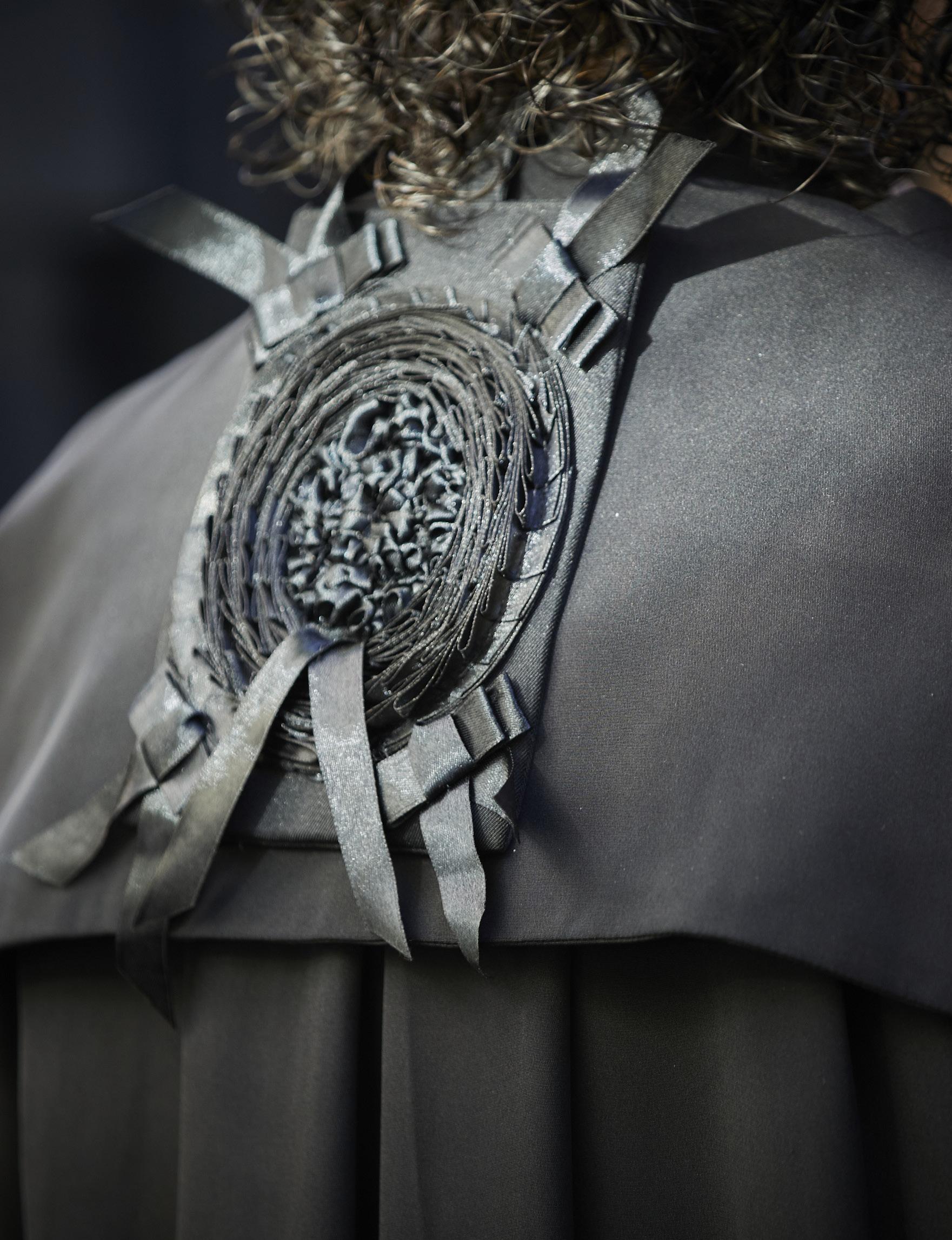
Barristers’ Benevolent Foundation of Victoria Annual Report for the year ended 30 June 2024 (Unaudited)
The Directors of the company are the Bar Council President, the Honorary Treasurer and one Vice President of the Bar Council. The closing balance of the BBA Capital Fund as at 30 June 2024 was $3.284M, this is an increase in funds of $0.158M over the previous year ($3.126M). The closing balance includes interest free loans made to members.
During 2023-2024, the Foundation made payments by way of grants and loans to members and immediate family totalling $48,000.
Donations received for the 2023-2024 year were $46,000. In addition, the Foundation/Association received loan repayments totalling $6,600 during the year.
The market value of the Association’s investment portfolio as at 30 June 2024 as provided by Equity Trustees.
The Portfolio provided the following return since inception for the year ended 30 June 2024.
3 MONTHS 1 YEAR
1 Inception date for performance purposes is 23 September 2022.
2 Income return and Total net return includes estimated franking credits and are net of fees.
3 Total return benchmark is composed of 40% S&P/ASX 200 Accumulation Index, 15% MSCI World Net Total Return unhedged Index (AUD), 5% S&P/ASX 300 Property Trust Accumulation Index, 10% Bloomberg AusBond Composite 0+ Year Index, 20% RBA Cash Rate, 5% Bloomberg AusBond Bank Bill index and 5% S&P Global Infrastructure Index.
4 CPI is on a one period lag.
Past performances should not be taken as an indicator of future performance.
BARRISTERS’ BENEVOLENT FOUNDATION OF VICTORIA
Comparative Financial Statement for the Period 30 June 2024 30-Jun-24
The Portfolio produced a solid total net return of 9.7% in FY24. Since inception (23 September 2022) the Portfolio has increased by 9.5% per annum outperforming the CPI +2.5% investment objective.
The Portfolio slightly underperformed the Total Benchmark Return in FY24 due to its underperformance in Australian equities and the defensive tactical positioning of the Portfolio relative to the benchmark weights.
In Australian equities, BBFV has invested in the EQT Charitable Screen Equities Common Fund 102 which employs a defensive approach that is positioned to outperform the index in down markets but may at times underperform in up-markets. Despite this approach, Common Fund 102 has produced solid absolute returns and has a strong medium and long term track record when compared to the market.
The Comparative Financial Statement for the year ended 30 June 2024 has been prepared using historical costs for recording transaction and comparative asset values.
From time to time, capital movements occur between or within the funds managed by Equity Trustees which will be (if any) reflected in an adjustment to the closing fund balance.

Georgina Schoff KC and Sarah Keating. Directors
